Fall 2024 Schedule
December 4th
Transforming Lives: Yoga, Justice, and the Ethics of Incarceration, ft. Nicole Hellthaler, MPS, RYT, Executive Director of Prison Yoga Project
Abstract
Join Nicole as she discusses the mission of Prison Yoga Project: transforming lives of incarcerated individuals through yoga and mindfulness. She will delve into the cultural shift toward restorative justice over punishment and address the complex realities of working within -and beyond- systems of incarceration.
Zoom Recording: https://youtu.be/wMB0TnERxfI
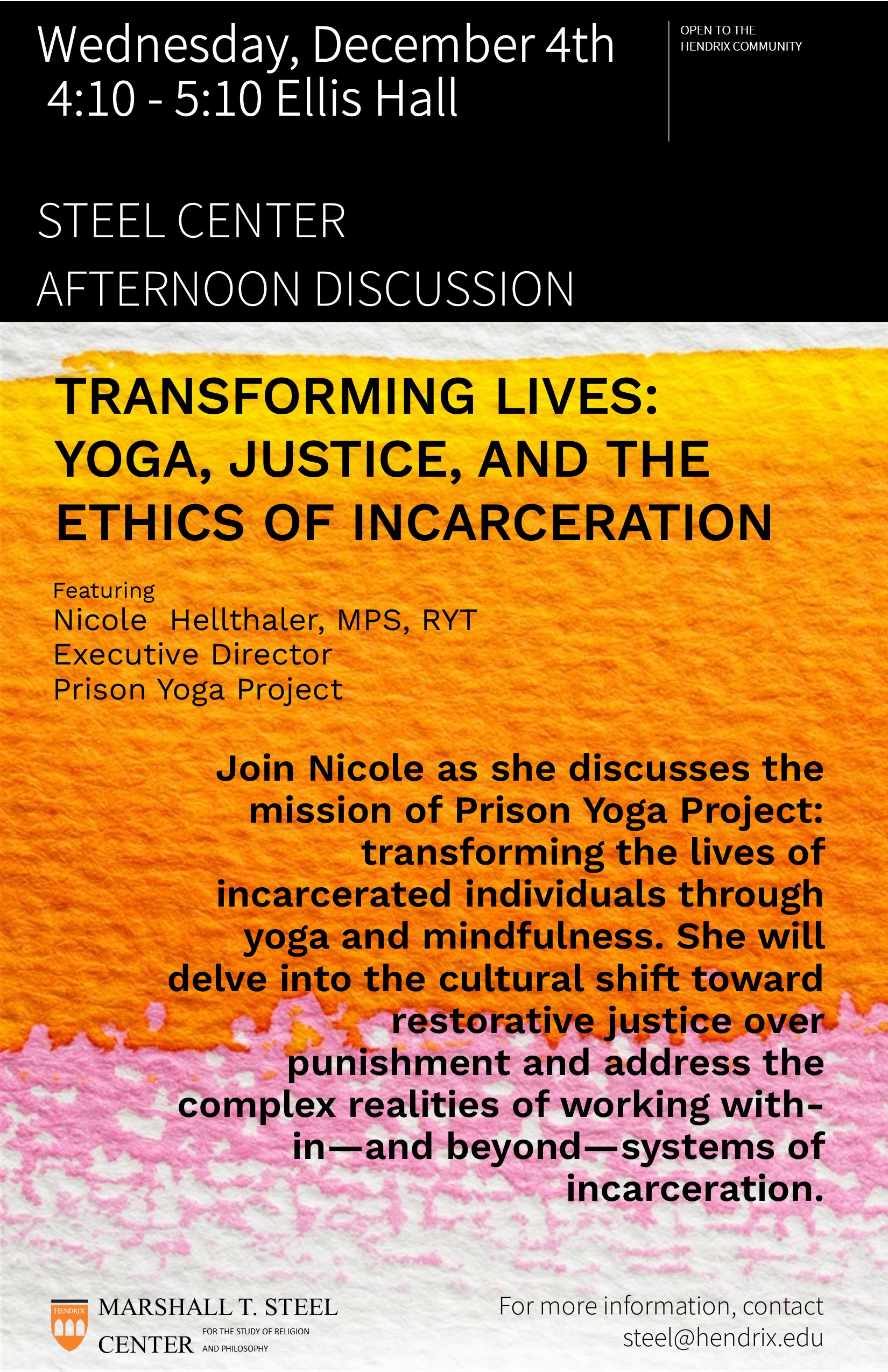
November 20th
Indigenous Perspectivism and Anthropocene Religion, ft. Michael Norton, Professor of Philosophy & Interdisciplinary Studies at the University of Arkansas at Little Rock
Abstract
Despite what its name might suggest, the "Anthropocene" epoch is a time when humans have been radically decentered in our view of the world around us as we are forced to face one environmental crisis after another. Dr. Michael Norton argues that looming climate catastrophe reveals traditional Western concepts of religion to be untenable and that building a new understanding of religion is a necessary part of facing this catastrophe. In this talk, he will discuss how Eduardo Viveiros de Castro's account of Indigenous American ontology can inform an ecological approach to religion.
Zoom Recording: https://youtu.be/S6e9jeym_vk
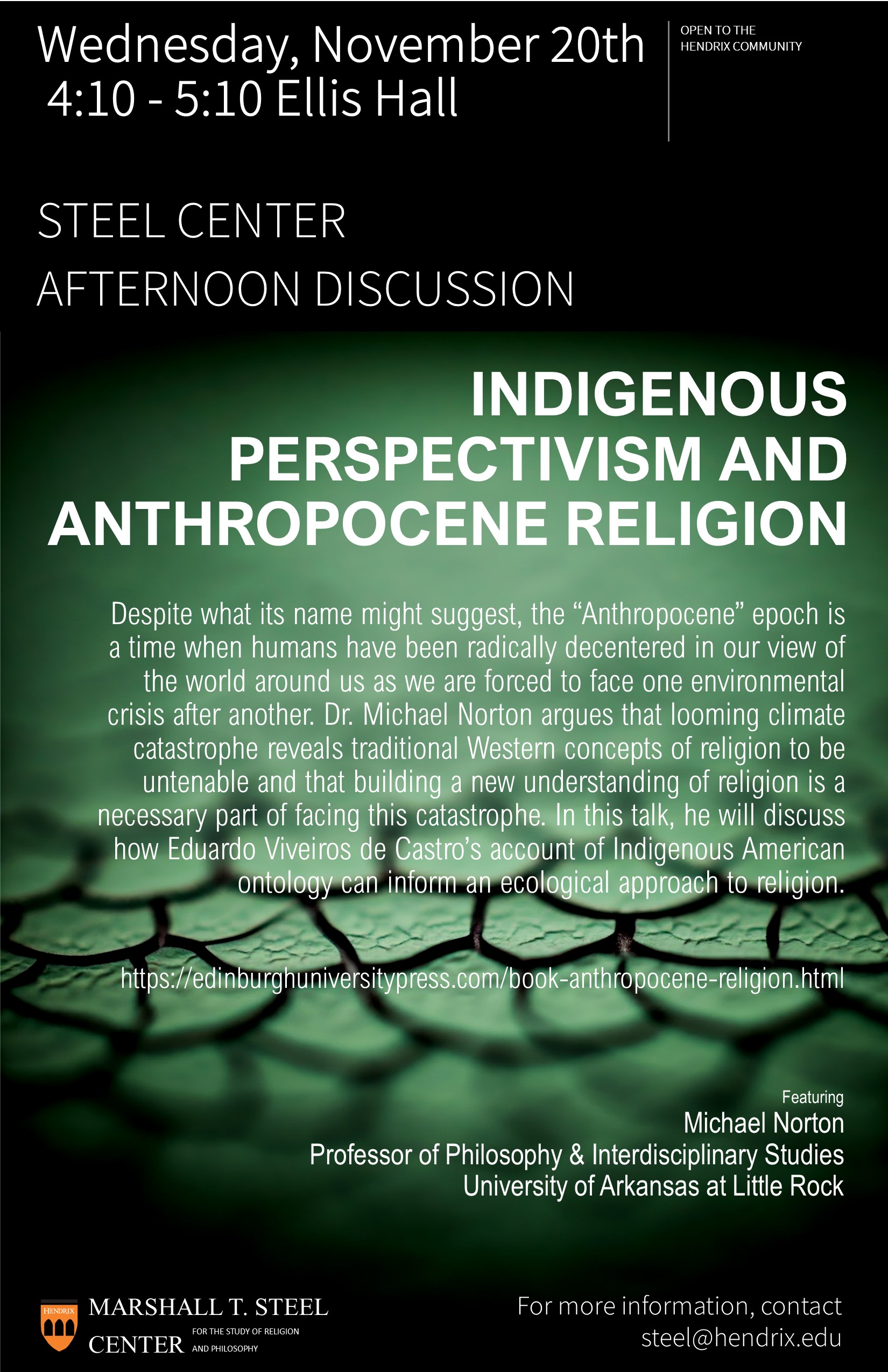
November 13th
What Can A.I. Do? ft. Jamie Dow, Hendrix Professor of Philosophy and Steel Center Director
Abstract
In conversations about the possibility of artificial intelligence, philosophers tend to ask whether computers and robots possess consciousness, cognition, or intellect. However, such a view of intelligence is grounded in an enlightenment conception of rationality. If we ask What Can A.I. Do? and focus on agency as grounded in the body and bodily movements that are vulnerable, then does this change the questions about the possibility of artificial intelligence.
No Zoom Recording
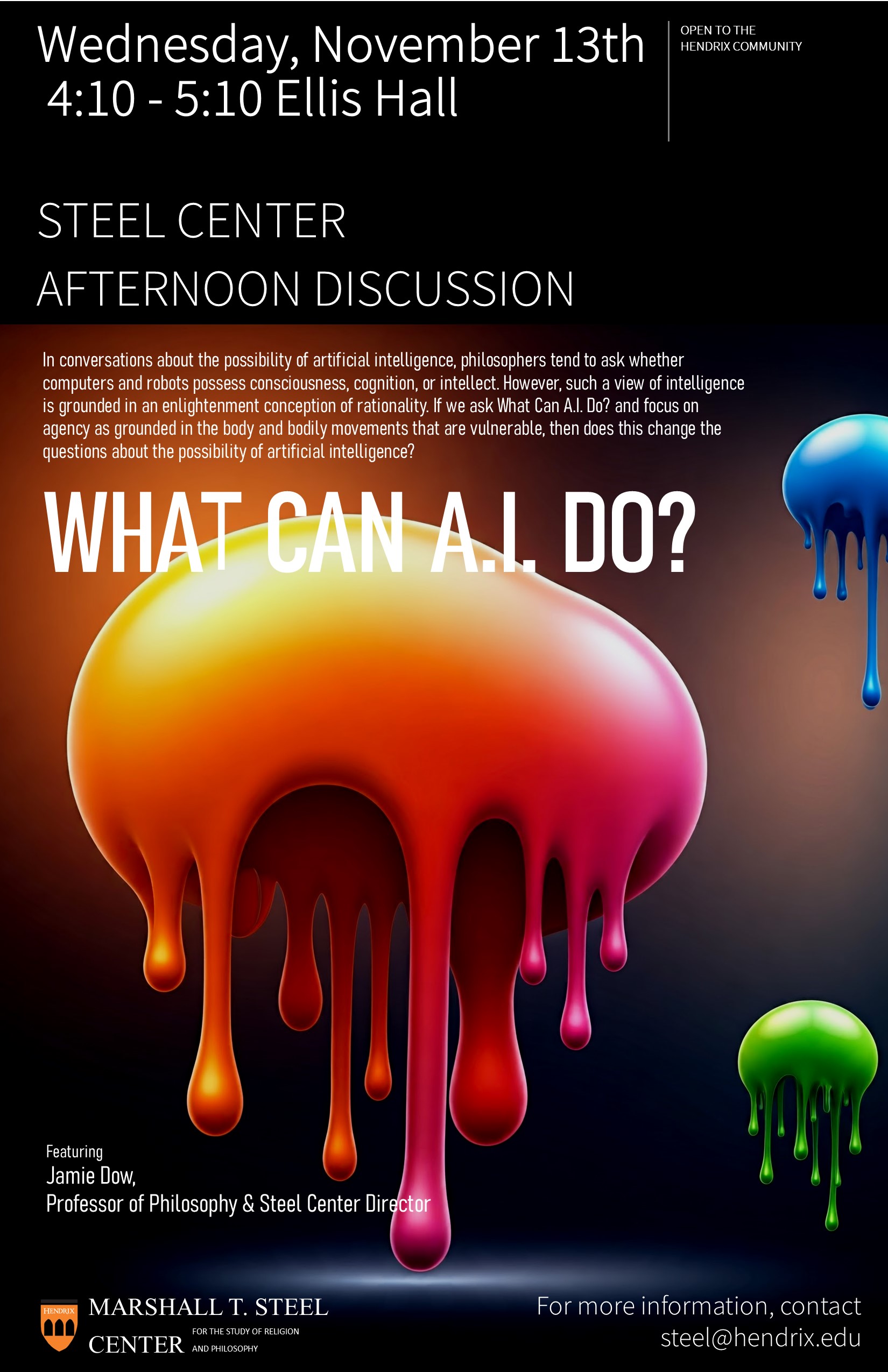
November 6th
Imagination as a Political Act: Solarpunk Visions of Hendrix College, ft. Owen Edgington, HDX '25
Abstract
How can imagination serve us as a catalyst for reimagining education and enacting social change? In this discussion, we'll delve into the solarpunk ethos- envisioning regenerative, just futures- and explore its applications for transforming our educational landscape. What would Hendrix look like as a space where learning is student-led, ecologically integrated, and collaborative? How might such a vision challenge traditional hierarchies and foster active engagement with community and environment? Join us as we consider the role of imagination in reshaping our collective educational futures.
Zoom Recording: https://youtu.be/ab_mFdl5EAg
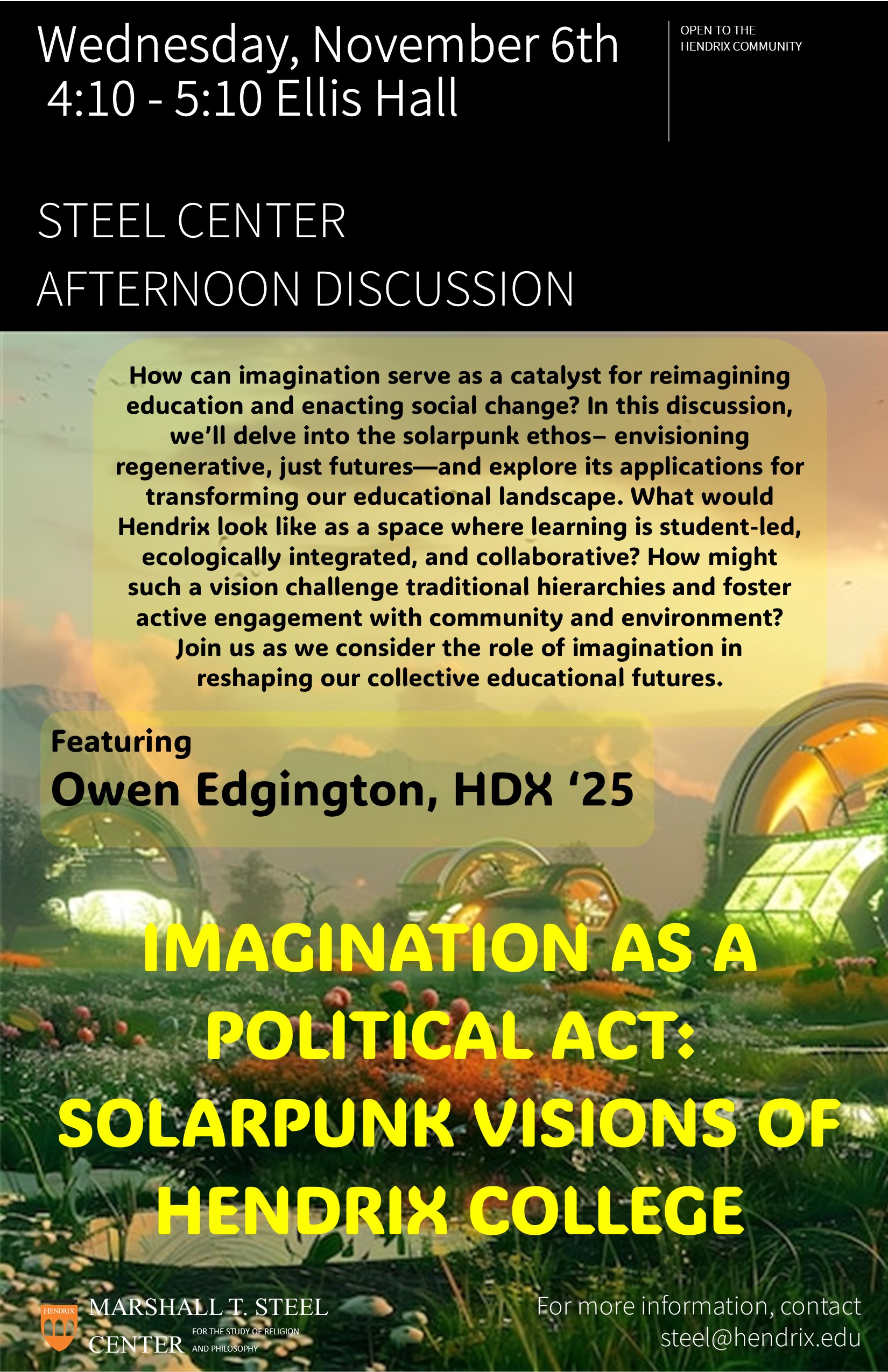
October 30th
Horror as Healing, ft. Dr. Celeste Reeb, Assistant Professor of English & Film Studies
Abstract
If horror is meant to scare us, poke, and prod at our deepest fears, and haunts us well beyond our reading or viewing experience, can it be healing? How can a mode of storytelling built on distress open us up to feelings of belonging, empowerment, and validation. In this talk, Dr. Celeste Reeb discusses the important role horror plays in personal and community spaces. Horror as an affective genre makes it possible to confront the messiness of the human condition and process intense emotions.
Zoom Recording: https://youtu.be/Y9prD74iuRM
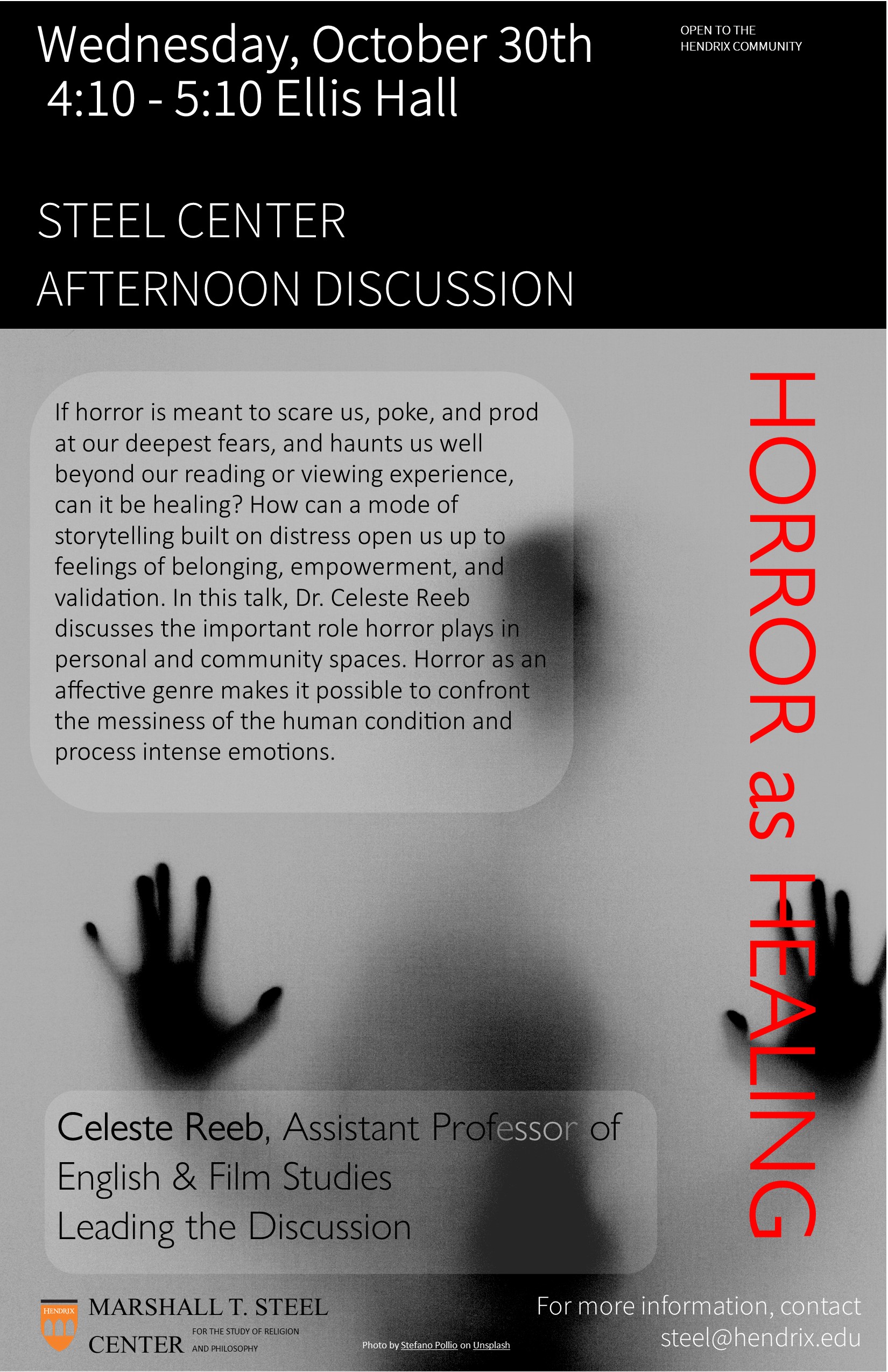
October 23rd
The Sodality of Harmless Drudges: A Throwback Style Discussion, ft. Steel Center Ambassadors
Abstract
In the early days of the Steel Center, faculty and students would gather in the Raney Building common area each Friday afternoon. They would open the dictionary, choose a random word, and have meaningful conversations based on their random choice. They deemed these discussion hours, "The Sodality of Harmless Drudges". Over the years, this informal gathering transitioned into what is now our weekly Wednesday Afternoon Discussions, with carefully chosen topics and a slightly more formal approach. Steel Center discussions have been taking place on Hendrix campus for more than forty years. Join us Wednesday for a throwback discussion hour led by Steel Center Ambassadors to revisit our roots and come together for a retro discussion format that promises to be a little quirky and a lot of fun.
Zoom Recording: https://youtu.be/pBfiZcdyh9Q
.jpg)
October 9th
African Cultural Products and the Manifestation of Power, ft. David Kamanga (HDX '27), Steel Center Ambassador
Abstract
This discussion is a reflection of British colonialism's impact on how African Cultural Products represented and expressed power and other abstract concepts through culturally significant visual mediums.
Zoom Recording: https://youtu.be/eQNg1hkqkLA
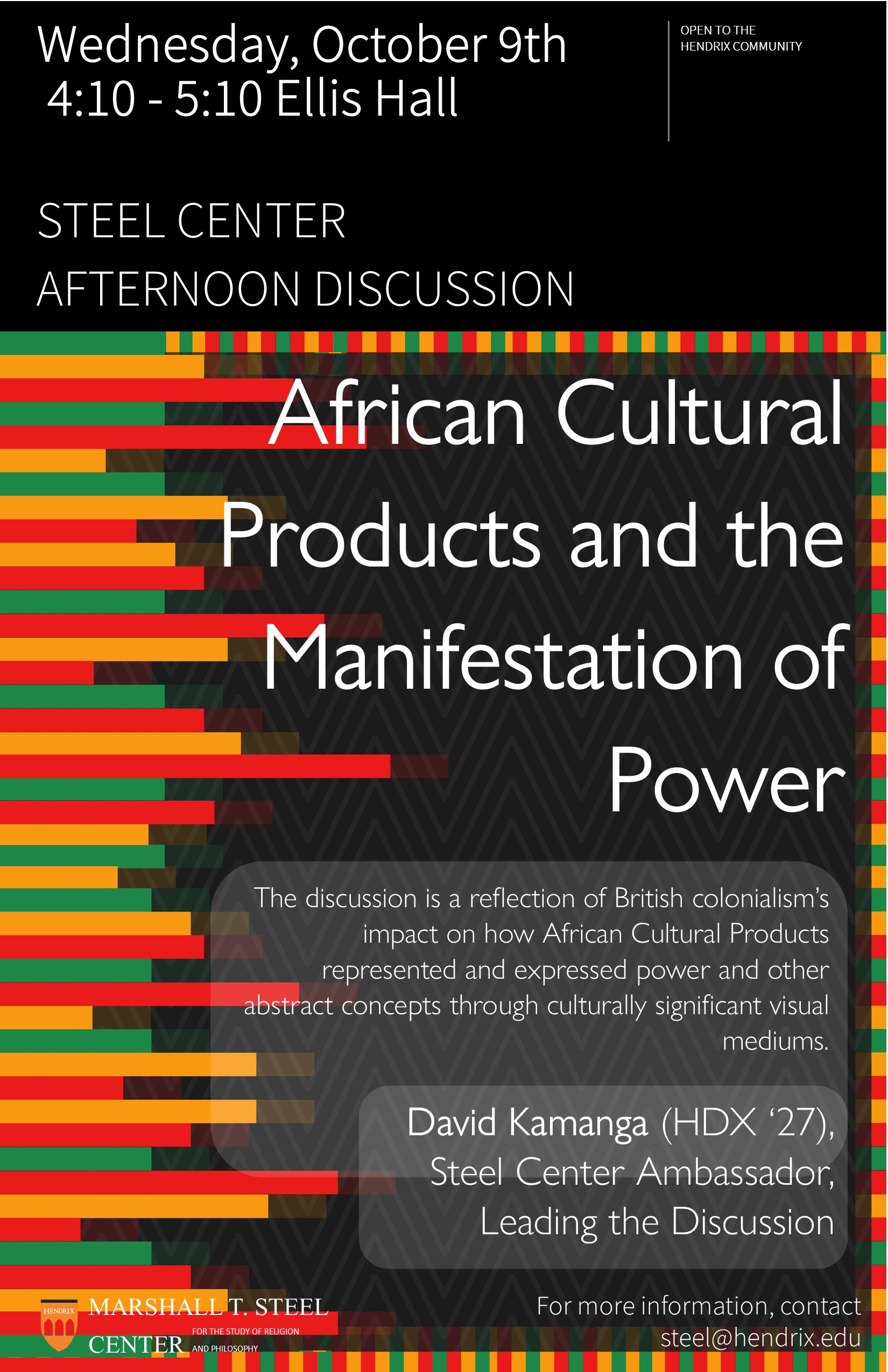
October 2nd
Bridges Across Harkrider: How to Disintegrate the Student-Athlete, ft. Dr. Chris Campolo, Professor of Philosophy
Zoom Recording: https://youtu.be/P7g_t8lf1uY
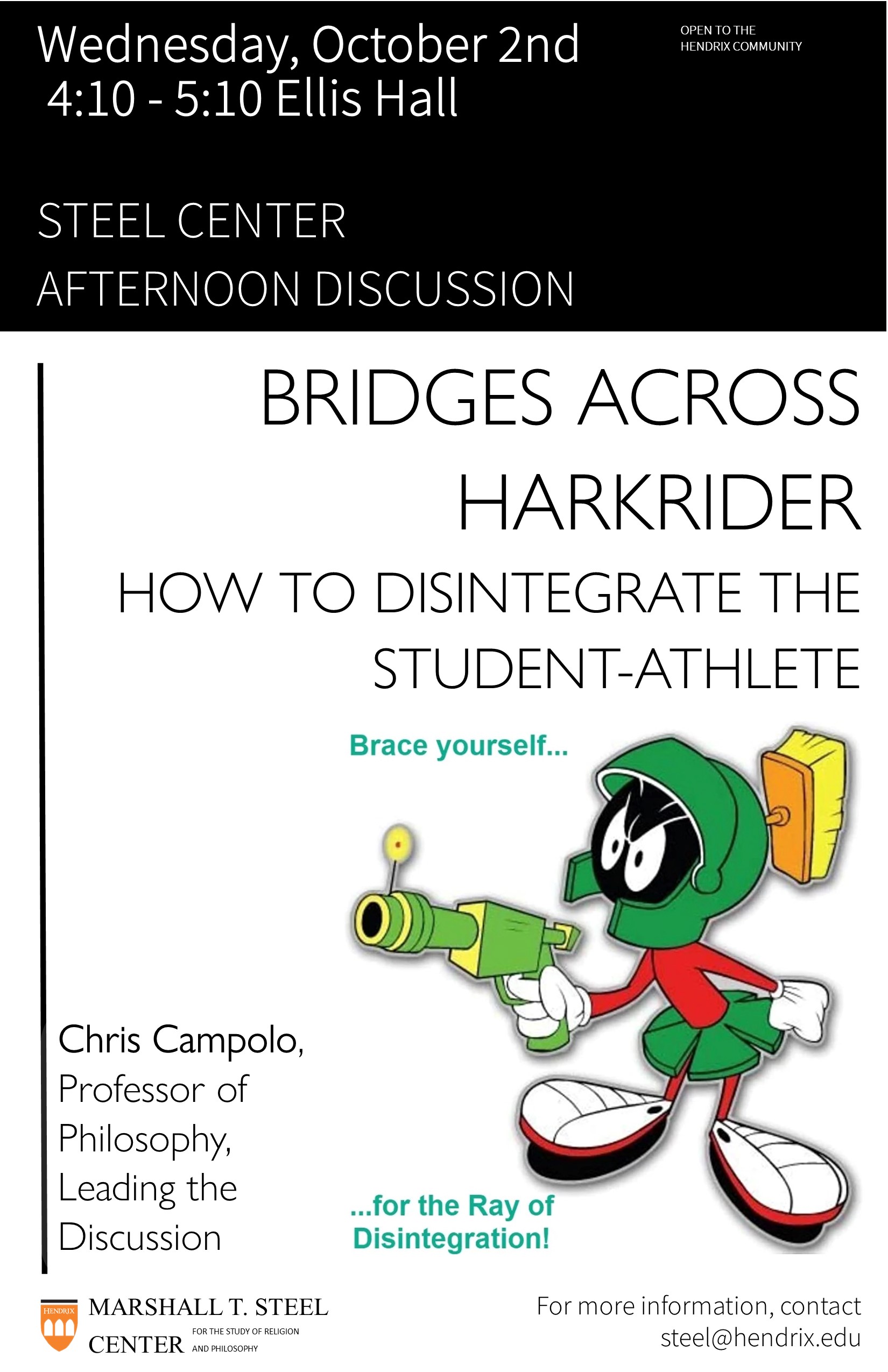
FRIDAY, September 27th
“Matter” Ellis Hall Exhibit Opening and Discussion
Abstract
Join us for the opening of “Matter,” an art exhibit that explores the concept of material culture in our daily lives. The event will take place Friday, September 27th from 4 to 5 pm. Material culture illustrates the connection between humans and the environment through the objects we find meaningful. Student curator Sydney Austen will lead a discussion of the works and introduce participants. This event is open to the Hendrix community and the public. Families welcome! For more information, click here.
Zoom Recording: https://youtu.be/TtsRszo-NRs
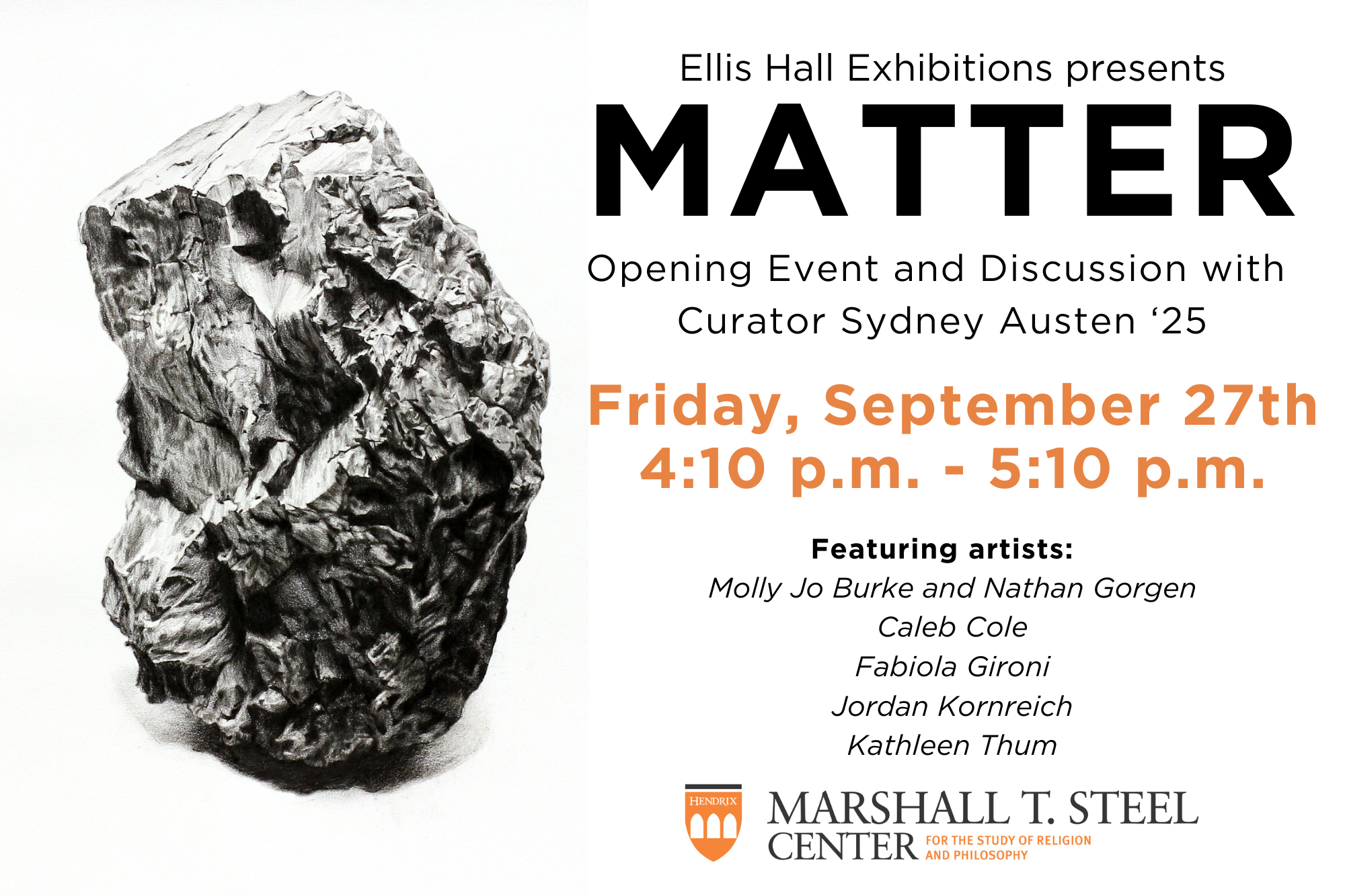
September 18th
Bridges Across Harkrider: What is the problem of the athlete-non-athlete divide at Hendrix?
Abstract
Join a student-driven, informal, open discussion.
Zoom Recording: https://youtu.be/TtsRszo-NRs
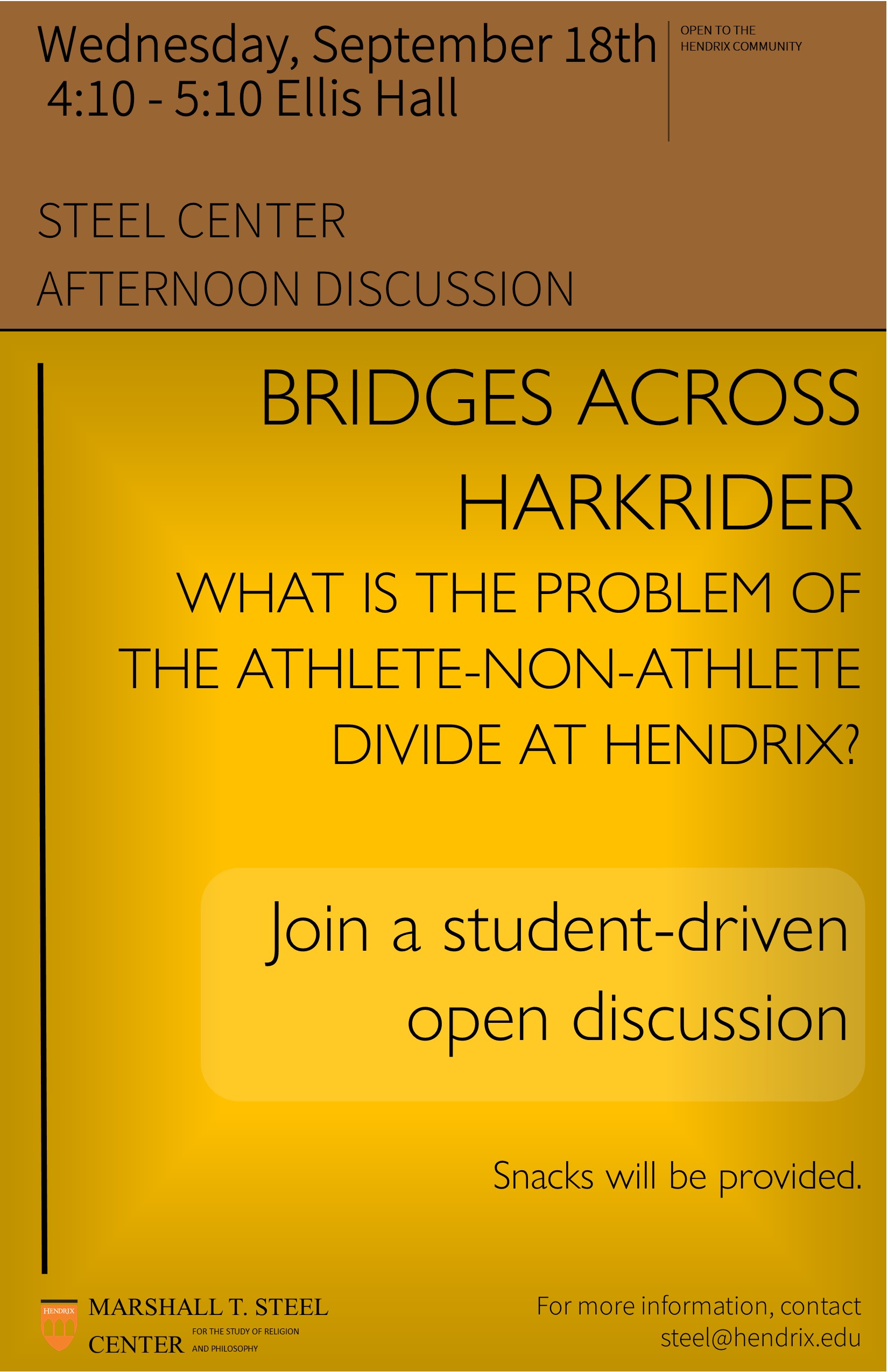
September 11th
Bridges Across Harkrider: How Microeconomics Can Be Observed in the Professional Sports Labor Market ft. Dr. William Haden Chomphosy, Hendrix Associate Professor of Economics & Business
Abstract
This talk establishes theoretical market principles associating worker productivity and worker compensation. Using this theoretical foundation, we will discuss how the real-world labor market in professional sports can both validate and contradict those theoretical arguments.
Zoom Recording: https://youtu.be/n8yMq2WeOOQ
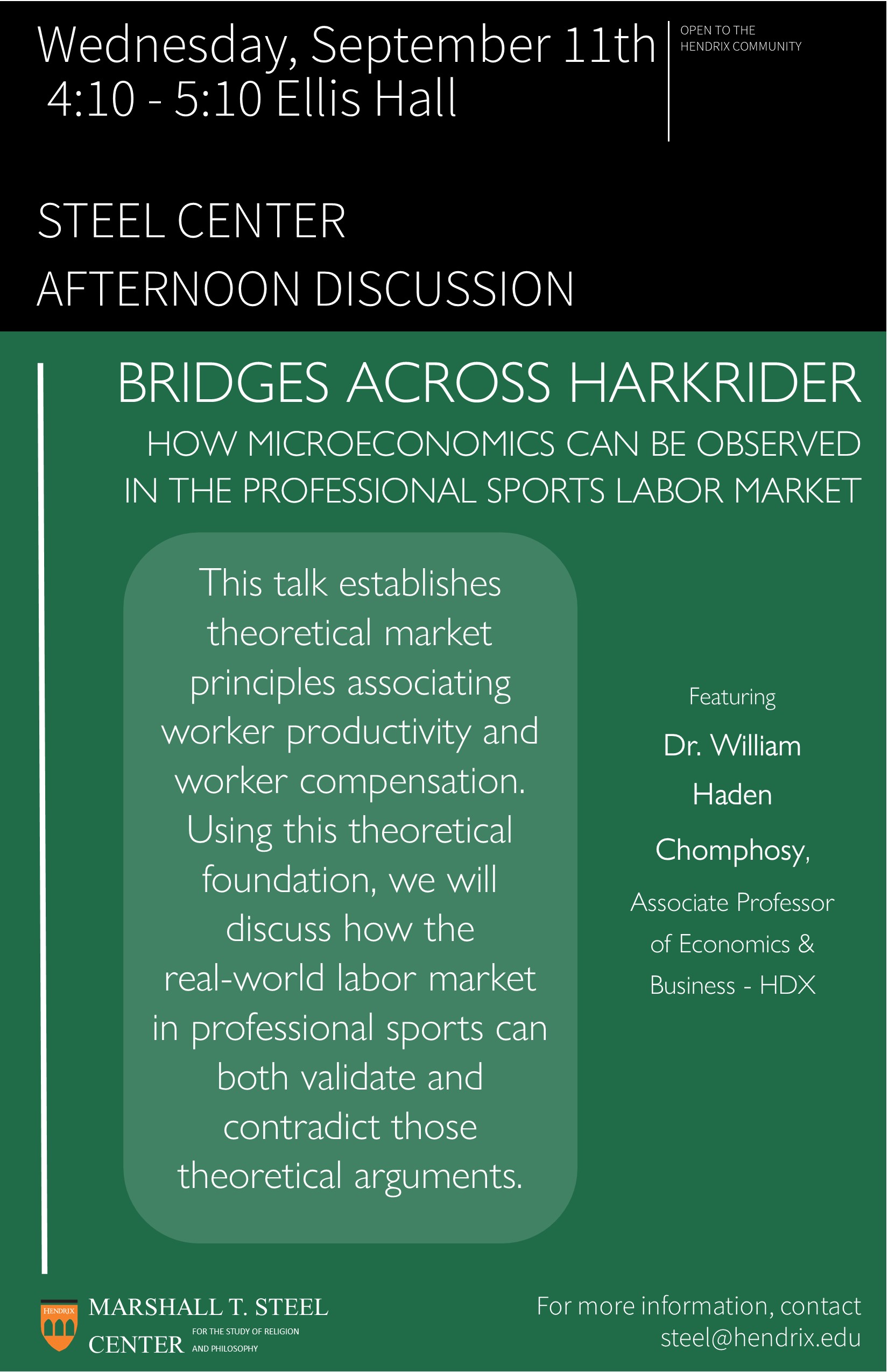
September 4th
Building Team Hendrix ft. Dr. Deb Skok, Hendrix Professor of US History
Abstract
In this discussion, Dr. Skok will introduce the "Bridges Across Harkrider" series, provide brief historical context for understanding the evolution of modern sports, and lead an audience-centered discussion and brainstorming session at Ellis Hall for how we can enhance social interaction between the East and West sides of Hendrix Campus.
Zoom Recording: https://youtu.be/eNyENhPFkOI
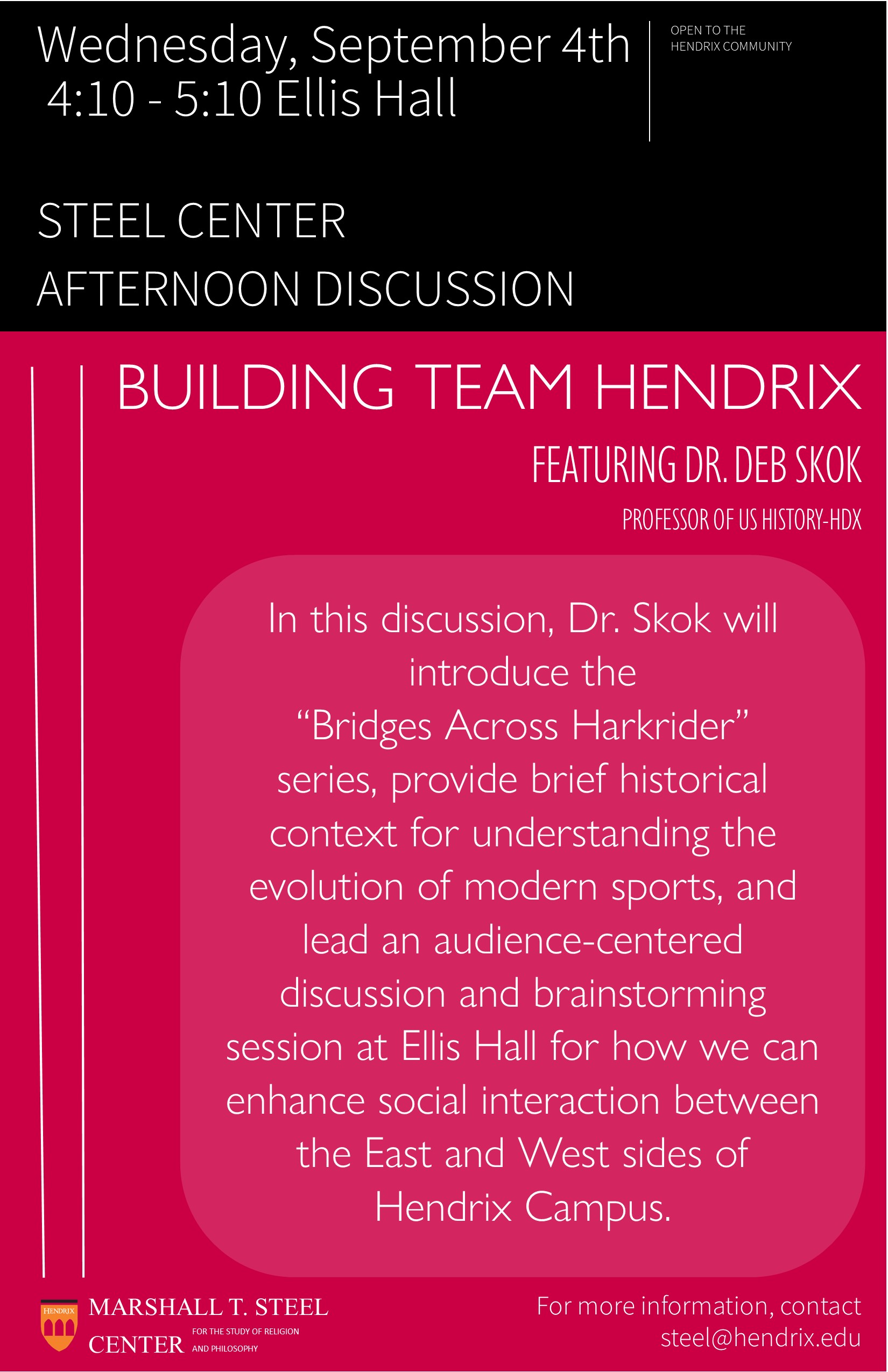
Spring 2024 Schedule
April 24th
False Equivalencies and Political Arguments ft. Nathan Duford
Abstract
False equivalencies are involved in some of the most classic political thought, e.g. conceptions of justice, in The Republic. They permeate nearly every aspect of political argument today. We will ask, how can or should we respond to them? - Dr.Duford
.jpg)
April 16th
"What Is Islam?" ft. Imam Mohammad Nawaz
Abstract
Join us for a discussion with Imam Mohammad Nawaz, currently a full-time Imam and teacher at the Madina Institute Center for Nonviolence & Peace in Little Rock, Arkansas, for a discussion about Islam. In the context of rampant Islamophobia that has flourished during the conflict, education and awareness are our greatest tools. What is Islam? What does that mean? Knowing the answers to these questions can help us combat misinformation, stereotypes, and biases.
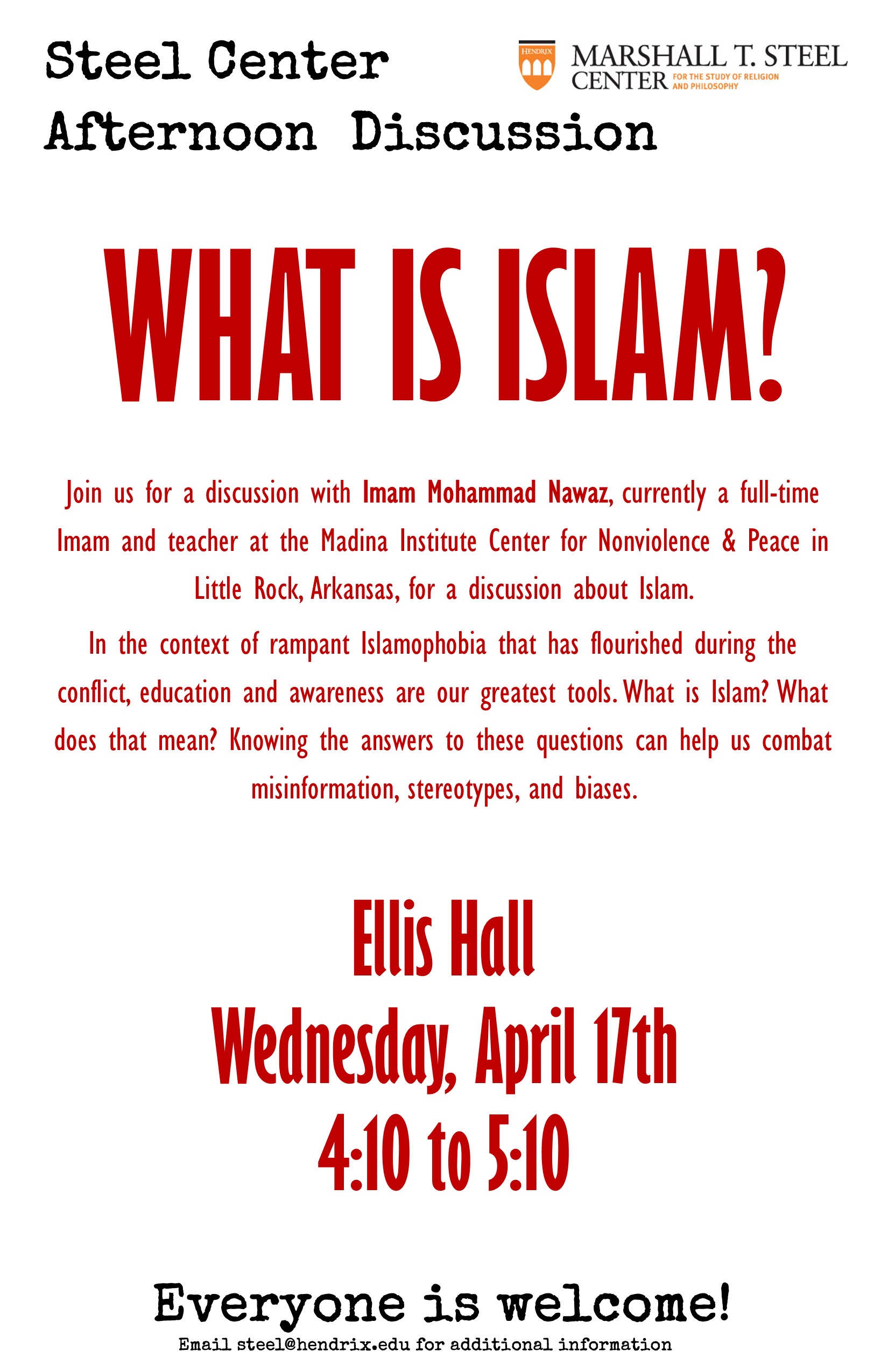
April 10th
Is a democratic foreign policy possible? ft. Dr. Thomas Briggs, PHD
Abstract
Is foreign policy the realm of elites and experts? To what extent should it be and why? Can foreign policy decision-makers, and their advisors, be held democratically accountable? Can their actions be influenced and informed by public opinion and debate? If so, how would this affect a state’s foreign policy? What would be the wider impact on the international order and world peace? These are “big questions” of international relations, however in this talk I will introduce them through the specific lens of the history of the Foreign Policy Association (FPA), an American think-tank founded in the aftermath of World War I to generate public support for the US joining the League of Nations. I shall provide an overview of the rise-and-fall of the FPA (Allen 2023) and discuss my own research into the fascinating life and career of Vera Micheles Dean, the FPA’s Director of Research from 1936-1962, and her vision of building a democratic foreign policy. Using the FPA as an illustrative mid-twentieth century historical case study, I aim to open-up discussion about the ongoing potential and desirability of a democratic foreign policy. Would foreign policy be different (better?) if it was more democratic? What are the new twenty-first century challenges and opportunities to consider? Moreover, is ‘global citizenship’ possible in a world of nation-states or does democracy stop at a state’s borders?
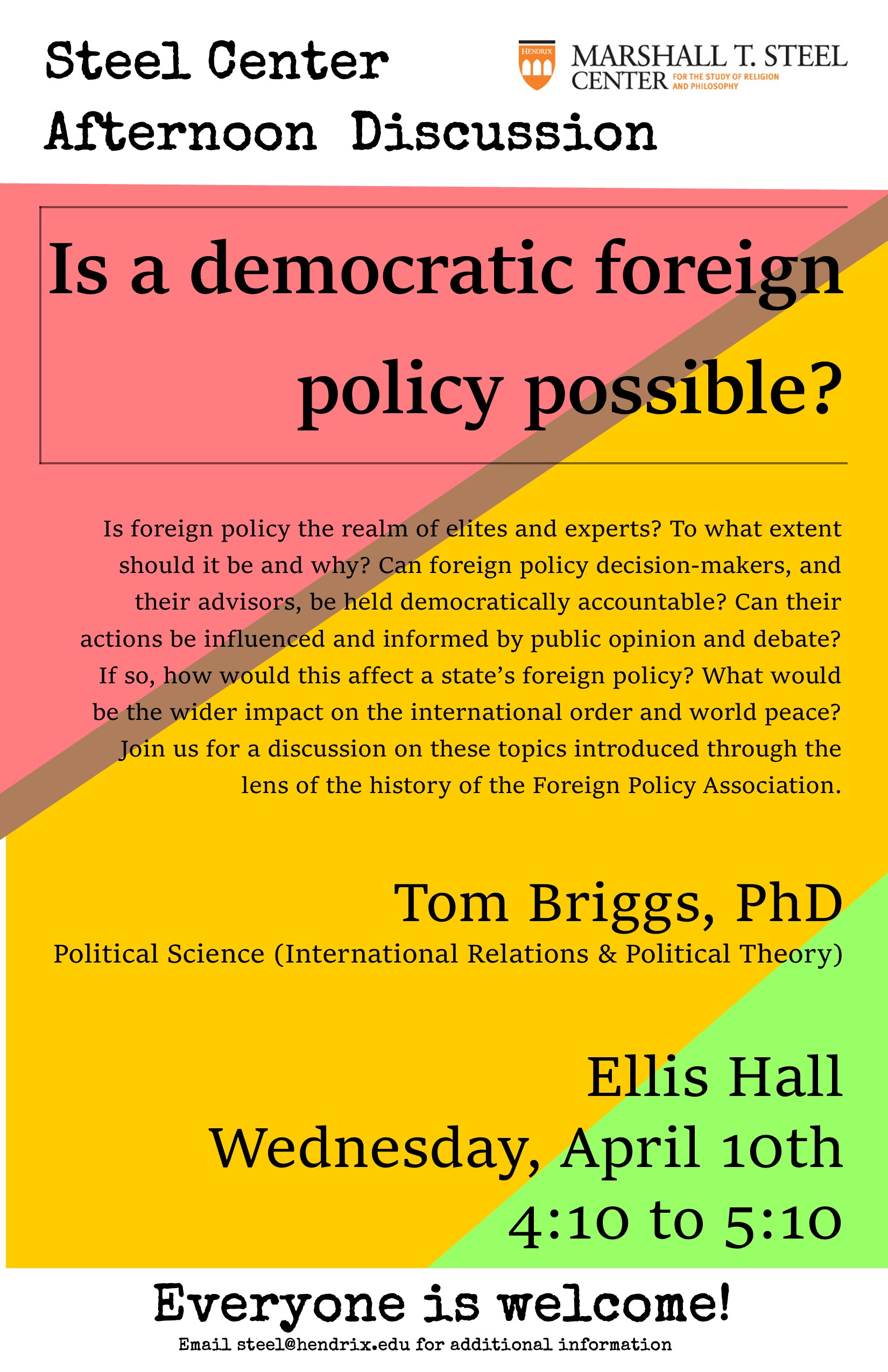
April 3rd
Defining the Liberal Arts: Content, Context, and Purpose
Abstract
"As we prepare for the next 150 years at Hendrix, how do we develop a shared understanding of our future as the premier residential liberal arts college in Arkansas? How does our definition of the liberal arts shape that understanding?" - Dr. Karen Petersen, President of Hendrix College
.jpg)
March 27th
Post-Metal Heaviness
Abstract
What makes heavy metal heavy? It has been argued (Miller 2022) that the concept of ‘heaviness’ is inarticulable, irreducible, and impossible to define. In this paper, I will argue for an account of the aesthetics of heaviness that is more optimistic. First, I will take as my focus the instrumental post-metal music of bands such as Red Sparowes, Russian Circles, Pelican, and Caspian and will argue that focusing on the progressive variations of the timbral style of bands like these helps us to clarify the phenomena of heaviness. Second, I will argue that we can make progress in developing an account of the aesthetics of heaviness even if we cannot provide necessary and sufficient conditions for the application of the concept of heaviness. Instead, we can conceive of timbral concepts as proxytypes of deformations of the sources of the sound. Third, I will argue that not enough consideration has been given in the aesthetics of heaviness to the following: loudness of amps in live performances; differences between overdrive, distortion, and fuzz guitar timbres; downtuning and low-end resonance of guitars; power and constancy in kick drum pattern; and low end equalizing of kick drum, floor toms, and bass layers. In closing, I suggest ways that an aesthetics of heaviness can be further developed for both sensibility theorists like Sibley (1959) and category theorists like Walton (1970), thereby providing a more optimistic path for the aesthetics of heaviness.
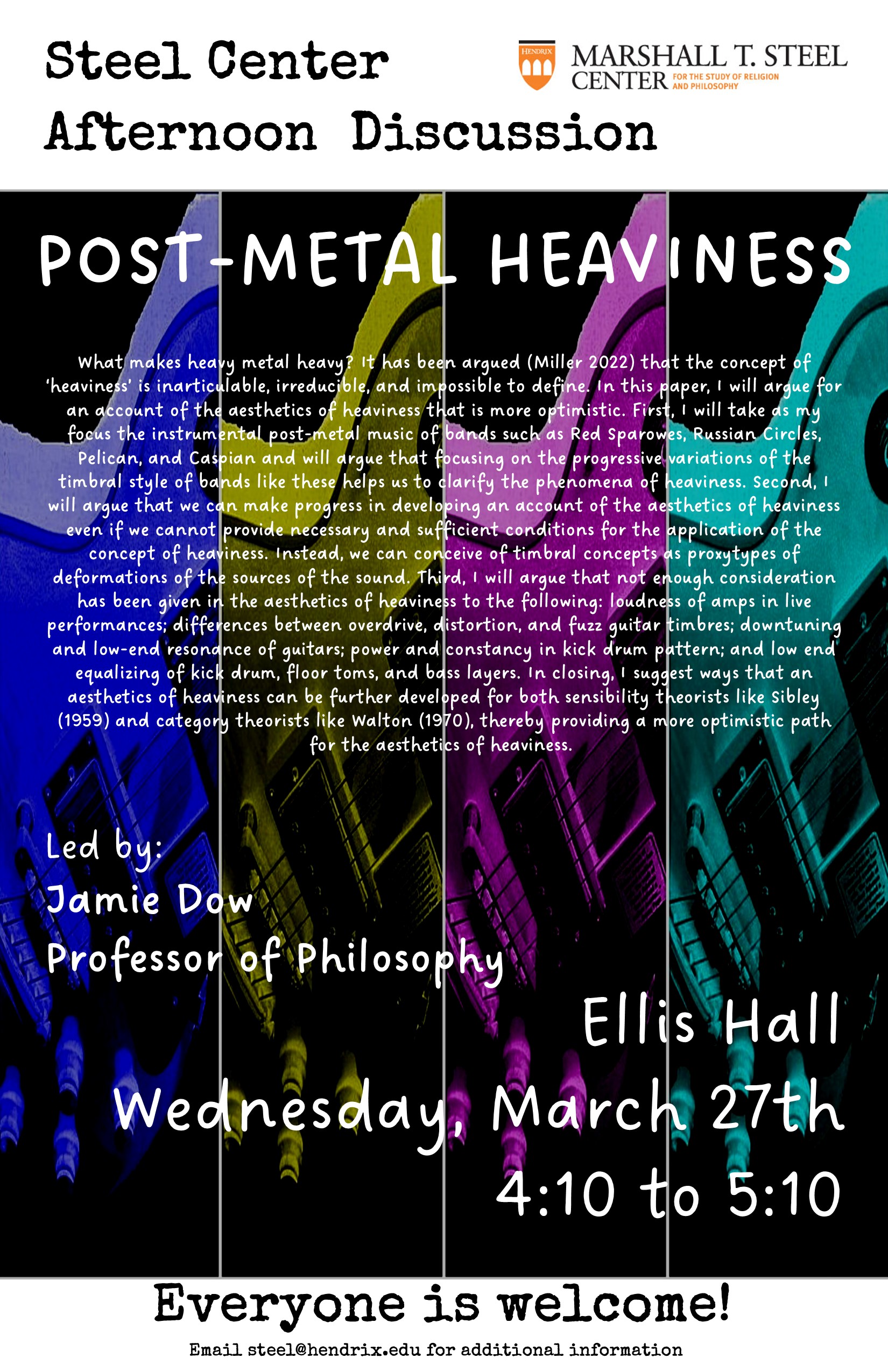
March 13th
Introducing Philosophy & Religious Studies in the American Public High School featuring Tony Shepherd from Parkview Arts/Science Magnet High School (Little Rock, AR)
Abstract
As an AP English Language and Composition, AP English Literature and Composition, and Bible as Literature teacher in a public American high school, assisting the move from basically myopic discussions to universally complex ones is taxing but rewarding. As we progress from August to May, we move incrementally through in AP program with additions along the way. Philosophical and religious discussions are typically our focus along with class, race, gender, and language.
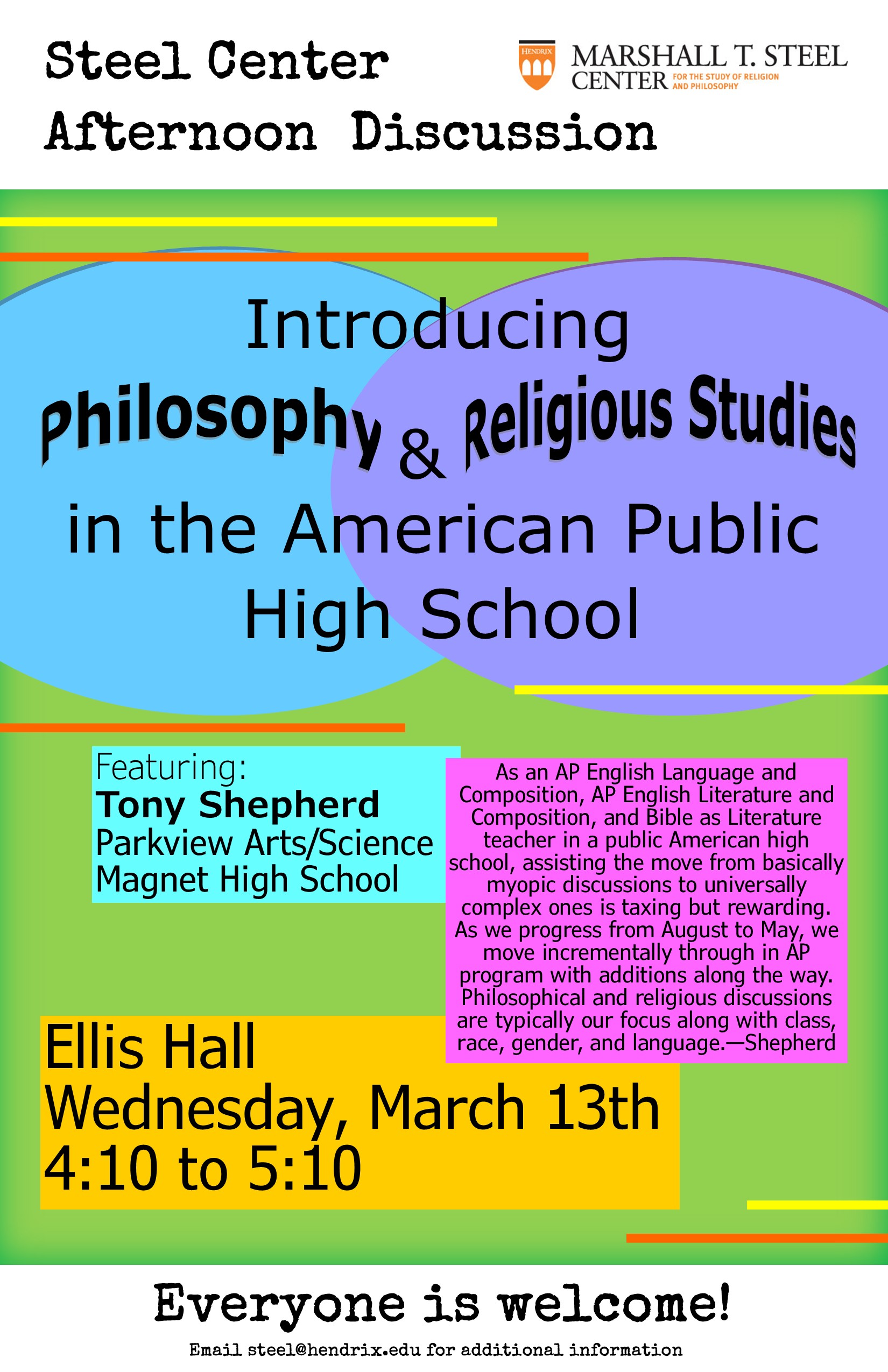
March 6th
Ramadan Discussion, led by Yousef Zonfuly ('24) & Feross Al-Hindi ('24)
Abstract
As the month of Ramadan is approaching, engage in a discussion about this holy month with the Hendrix MSA (Muslim Student Association) and other members of the community. Learn about their experiences, share your own, and ask questions!
.jpg)
February 28th
"Own Your Power", Rustin Afternoon Discussion, led by Religious Studies professor Dr. Justin Barringer.
Abstract
"We all know Dr. King, but did you know there wouldn't be an MLK as we know him today, no March on Washington, no "Dream Speech" if it weren't for his mentor and friend Bayard Rustin. Recently, Barak and Michelle Obama produced a film about Rustin and some of his contributions to the Civil Rights Movement. Join us for a discussion about how Rustin's friendships shaped the Civil Rights Movement and ultimately led to significant Civil Rights legislation, and let us ask how our friendships might likewise change the world." - Dr. Barringer.
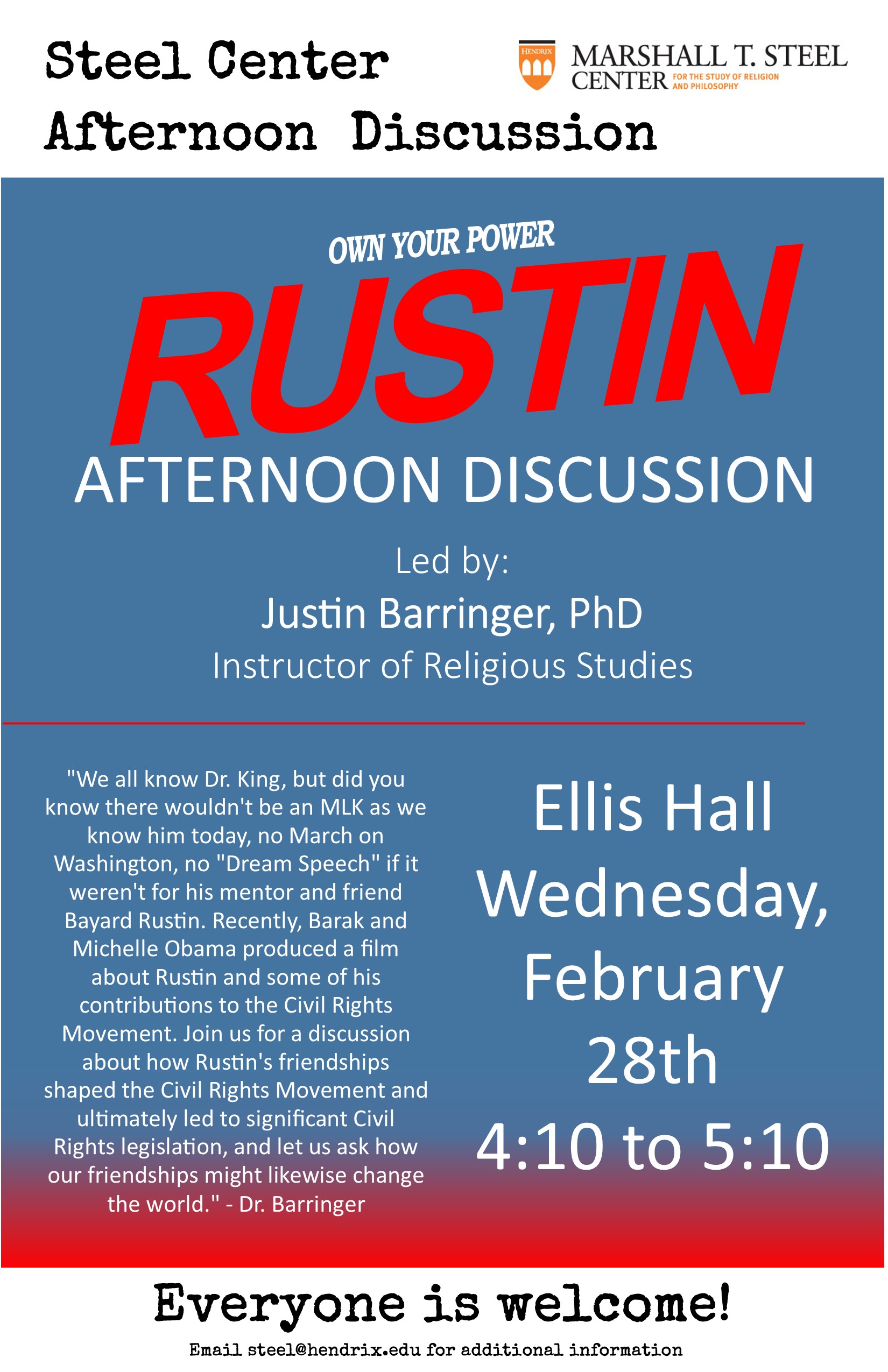
February 14th
What is Love?
Abstract
Join us for an informal discussion about all things Love led by the Steel Center faculty and ambassadors! Everyone is welcome and refreshment will be provided.

February 7th
A Hermeneutic Approach to Plato's Cave, featuring Nathan "Eric" Dickman, Professor of Philosophy at the University of the Ozarks.
Abstract
"I want to show that a close reading of the cave passage reveals it's not about escaping the cave. Instead, it's about returning to the cave and participating in the cave competition with the knowledge that it is the Sun and not the shadows that is the ultimate source of the experience. I use a hermeneutic scaffold of questions concerning what is on the lines of the text, between the lines, behind the lines, and beyond the lines. This scaffold helps us be open to appropriating meanings of the passage in contrast with what I call the "bootstrap and rescue readings" of the cave." - Dr. Nathan "Eric" Dickman
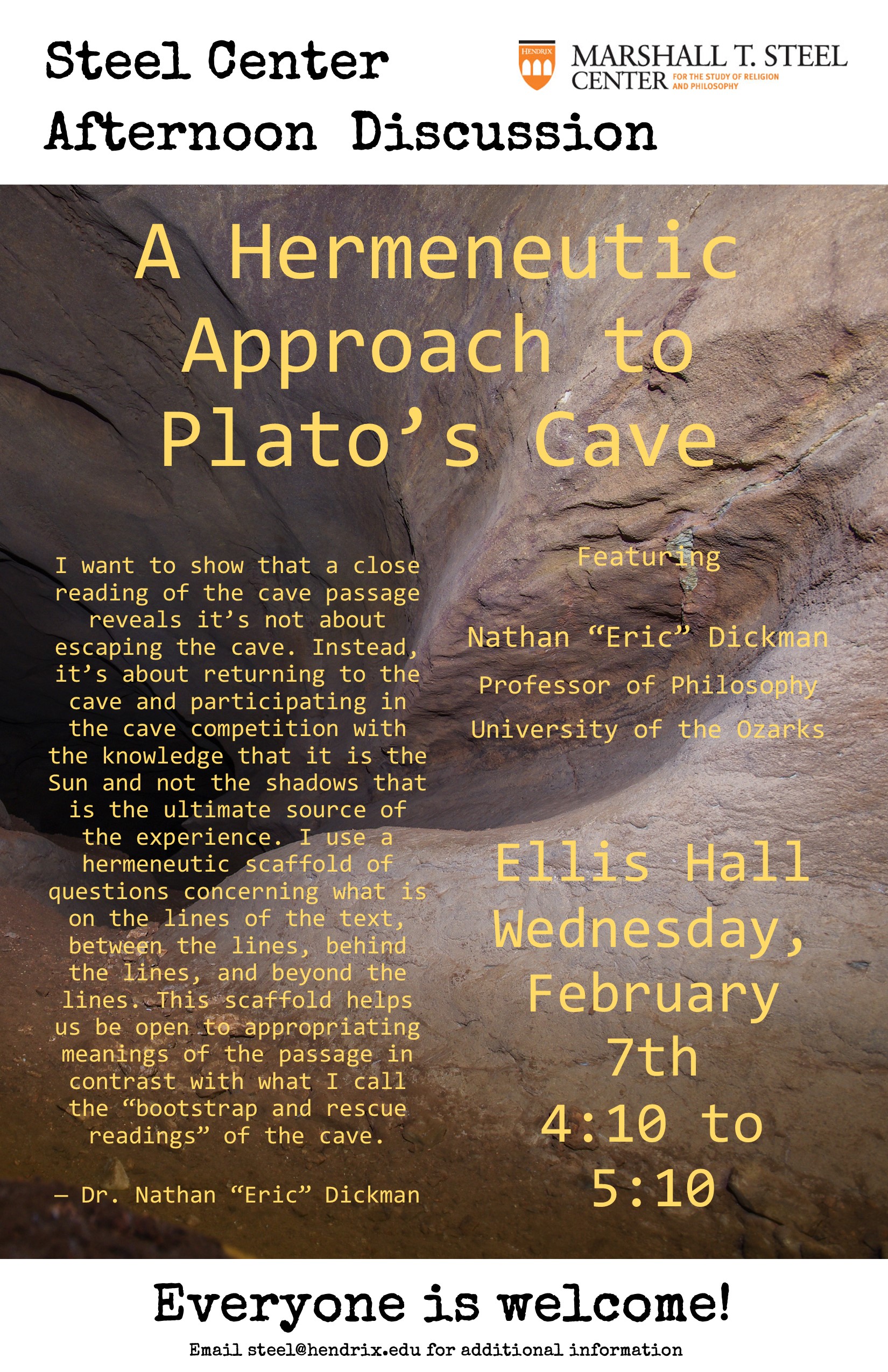
January 31st
Sodality of Harmless Drudges, featuring The Hendrix Philosophical Society
Abstract
Join us for a throwback discussion style that shaped what later became the Steel Center Wednesday Afternoon Discussions. The "Sodality of Harmless Drudges" initiated in 1979, were informal discussions led by Religious Studies and Philosophy Faculty based on grabbing a dictionary and choosing a word. Delighting in the joys of language and discussion they later transformed in to the Wednesday Afternoon Discussions we know today.
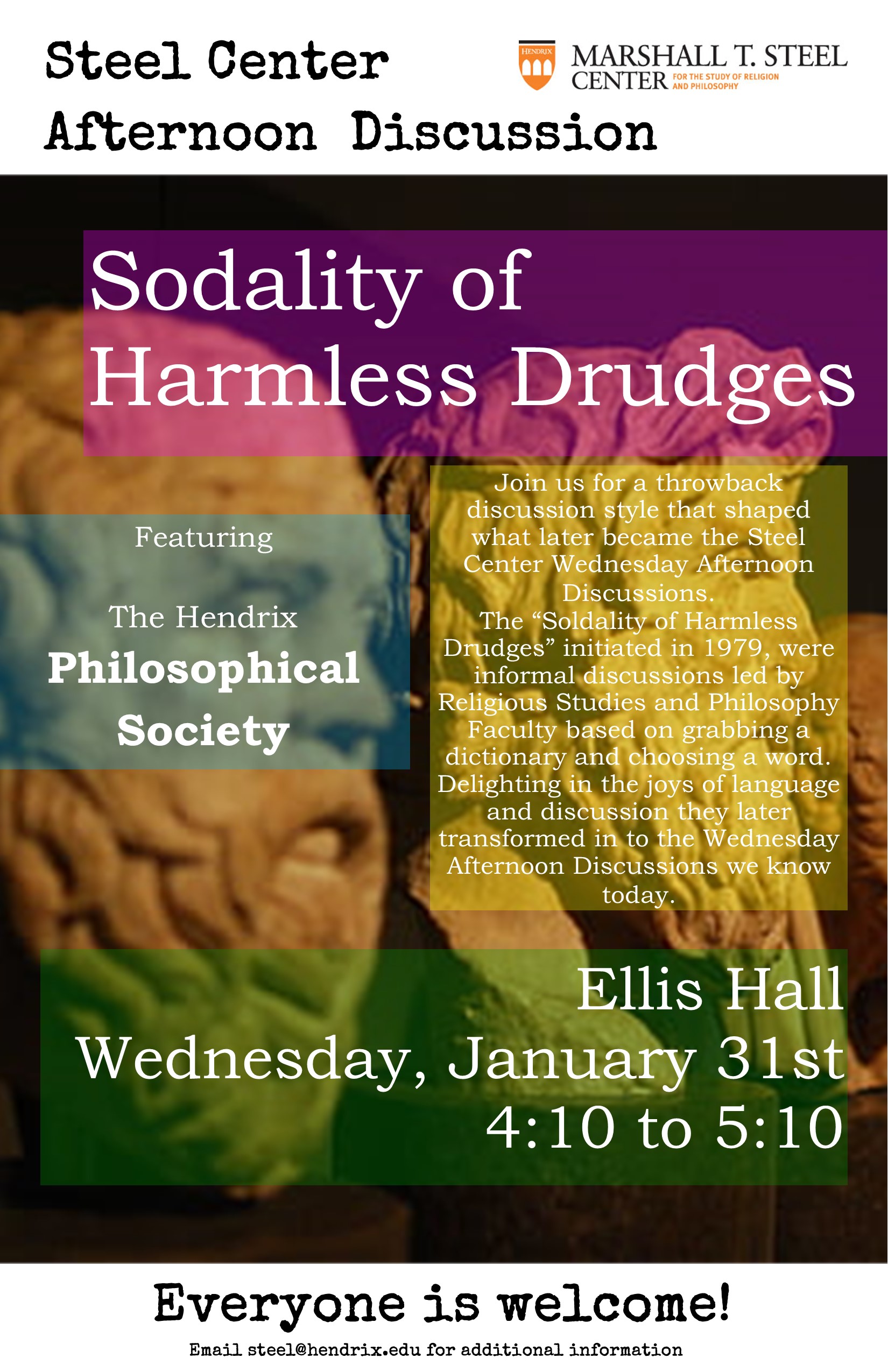
January 24th
Hello Kitty, Kawaii Culture, & Experiences from Japan, featuring Bergen Franklin, HDX '24
Abstract
A discussion on life in Japan as a study abroad student through the lens of Hello Kitty and Kawaii culture.

Fall 2023 Schedule
November 15th
Fake News and the Regulation of Speech on Social Media
Abstract
In the last few years, many have worried about online misinformation. What moral problems does online misinformation raise? Is "critical thinking" education a solution? What are the ethical costs and benefits of regulating "fake news" on social media?
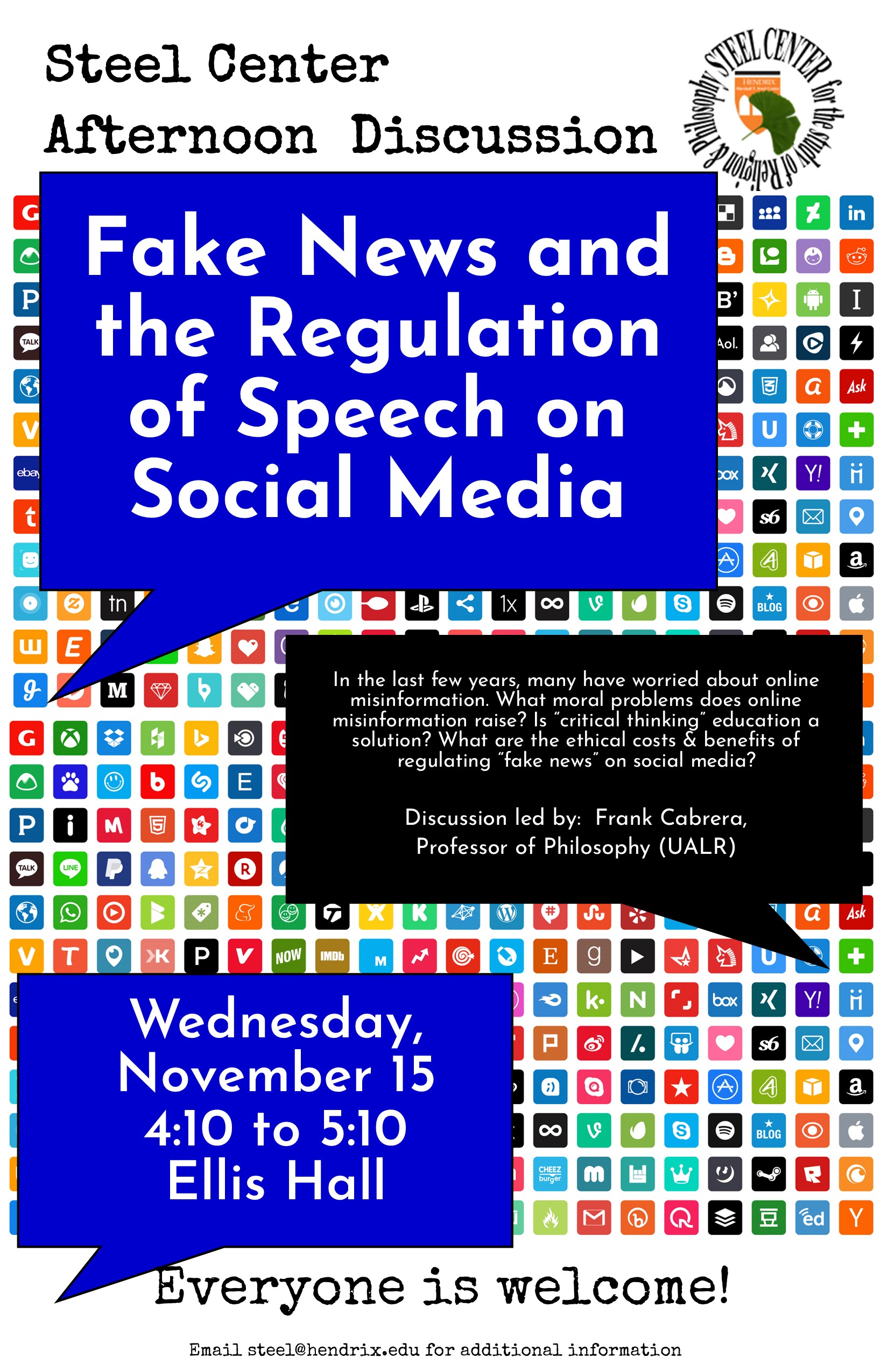
November 8th
The Overlooked Injustices of Adoption
Abstract
Examining the intersections among adoption, foster care and the child welfare system more generally, along with the broader connections between these forms of "family policing" and the carceral logic endemic to all of them, I argue that adoption is far from the "win-win" it is often touted to be.
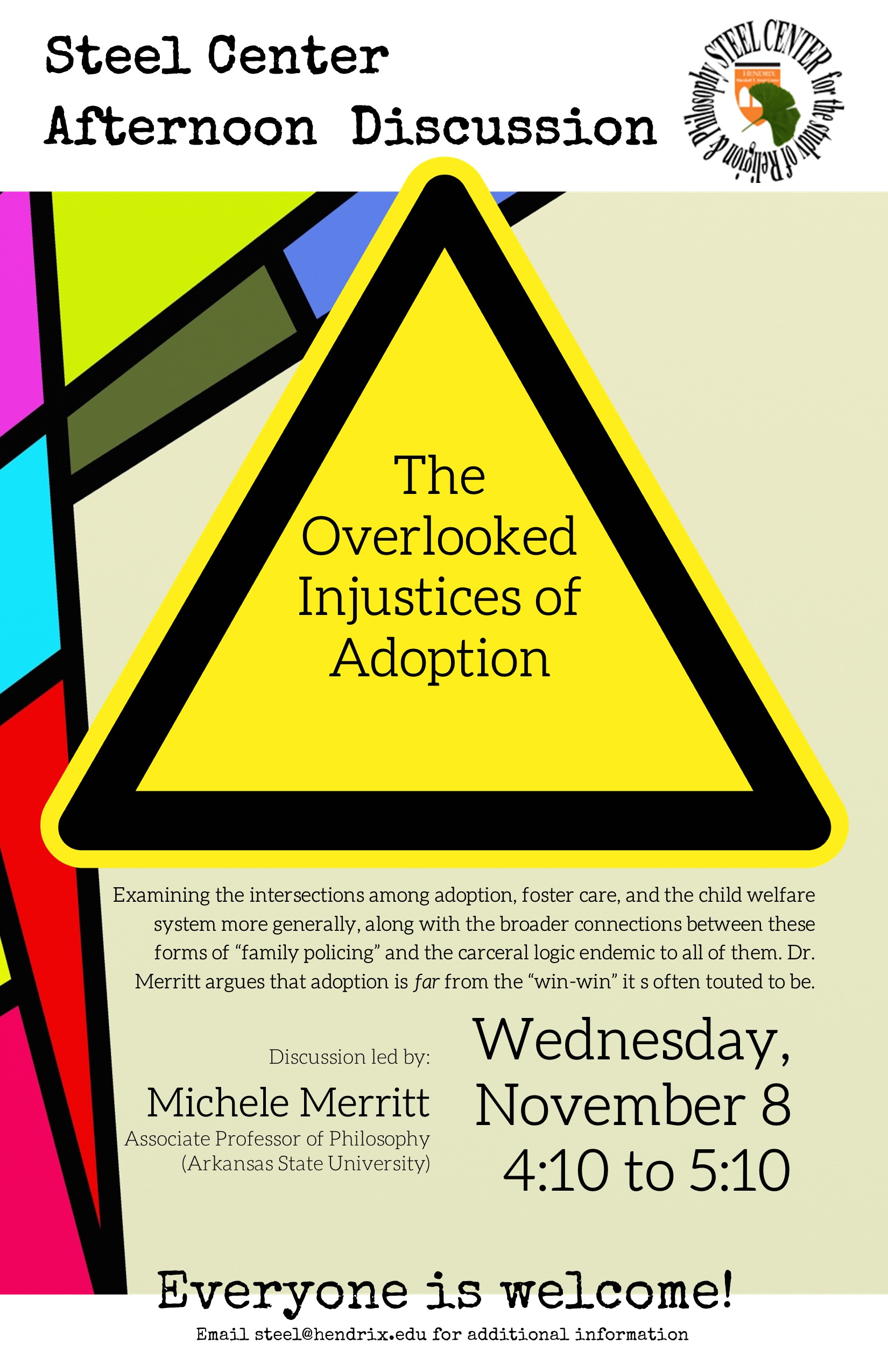
November 1st
Connecting to Nature: Why its Good for You, Your Community, and the Planet, featuring Dr. Jennifer Penner, Professor of Psychology & Dr. Carmen Merrick, Assistant Professor of Psychology
Abstract
Research suggests that connecting to nature can improve individual well-being, community connections, and conservation attitudes and behavior. We’ll review some of this research and then discuss tangible steps that students can take to enhance their connection to nature and engage with their community to promote conservation and sustainability.
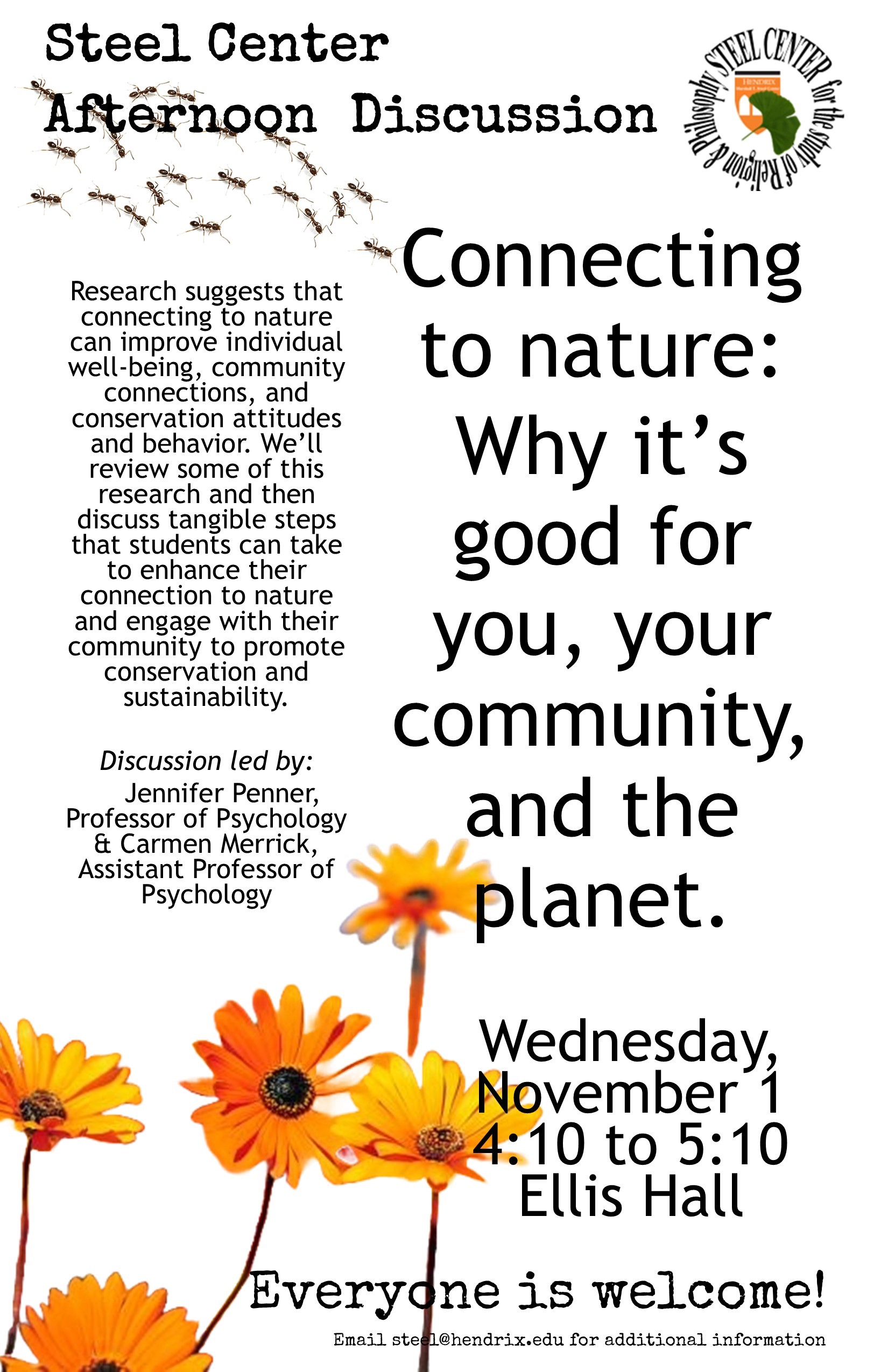
October 25th
The Circle of Concerned African Women Theologians: Steel Center Afternoon Discussion featuring Visiting Scholar, Dr. Esther Mombo
Abstract
Kenyan theologian Dr. Esther Mombo discusses her work with the Circle of Concerned African Women Theologians. This group interrogates how religious traditions, texts, and interpretations impact women while promoting perspectives that empower all genders and justice-loving communities.
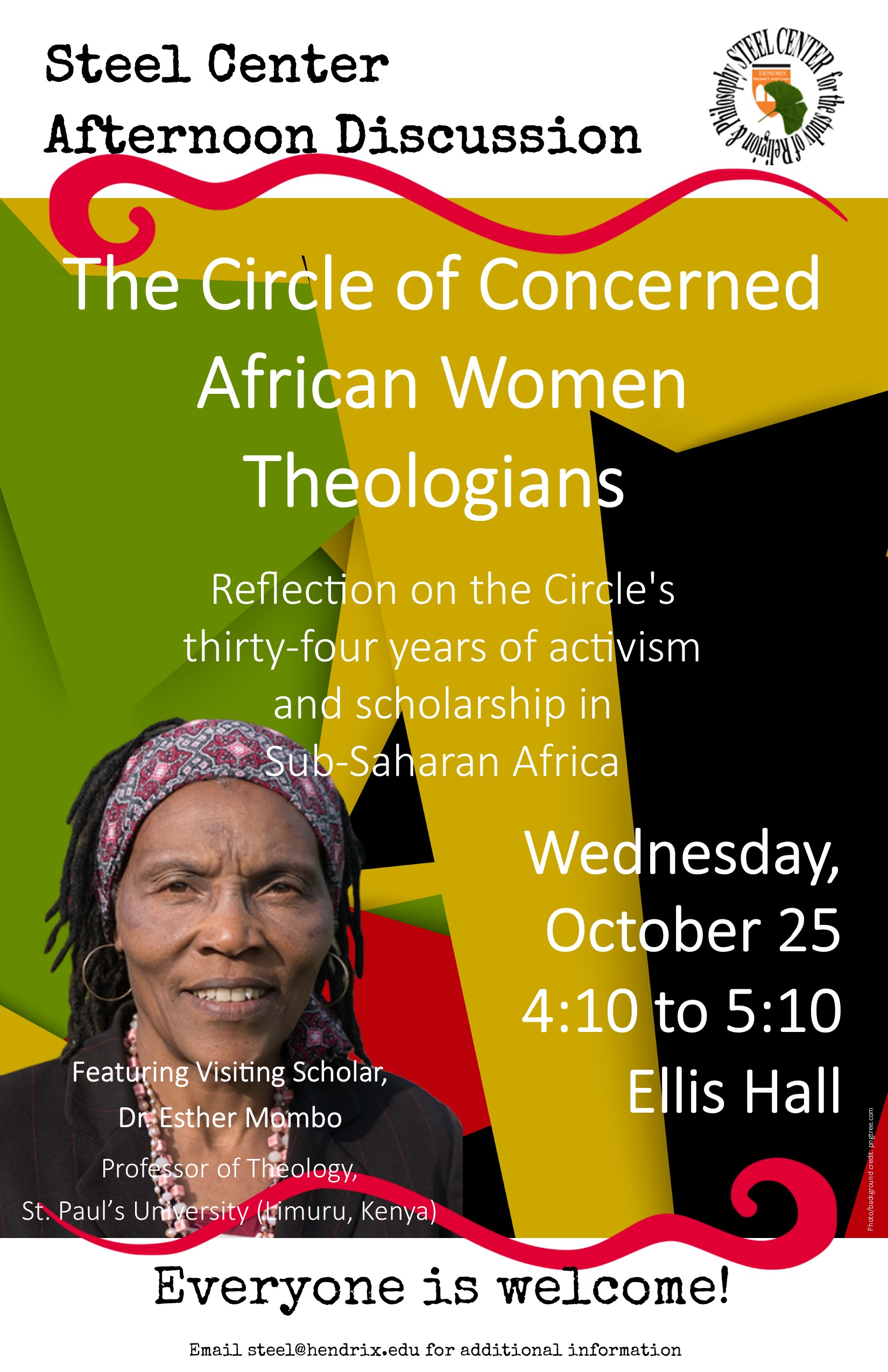
October 18th
Navratri and Dashain: Celebrating the goodness, featuring Siya Pokharel (’27)
Abstract
Navratri, also known as Dashain in Nepal, is the celebration of goodness over evil in Hindu culture. In this discussion, we will learn about the ways in which this victory of goodness is celebrated, as well as the significance behind it. We will also discuss the difference between the celebrations in India and Nepal.
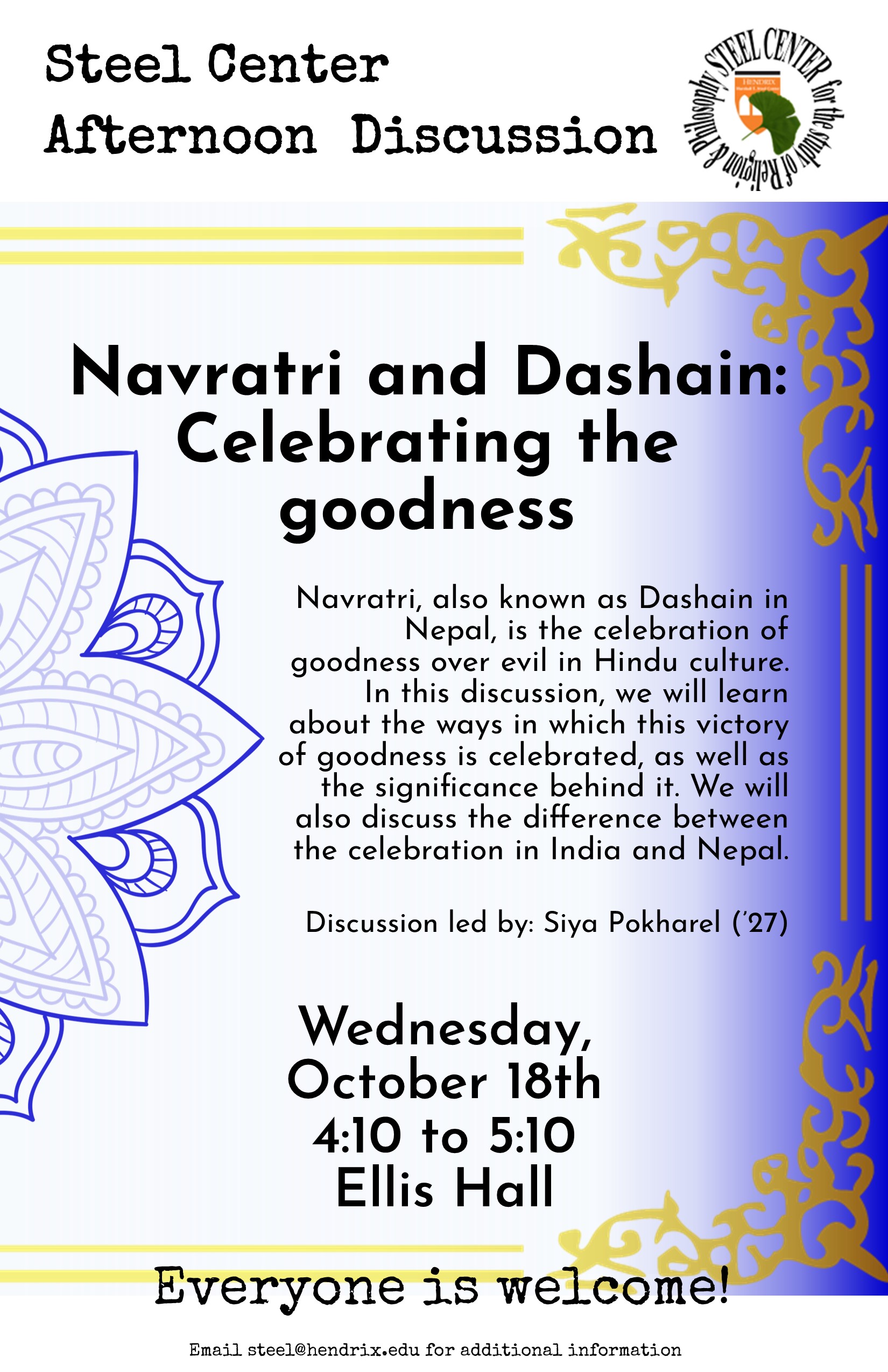
October 4th
Taylor Swift and the Philosophy of Re-recording, featuring Brandon Polite, Assoc. Professor & Chair of Philosophy
Abstract
In 2019, Taylor Swift began producing near-duplicate re-recordings of her first six studio albums. One question these so-called “Taylor’s Versions” raise is whether they count as mere instances of the original albums, similar to how my copy of Jane Austen's Emma and yours are instances of the same novel; or whether they are instead distinct from the originals, similar to how the many film and television adaptations of Emma are distinct (though derivative) works of art based on the same story. Polite will argue that Taylor’s Versions are distinct from the original albums. In doing so, he will explore what Swift's re-recording project tells us about the nature of recorded music.
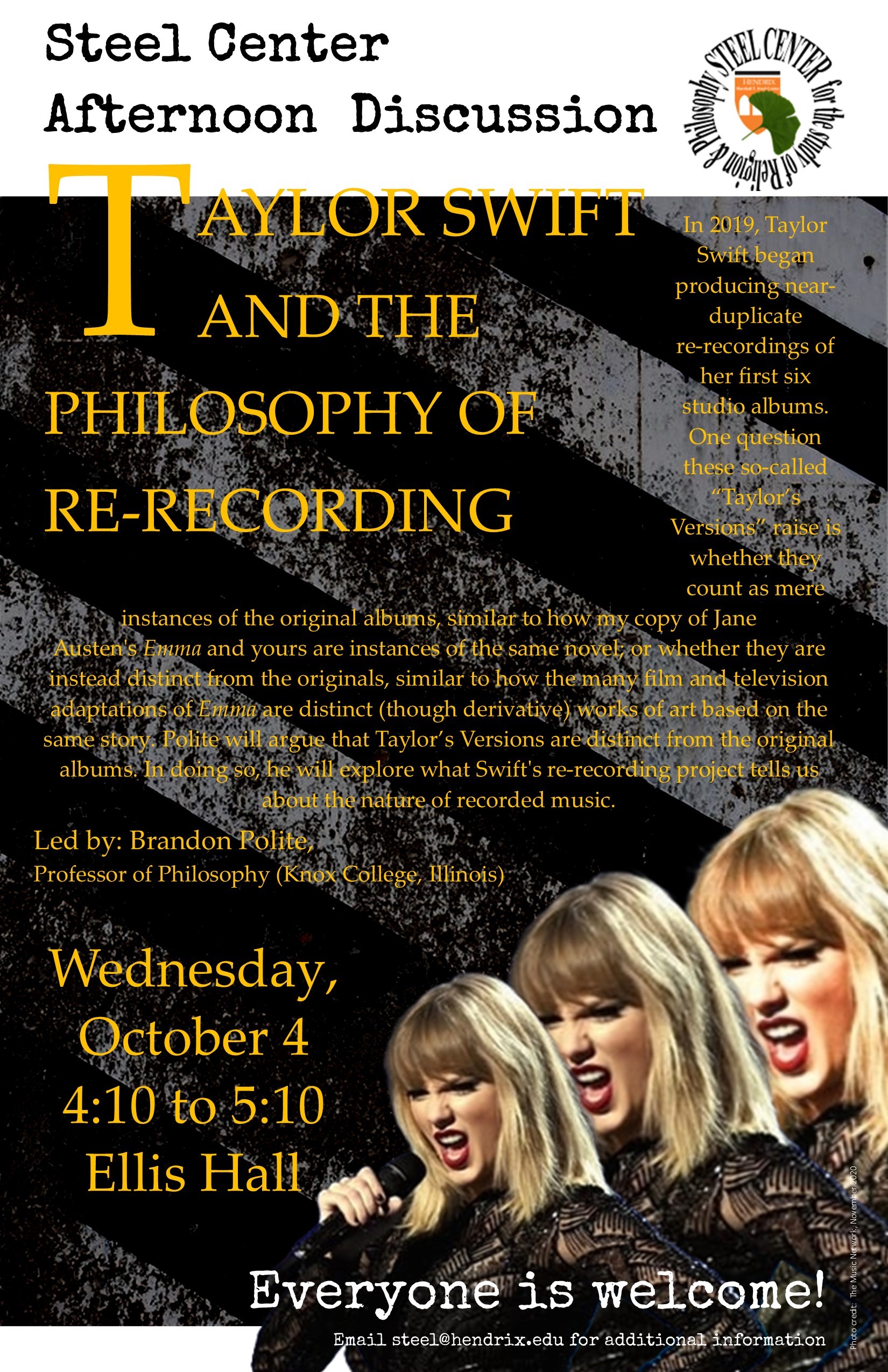
September 27th
The Barbie Movie: Baby’s First Feminism led by Aiyla East and Logan Ingram
Abstract
Join us to discuss the newly released Barbie Movie! We will meet to discuss the themes, references, strengths, and weaknesses of the movie as it relates to feminism and reflects the actions of the modern feminist movement. All thoughts and opinions are welcome as we gather to discuss how the movie of the year has influenced and disrupted society. Pink is not mandatory, but highly encouraged! Refreshments will be served.
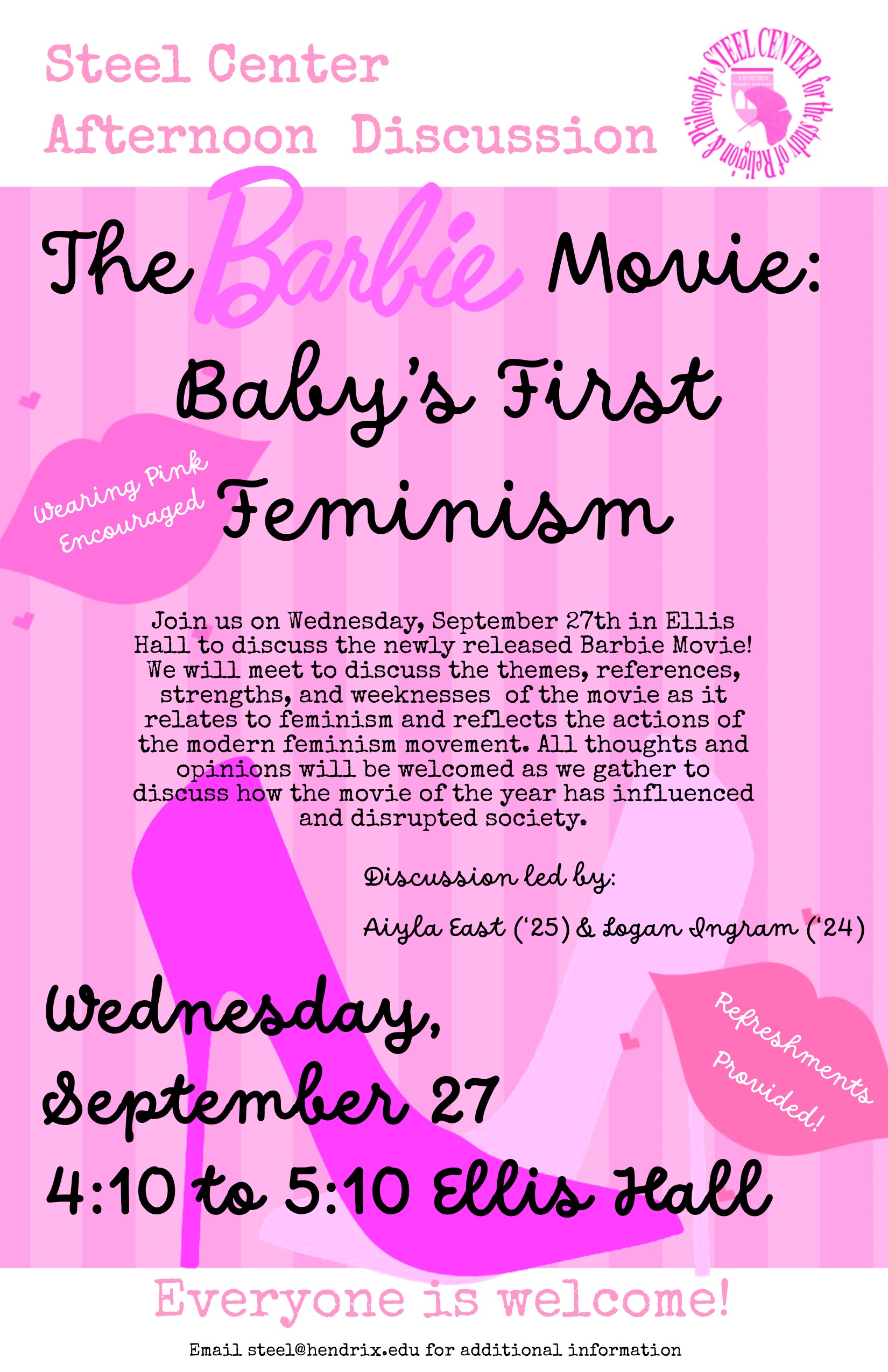
September 22nd *FRIDAY DISCUSSION*
Sam King “Useful Friction” Ellis Hall Exhibitions Opening and Discussion hosted by the Steel Center - This event is free and open to the campus community and the public. Family Weekend Guests Welcome!
Artist Description
Useful Friction refers to the tension between intuitive and grid-based visual structures which drives the composition of my paintings, as well as the tension a viewer might feel when engaging paintings that do not represent familiar imagery. We tend to apply our perception for essential purposes: seeking food, shelter, safety, or pleasure, for example. With this habit as a default setting, perception for its own sake (or for some elusive end), might seem indulgent or unnecessary. I recognize metaphor in this contrast. Is a person’s value merely a reflection of their utility within a system, or can it be internally generated?
When I paint, I am pursuing meaningful relationships of color, line, shape, and material. My paintings are embodiments of experience: the passage of time, chance, change, and the formation and abandonment of habits. They are the results of a sustained program of improvisation. Paintings might be broken down and recombined over several years, with long intervals of time separating periods of focused work. There is metaphor in this, for me, as well. The self, in my view, is realized in negotiation with its context over time. It is a hub within a wider matrix of constantly changing connections.
The concept of useful friction applies as well to my guitar-based audio project, called Untight, in which I overlay harmonies produced using just intonation with the harmonies of standard, twelve tone equal temperament. Sometimes, notes using the two systems are similar enough that the listener would not notice any difference; other times, the notes beat against each other, creating a shimmering, sometimes disorienting sensation that is for many listeners not quite music, but not merely sound, either.
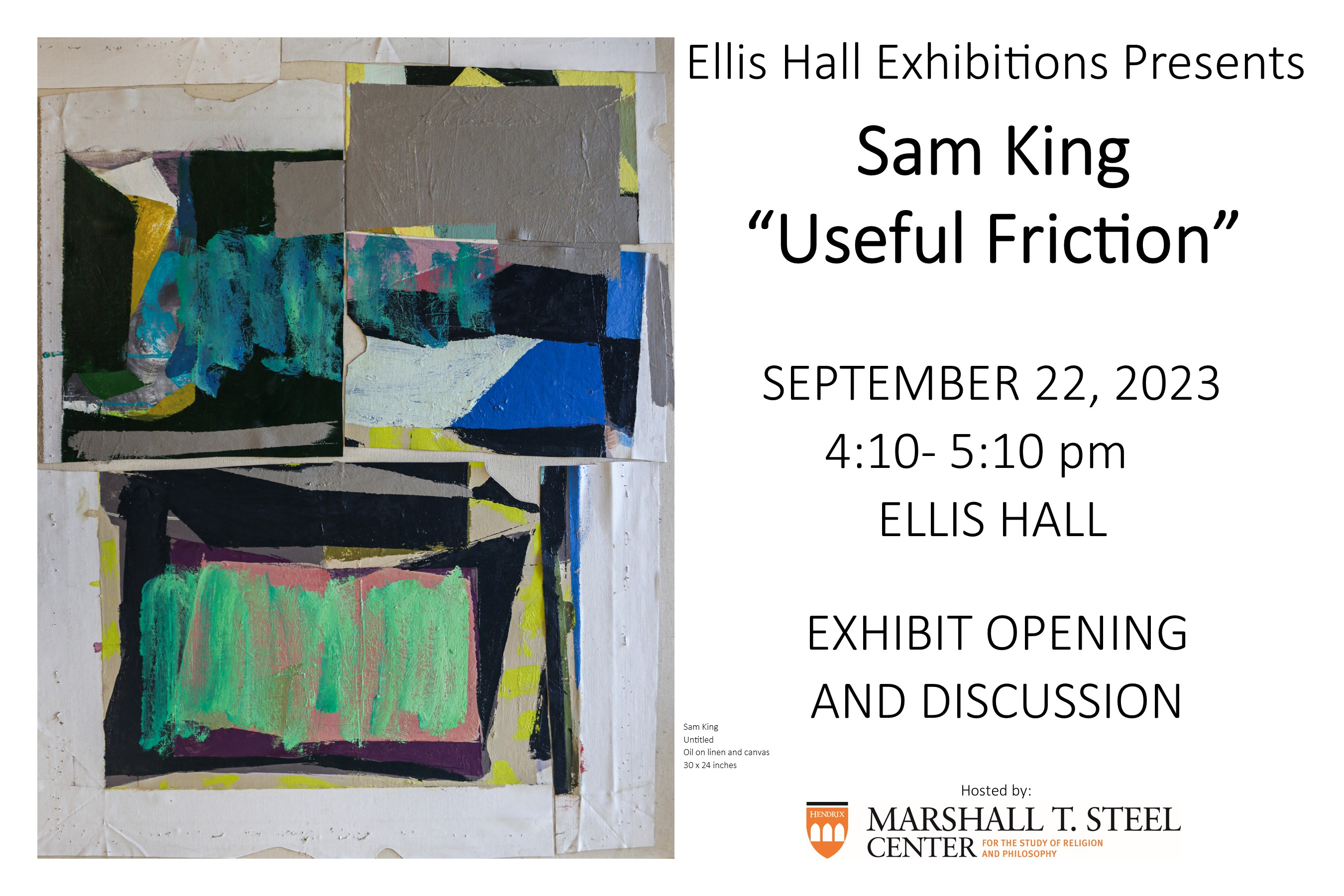
September 13th
Rosh Hashana and Yom Kippur, How Jews Have a Sweet New Year, featuring Hendrix Hillel President, Josh Thomeczek
Abstract
Hendrix Hillel President Josh Thomeczek is giving a casual introduction to the Jewish New Year and the two holidays of Rosh Hashana and Yom Kippur, which give structure for Jews around the world to have a meaningful and prosperous year.

September 6th
Pluralism about the Liberal Arts
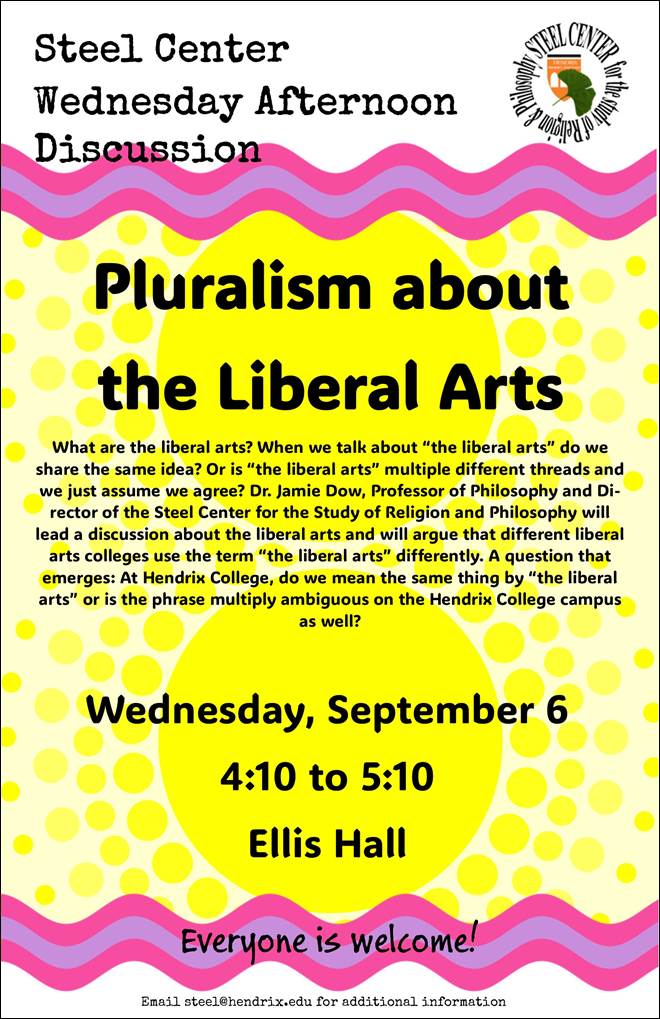
Spring 2023 Schedule
April 26th
Christian Nonviolence: Is It Worth Fighting For? Featuring Justin Barringer, Adjunct Instructor of Religious Studies, Hendrix College
Abstract
Often when someone declares that they are a pacifist they encounter a predictable set of questions and objections. "What about Hitler?" "What would you do if someone was attacking your loved one?" What about those people who fought and died for our freedom?" and the like. And, Christians, likewise face these questions along with others specifically from their tradition. "What about Old Testament violence?" "What about Romans 13?" "What about the violence of Revelation?" "What about Jesus Flipping Tables?" and others. This discussion will attempt to address many of those questions based on Dr. Barringer's book A Faith Not Worth Fighting For: Addressing Commonly Asked Questions About Christian Nonviolence. All are welcome to come and spar about these important questions, nonviolently, of course!
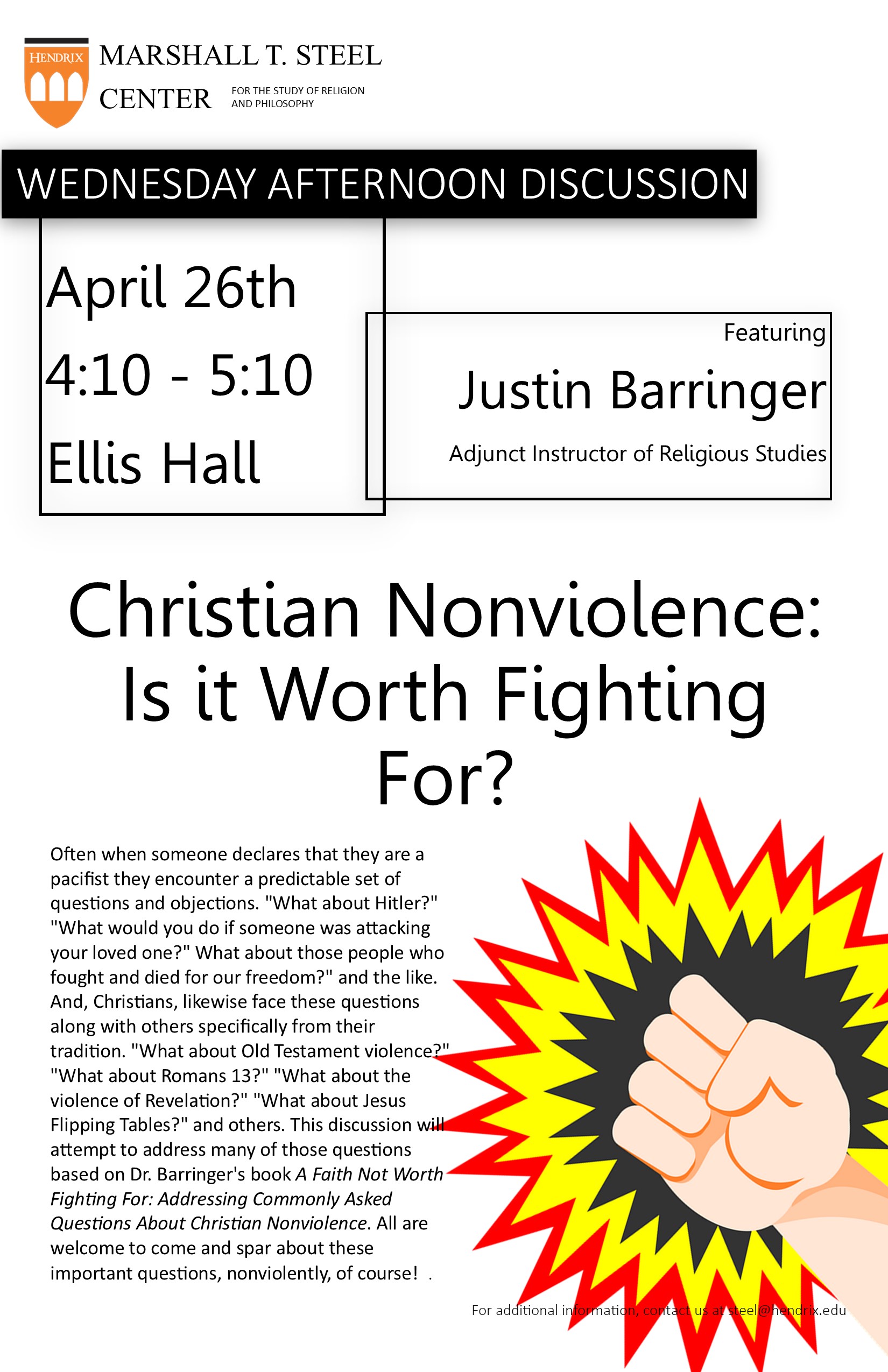
April 21st- Friday Afternoon Discussion
Trading the blackboard for the pulpit--Things I have Learned, Featuring Dr. Peg Falls-Corbitt – Distinguished Professor Emerita in Philosophy – Hendrix College
Abstract
Dr. Peg Falls-Corbitt retired from Hendrix the spring of 2021 and, after completing the necessary academic requirements for certification, began pastoring the First Presbyterian Church of Morrilton, AR summer of 2022. Dr. Falls-Corbitt will discuss similarities and differences she has found between teaching and preaching and in the challenges of mentoring academic journeys compared to pastoring faith journeys. In both activities, says Dr. Falls- Corbitt, we walk on holy ground.
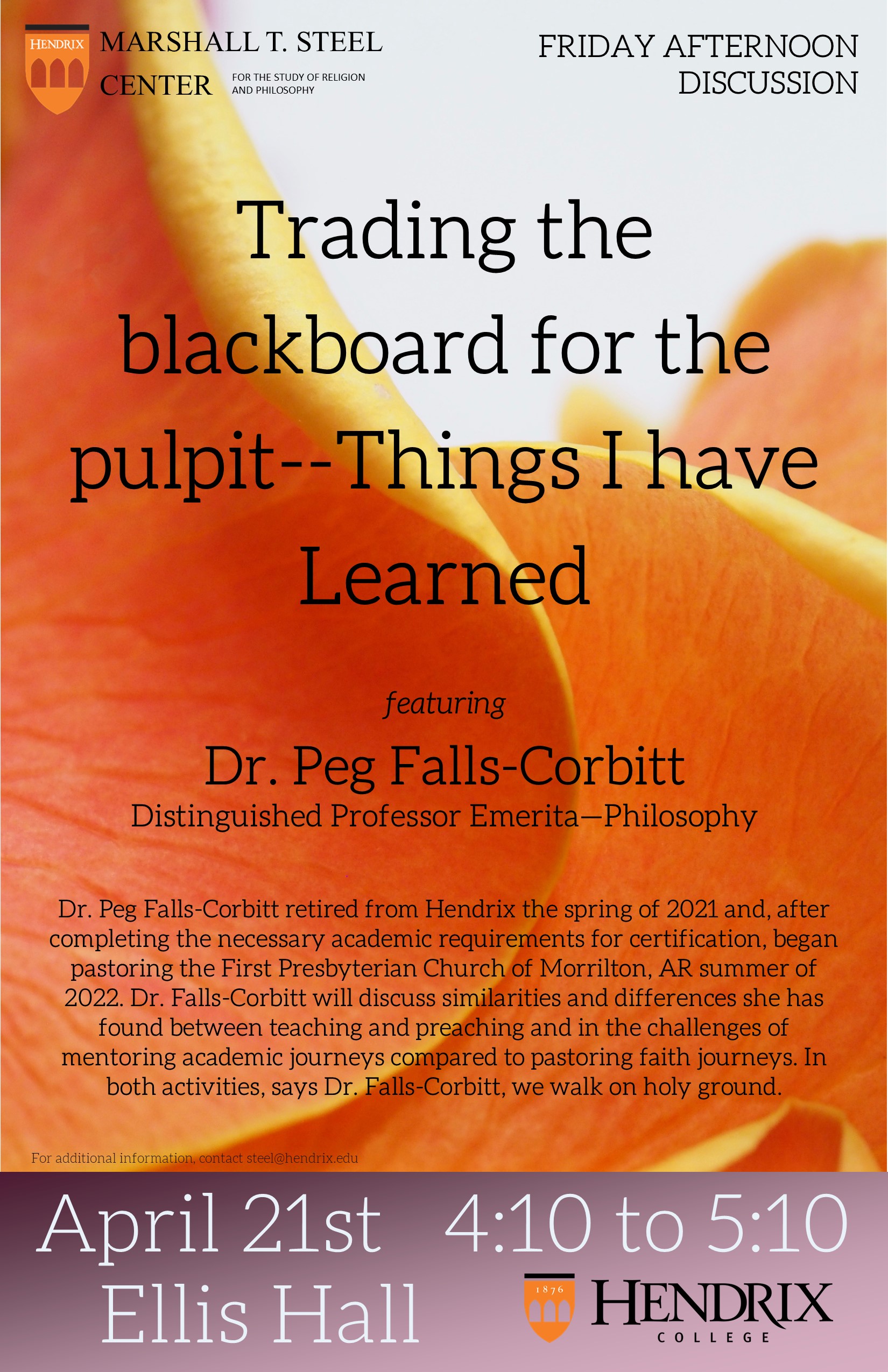
April 12th
From the Arab spring to the democratic transition Tunisia at a crossroads, Featuring Fulbright Scholar Ghaida Ghediri
Abstract
Tunisia is the country that has been the trigger for uprisings of the Arab Spring from December 2010 to January 2011, put an end to a long rule of 23 years of Ben Ali. The Ben Ali regime was characterized by the “democratic deficit” at the institutional and political level and the absence of participation in political life with the brutalization of opponents. The Tunisian elite, the UGTT (the central trade union), left-wing movements, human rights activists had always been at the heart of democratic demands in the country and have since the 1970s and campaigned for a participatory and democratic regime. The uprising was, indeed, the product of a combination of circumstances and a process of continuous struggles for generations for setting a democratic country. The events of the mining basin of Gafsa 2008 illustrates these struggles against the Ben Ali regime, even since the regime of founding father Habib Bourguiba, the builder of modern Tunisia, these struggles marked the history of the country. After the revolution and since the beginning of the transition with the elections held on October 23, 2011 to date, the democratic transition has known hard times, political assassinations, a desire for hegemony of the Islamists but also a consensus around the nation Tunisian and its achievements, a national dialogue crowned by a Nobel Peace Prize, a Constitution resulting from a consensus of political parties and movements (in 2011). Today, with the new political changes in Tunisia and in the region, the nascent democracy seems threatened. what are the features of this transition? can we compare with the countries of the region the Tunisian experience which is often described as a "model"? How to perceive the authoritarian tendencies of the regime in place today?
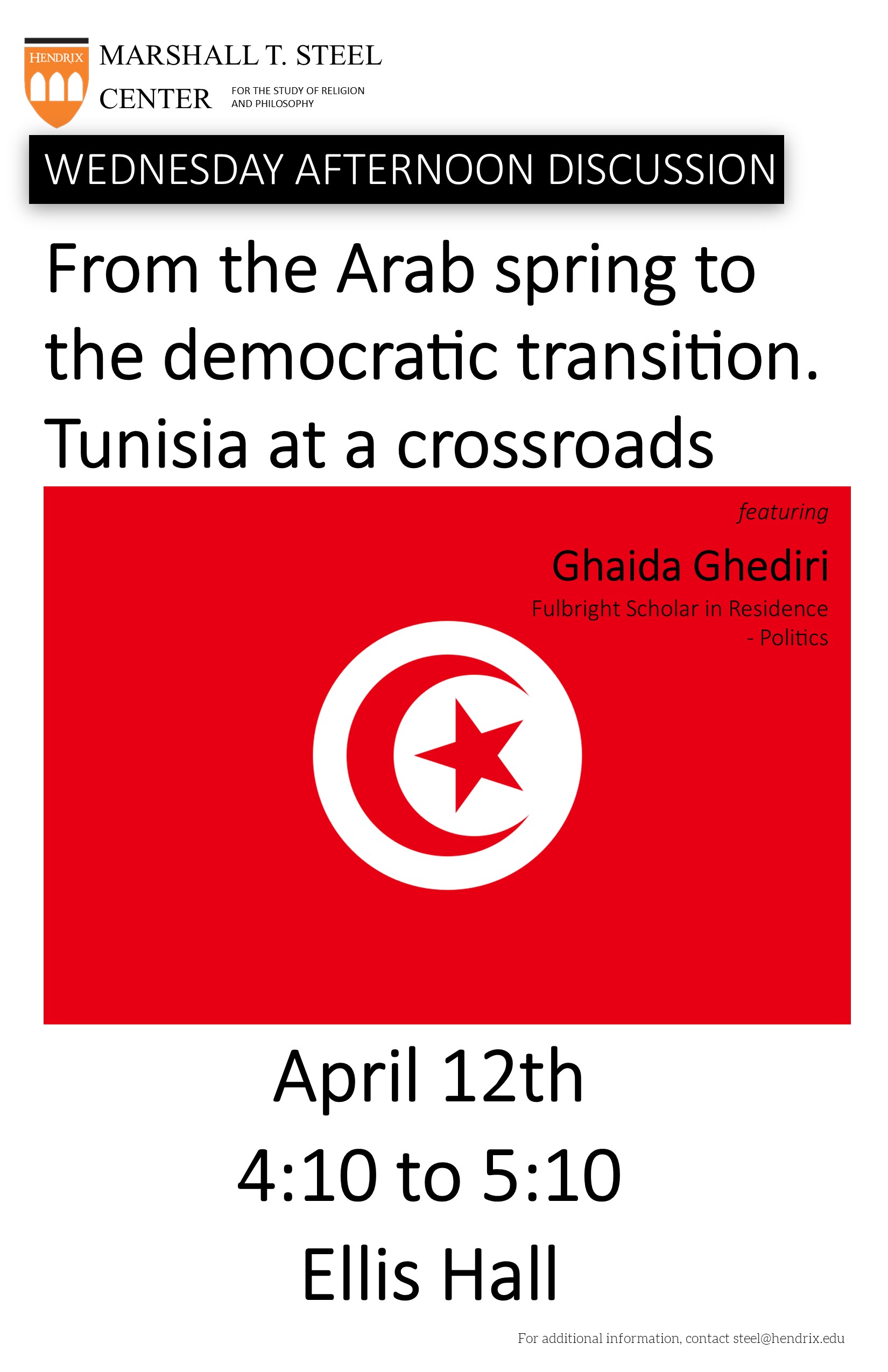
April 5th
Activism & Drag: Life in Arkansas, Featuring Athena Sinclair (aka MD Hunter)
Abstract
Join us for a personal account of being a drag performer in Arkansas, the impact on one Activist’s life…how that lead to their involvement in politics and the fight for others, what is currently affecting the LGBTQ+ and minority communities.
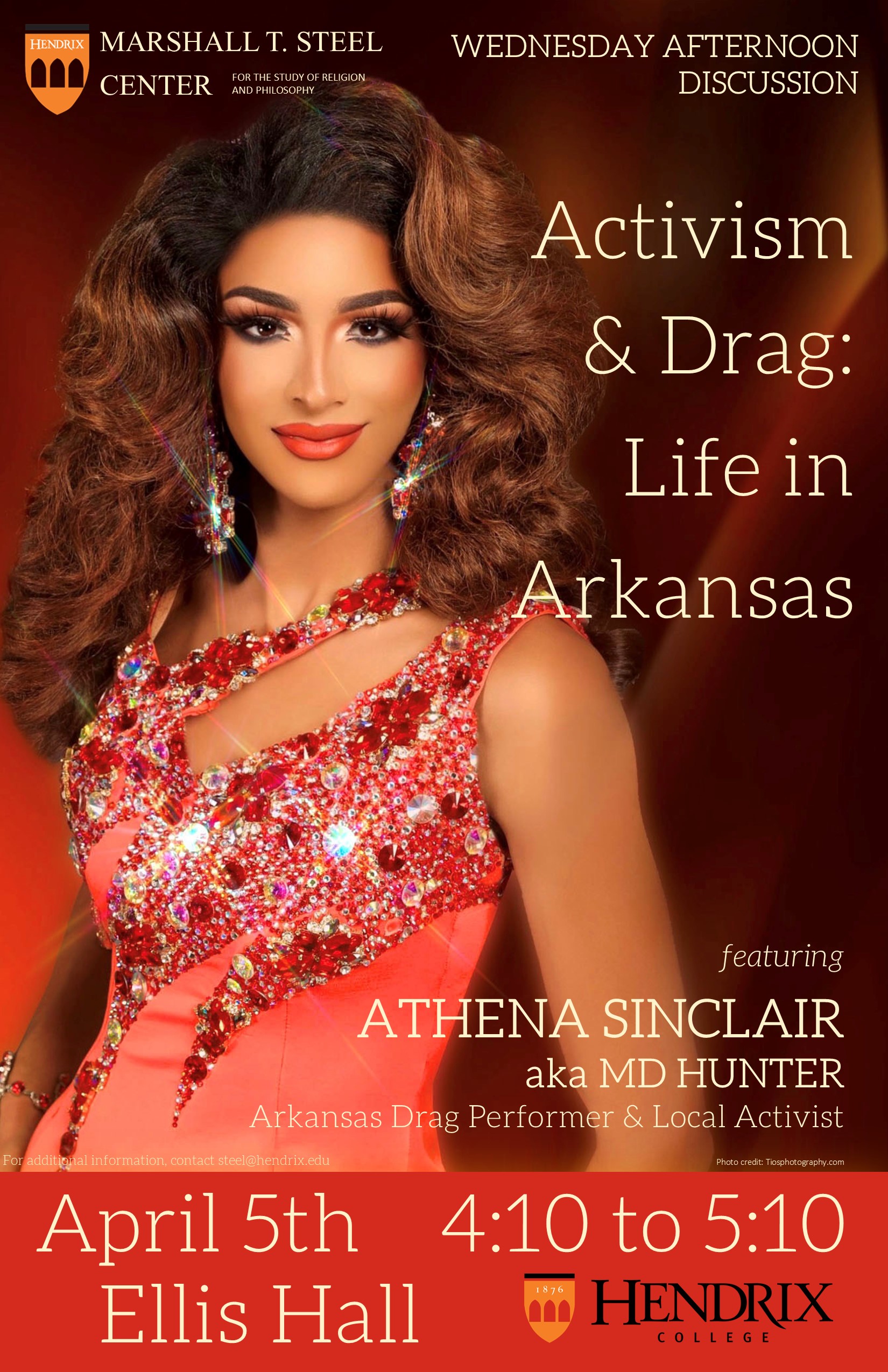
March 15th
The Queer Concert: Utilizing Music for Queering the Egyptian Social and Political Uprising, featuring Hendrix's own, Dr. Izat El-Amoor, Assistant Professor of Sociology/Anthropology
Abstract
On June 14, 2020, queer Egyptian Sarah Hegazy died by suicide in Canada, where she exiled shortly after her release from prison in Egypt for raising a rainbow flag during a Mashrou’ Leila (ML) concert on September 22, 2017. Following the concert night, Egypt saw widespread arrests of Lesbian, Gay, Bisexual, Transgender, and Queer (LGBTQ) individuals amidst an imposed media block-out on the LGBTQ community. Tracing the ML band and concert events as a case study, this article contextualizes the Egyptian LGBTQ struggle since the uprising. It examines the ways ML uses music as a strategy of resistance, consequently building an alternative community that holds a discourse of oppositional ways of thinking. Considering a noticeably larger surge in the popular culture scene and the appearance of political music revolutionary in Egypt, this article joins literature on music’s role in resistance, as well as the biopolitics of the nation-state in Egypt as they manifest in relation to LGBTQ life there.
.jpg)
March 8th
Simone Weil and the Problem of Evil: Steel Center Wednesday Afternoon Discussion, featuring Meagan Fritts, PhD (Philosophy- UALR)
Abstract
The philosophical "problem of evil" for the existence of God argues from the presence and prevalence of suffering in the world to the conclusion that God does not (or probably does not) exist. The argument's claim is that such an "evil" world is not what we would expect, given the existence of a perfectly good and all-powerful God. Simone Weil, a 20th century French philosopher and theologian, believed that these expectations about suffering in the world are driven by incorrect metaphysics of God. Further, she held that if God is the source of being, then these expectations--and our view of creation itself--require a radical shift. Such considerations should, I argue, cause us to reevaluate both the traditional arguments from evil as well as traditional theodicies.
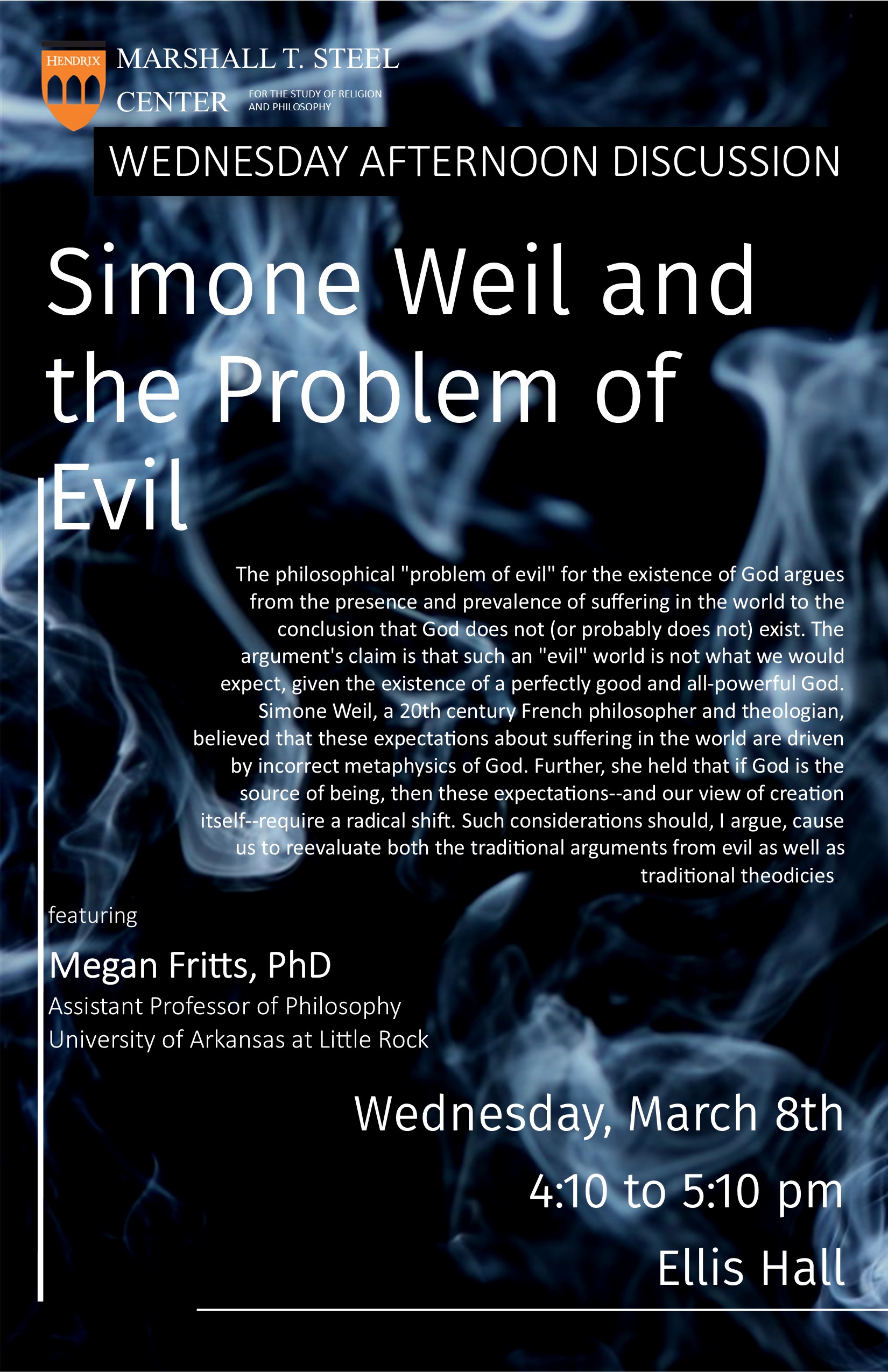
March 1st
Pluralism and Religion in Modern Israel
Abstract
While Americans are used to separation of religion and state, in Israel, religion is actually embedded into state, with authority over specific areas of law. Come learn about religious pluralism in Israel and its role in political debates today.
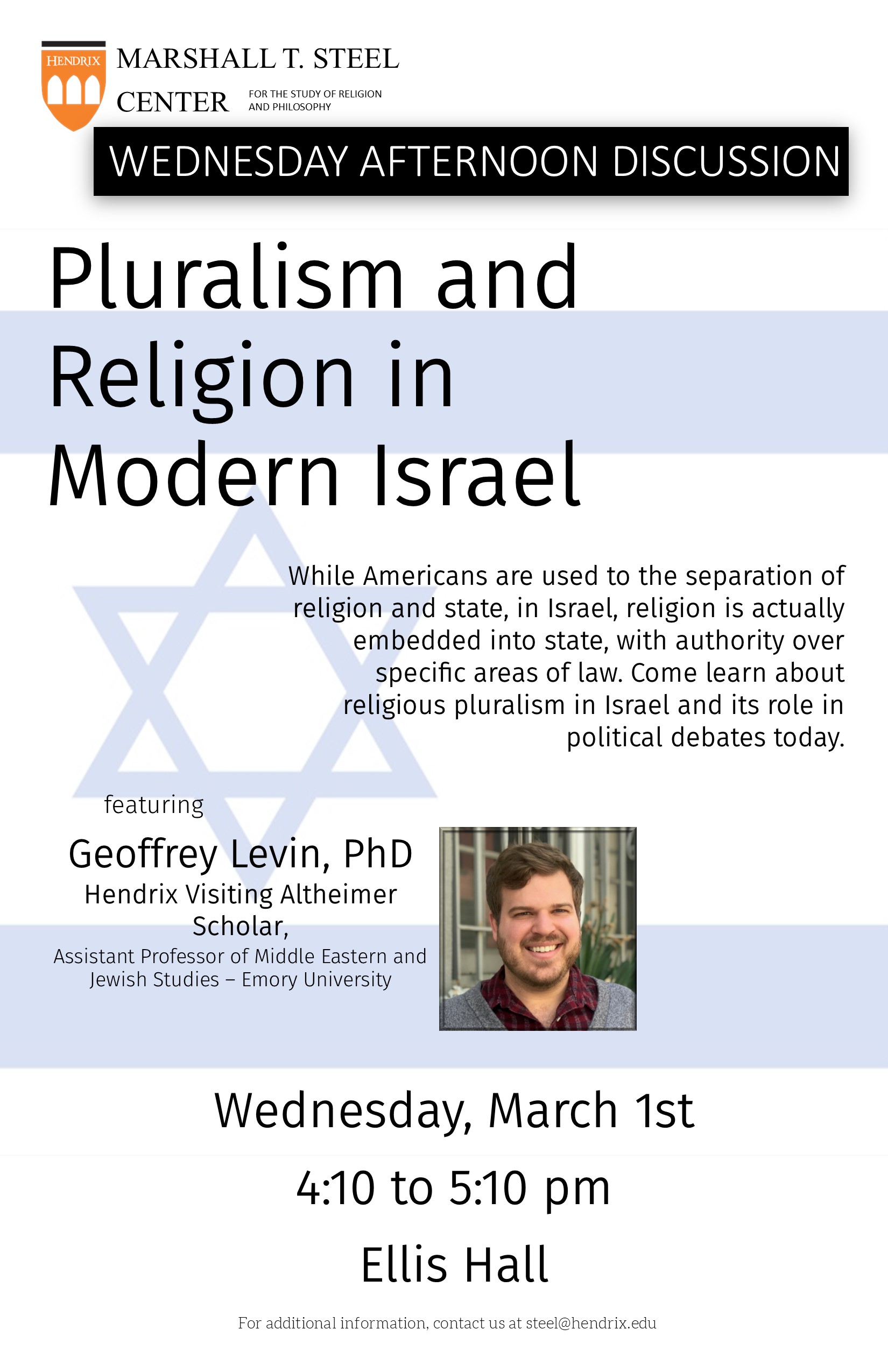
February 22nd
Mitigating Climate Change through Environmental Reverence, featuring Kimberly Dill, Assistant Prof. of PHIL, Santa Clara University
Abstract
In this piece, I focus on a philosophical analysis of reverence, as induced by more-than-human entities and environments (including coastal redwoods). By reference to the empirical, psychological literature, I show that environmental reverence is (i) inherently motivating, (ii) promotes efficacious conservation behaviors, and (iii) is positively affective (i.e., it induces subjective wellbeing). I pay particular mind to (what I term) the important role that reverence plays in motivating the efficacious conservation of biodiverse spaces—including forested groves. Utilizing this definition, my over-arching project recommends a few first-order, ethical prescriptions. First, I argue that it is key for mass environmental discourse (in e.g., media) to shift its focus in order to highlight the import and motivational efficacy of cultivating environmental reverence. I define reverence as a moral emotion that must satisfy external success conditions (in terms of e.g., a subject’s behavior or its environmental effects), so its proper implementation requires on-the-ground relationship building between communities and the local, biodiverse spaces near which they dwell. Furthermore, I take it as obvious that one cannot exhibit reverence for the global climate, but one can exhibit reverence for particular, biodiverse landscapes. With this in mind, this piece is also formulated as a dialectical nudge to reprioritize biodiversity conservation as a top target for philosophical inquiry, policy reform, and mass discourse. This is by no means to claim that we should de-prioritize concerns about global climate change; rather, I assume that the wealth of available empirical evidence justifies a bi-conditional correlation between biodiversity loss and climate change more generally.
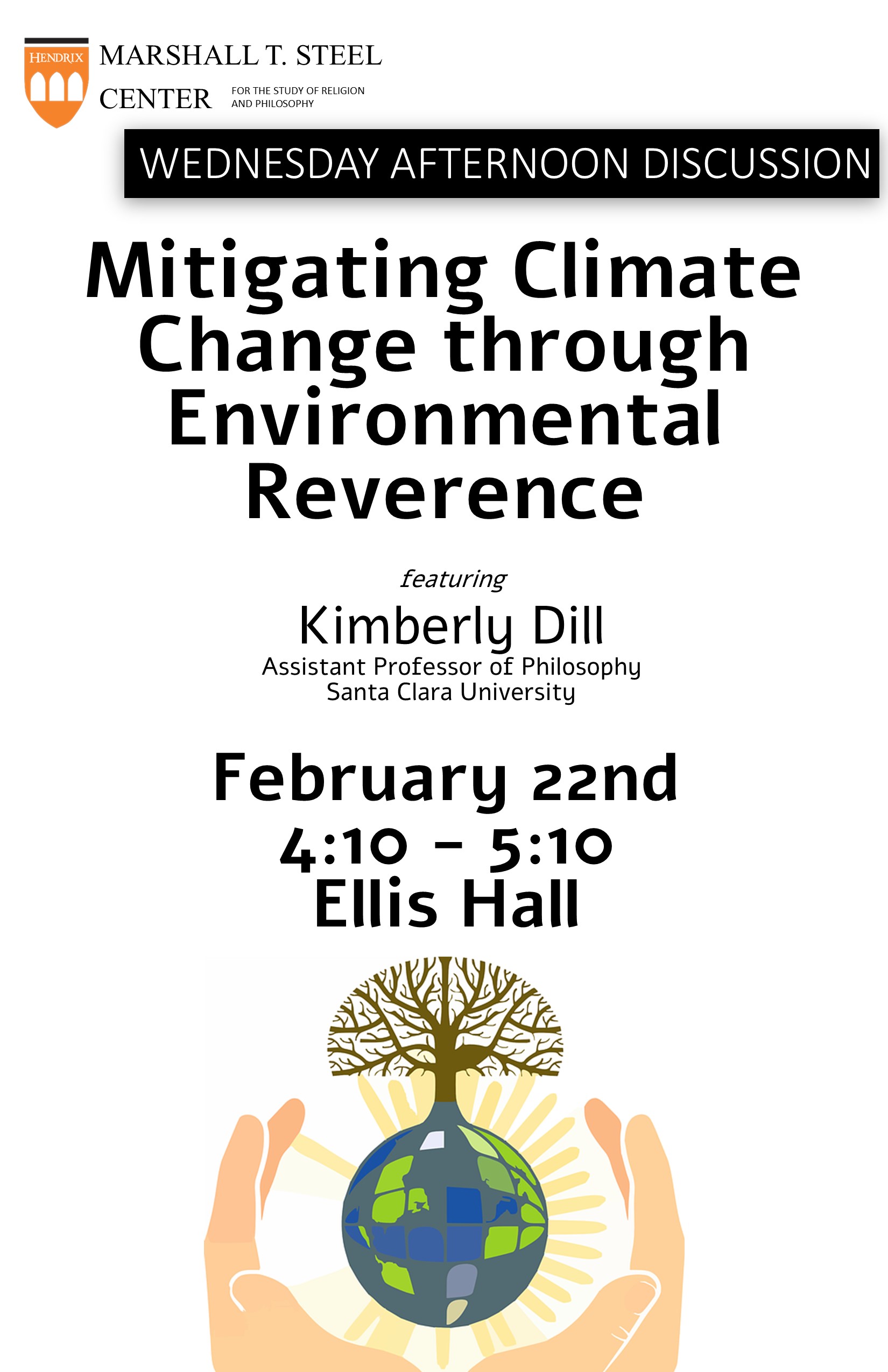
February 15th
Share Your Favorite Love Song!
Abstract
Our Wednesday afternoon discussion will be about what makes a love song aesthetically good. Please send your favorite love songs— romantic love, unrequited love, self-love, and/or queer love— as Youtube Links to steel@hendrix.edu. We will make a playlist and talk about why we love these love songs.

February 8th
Using Philosophy to Build Community, featuring Hendrix's own Kimberly Maslin, Professor of Politics
Abstract
Philosophy gets a bad rap for either focusing on the individual or being abstract. Political philosophy must overcome both of these problems. In this discussion, we’ll talk about ways to use the experiences of real people to build community.
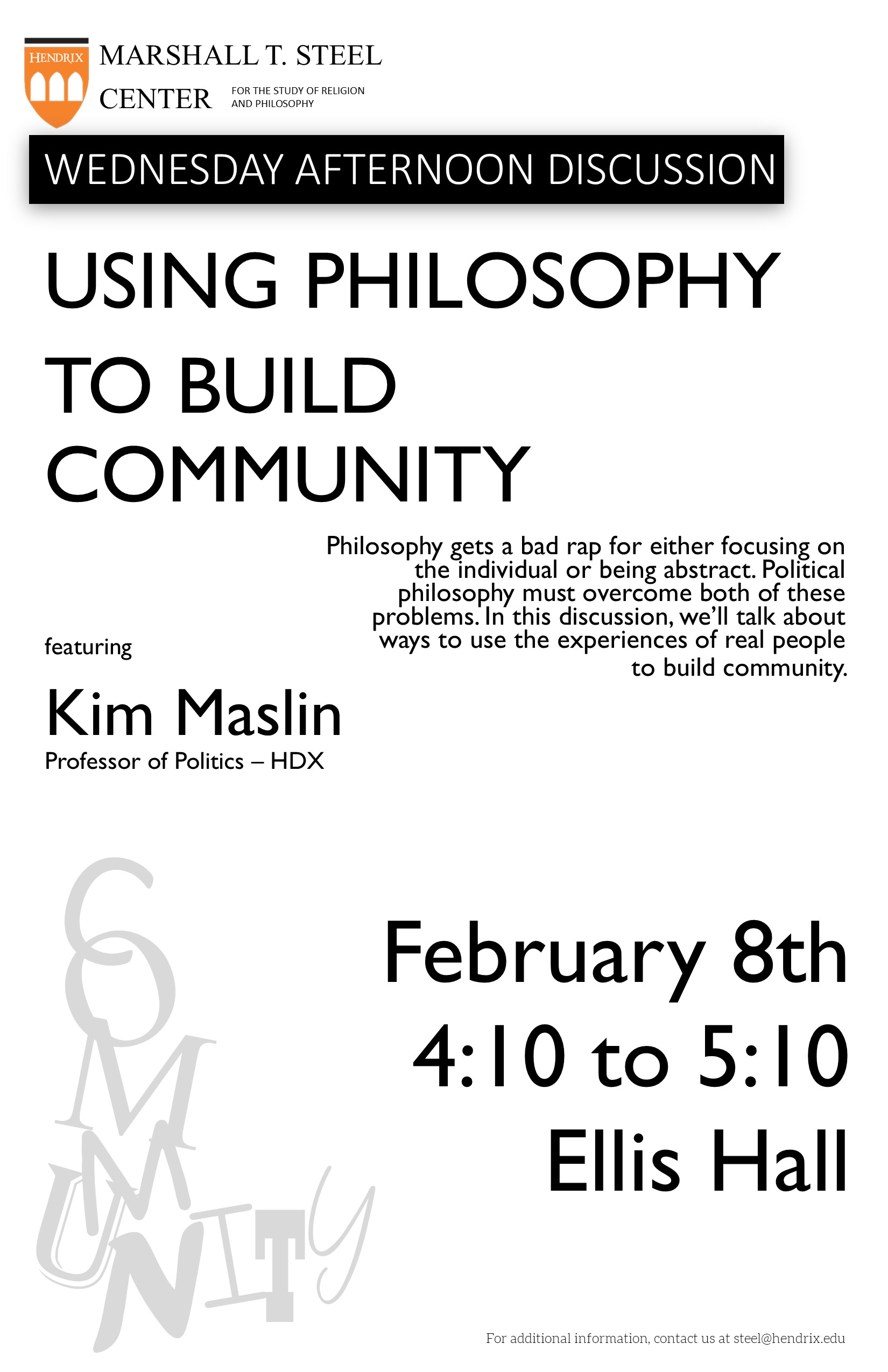
January 25th
Towards a Politics of Black Horror, featuring PhD candidate at CUNY Graduate Center, Nicholas Whittaker
Abstract
Black horror film, usually at the margins of culture, has become unprecedently mainstreamed in recent years. This is a thrilling opportunity for us to rethink our political, aesthetic, and emotional experience of blackness, and race simpliciter. For black horror films allow us to experience blackness as unintelligible. In these movies, the world structured by anti-Black racialization becomes monstrously incomprehensible, unbound from the conceptual schemas we typically rely on to make sense of our surroundings. Most of our politics and art, whether racist or "antiracist", encourage a sense of comprehension, security, and even smuggles in living and thinking race. Black horror, on the other hand, invites us to see where radical humility might lead us. What kinds of political activity, social relationships, and aesthetic experiences are made possible by the embrace of the precise kind of horrified unknowingness these films disseminate?
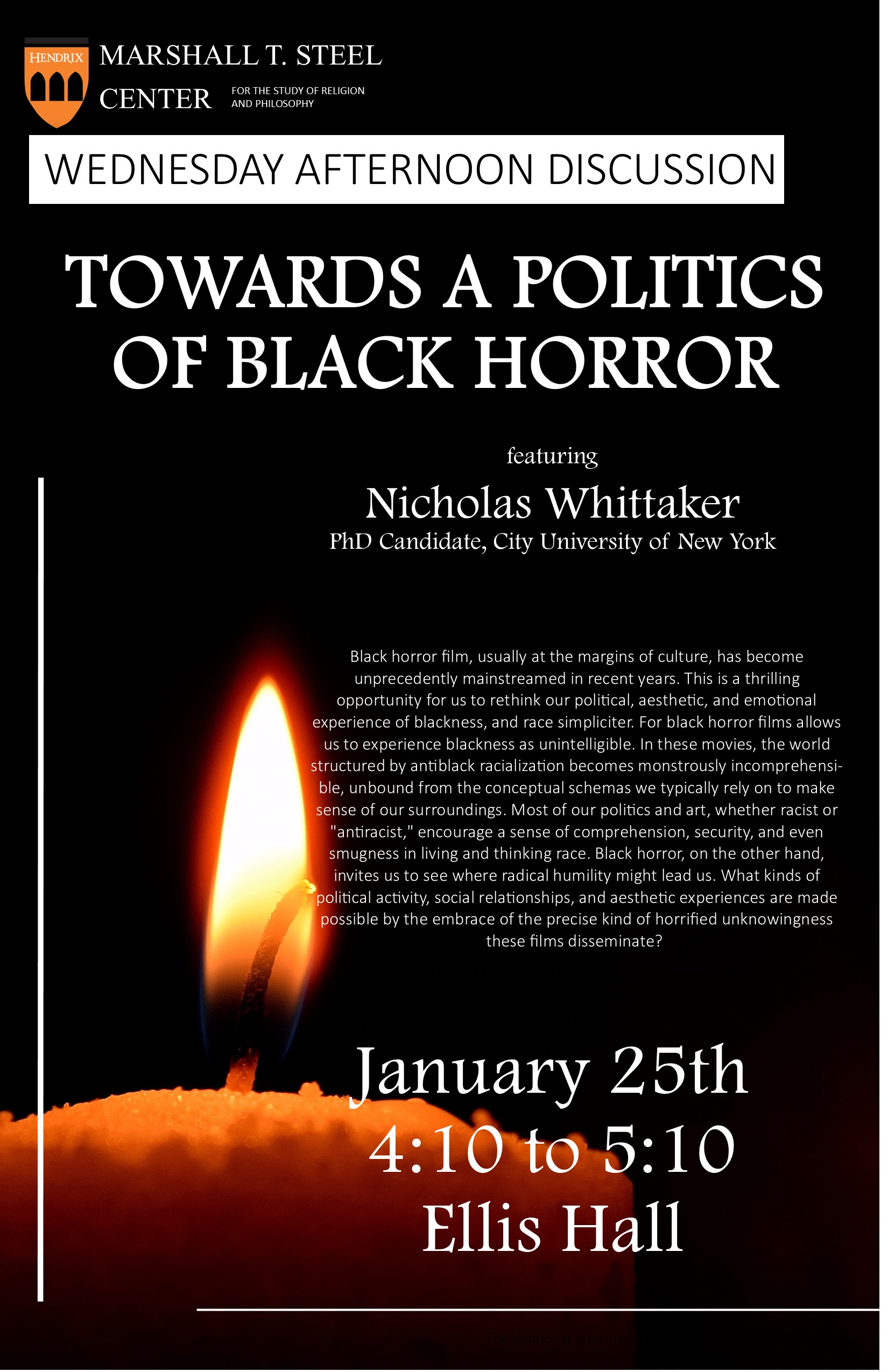
Fall 2022 Schedule
November 30th
Recollections with President Ellis Arnold: My Time at Hendrix College, featuring Hendrix College President Ellis Arnold
Abstract
Join us for an afternoon with President Ellis Arnold as he reflects on his time at Hendrix through his various roles. All are welcome and refreshments will be served.
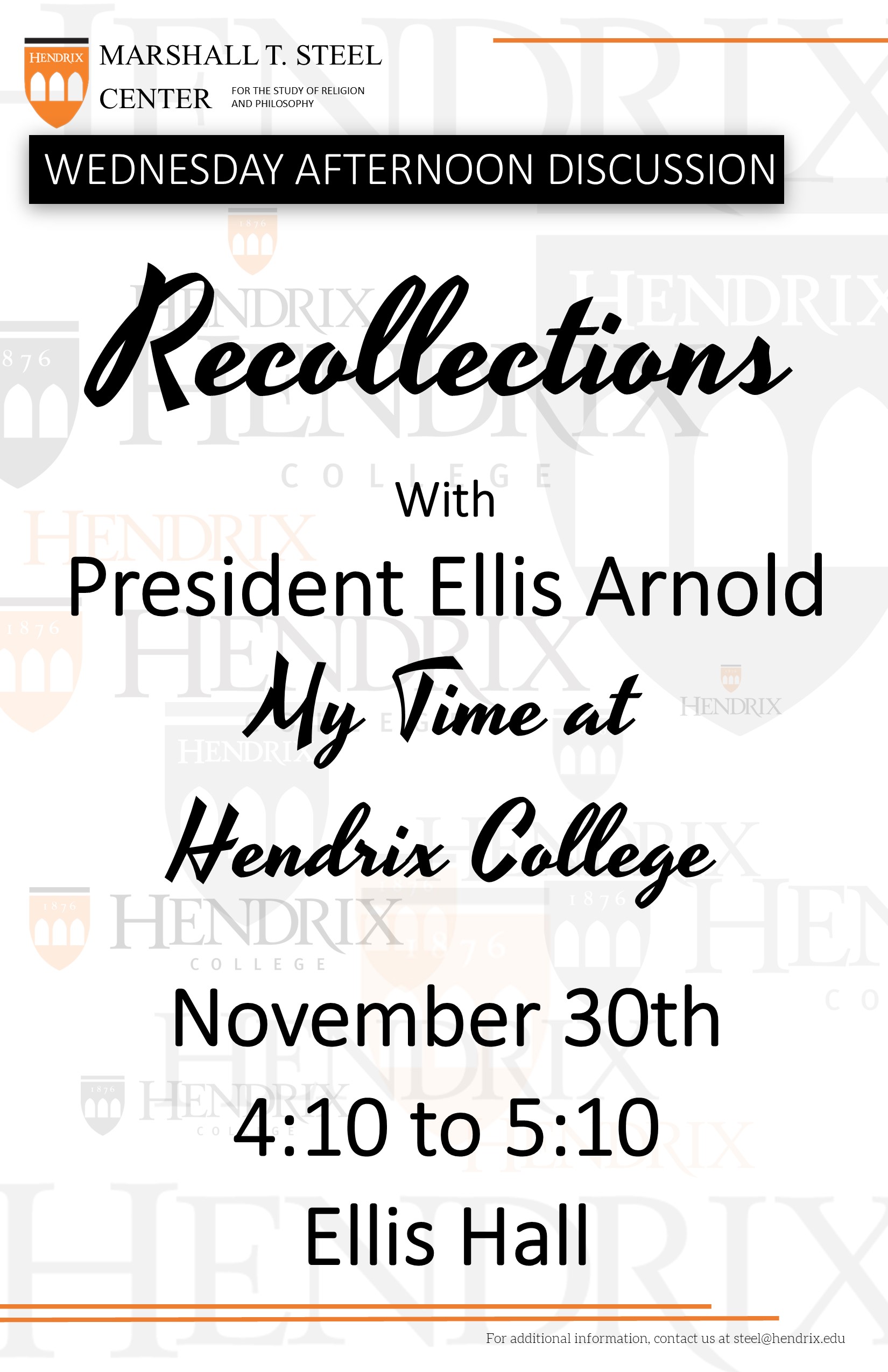
November 16th
The Ancient and Modern Metamorphoses of Daphne: Myth as Examination, Critique, and Transformation featuring Rebecca Resinski, Professor of Classics
Abstract
The myth of Apollo's pursuit of Daphne is found in literature and art from antiquity to the present day. We will consider how the story will be used to explore the dynamics of gender-based hierarchy, sexual menace, and compulsory heterosexuality.
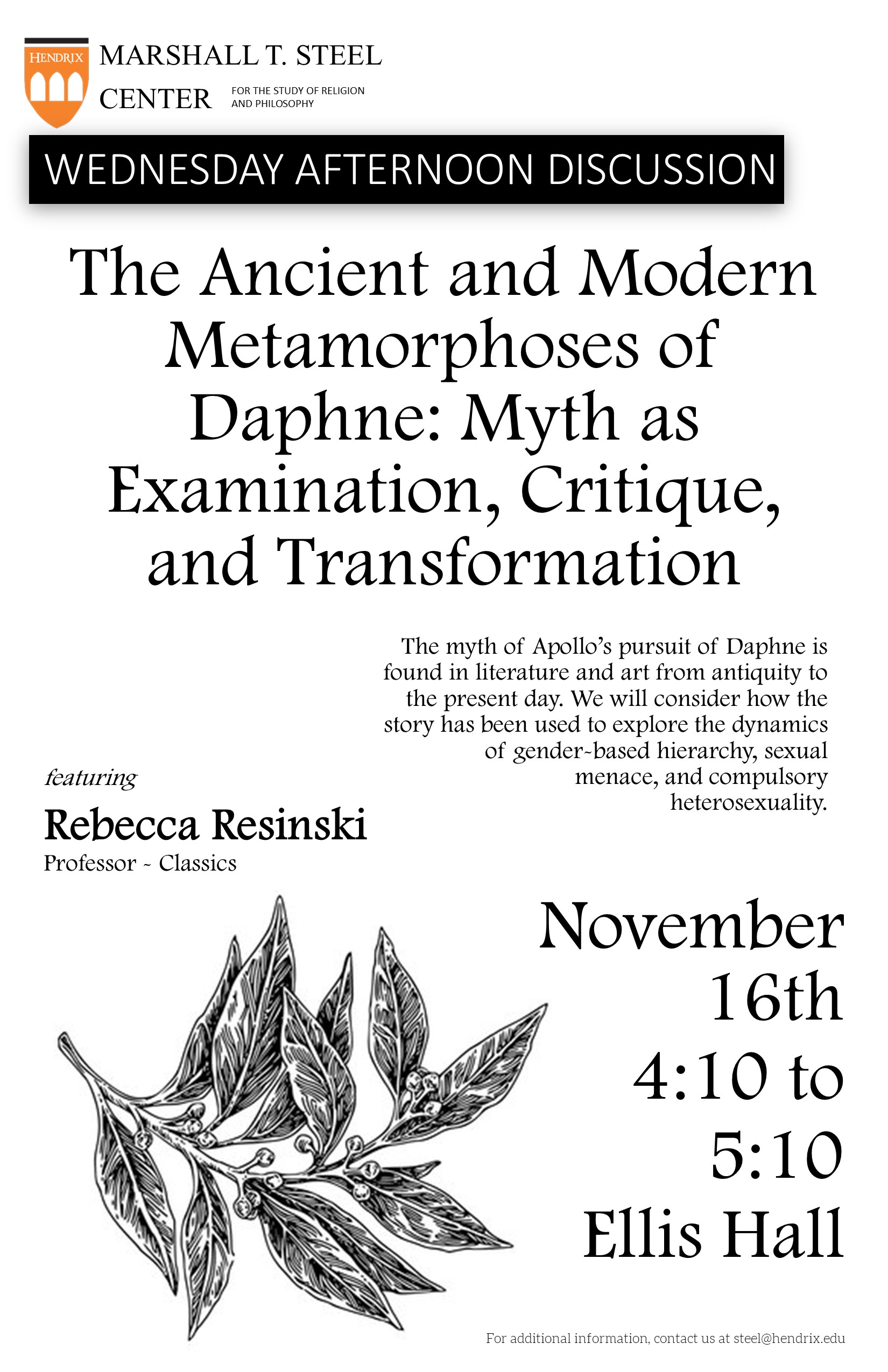
November 9th
Heteropatriarchal Desire in Authoritarian Politics featuring Nathan Duford, Assistant Prof of PHIL, PHIL Program Director – University of Hartford
Abstract
This talk explores how the conservative politics of masculinity has changed in recent years, developing a theory of heteropatriarchal desire that explains why the new conservative masculinity is an extension of traditional conservative masculinity.
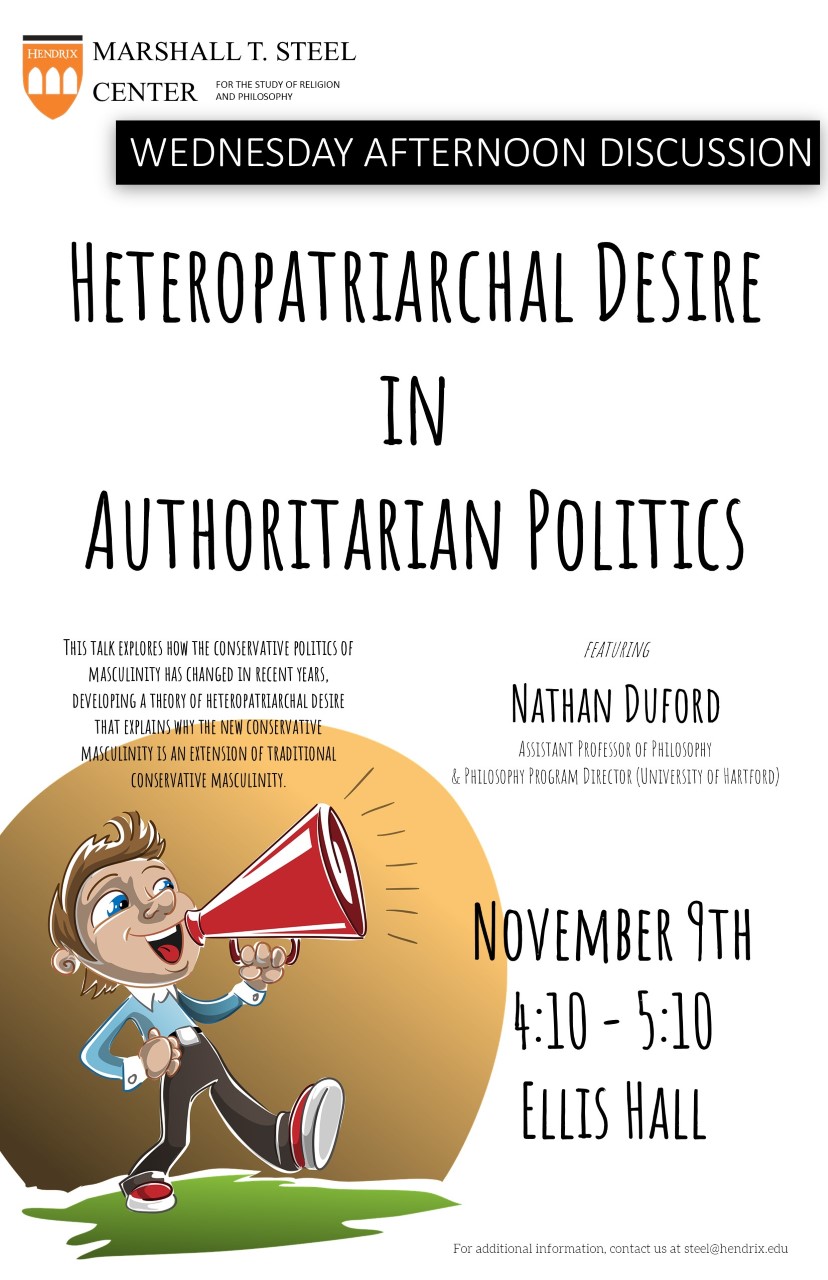
November 2nd
Why is “Does God exist?” a nonsensical question featuring Nathan Eric Dickman, Assistant Professor of Philosophy – University of the Ozarks
Abstract
In institutionalized philosophy of religion over the last forty years, the word “god” often is treated as a proper name. Yet we know that (most) gods have personal names, such as Vishnu, Marduk, HaShem, etc. The word “god” is not a name but a title, appropriately positioned on the predicate rather than the subject side of complete thoughts. Thus, the question “Does God exist?” is nonsensical. A better question is, “Who (or what) is my god?” I will discuss elements of this rejection of institutionalized philosophy of religions, and promote a semantics of transcendence rather than a metaphysics of transcendent entities. I discuss this in a chapter in my recent book with Bloomsbury, titled Philosophical Hermeneutics and the Priority of Questions in Religions. https://www.bloomsbury.com/ca/philosophical-hermeneutics-and-the-priority-of-questions-in-religions-9781350202146/
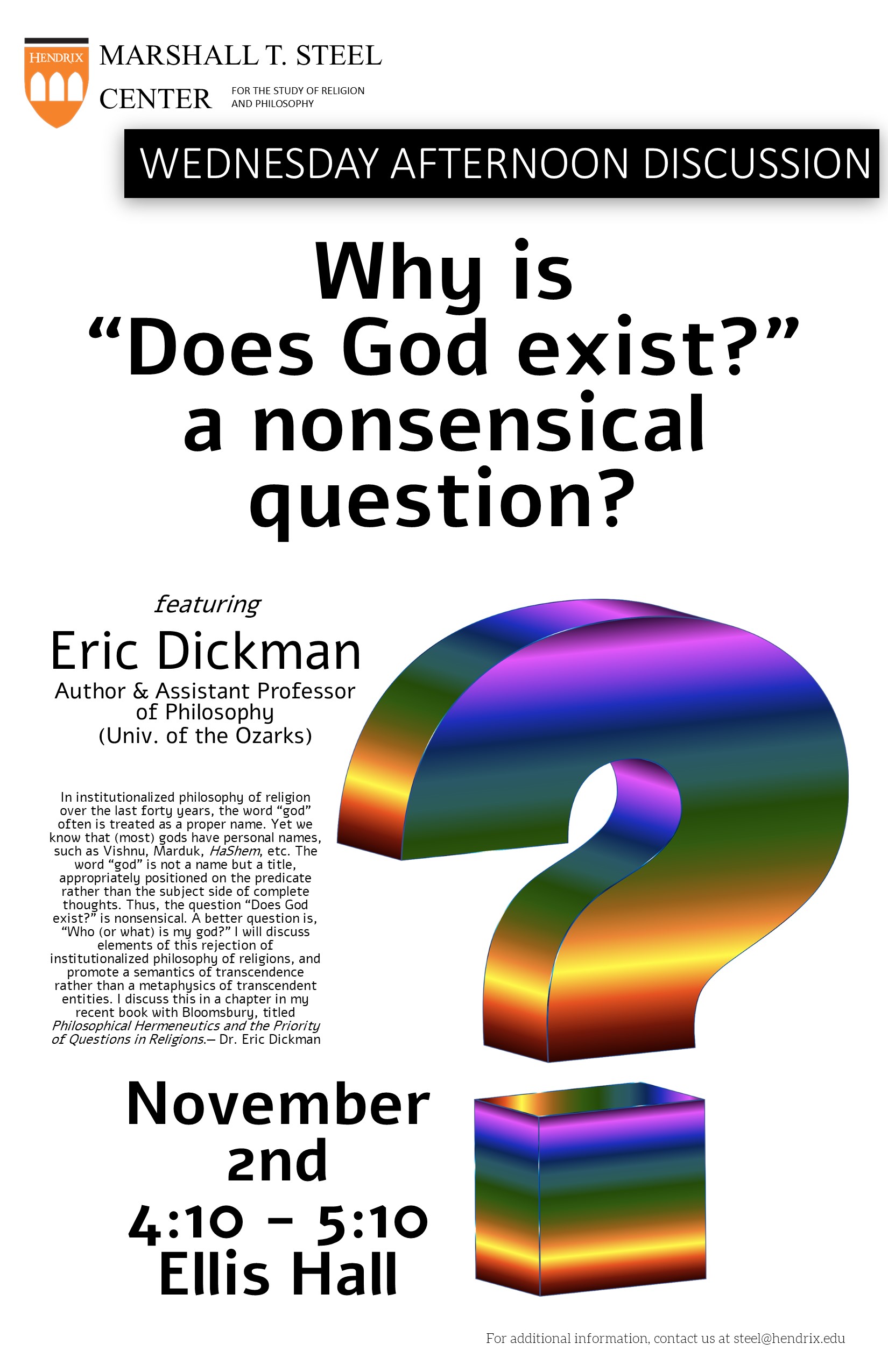
October 26th
Evaluative Pluralism and Devotion featuring Visiting Scholar, Dr. Paul Katsafanas, Boston University Professor of Philosophy and Director of Graduate Studies
Abstract
Reasonable people can always find some grounds for questioning their values. Can we remain devoted to our values while acknowledging this fact? Or does this undermine our values? Does devotion to values in a pluralistic world require dogmatism? Help us welcome Dr. Katsafanas, Boston University Professor of Philosophy, Director of Graduate Studies, to campus. All are welcome and refreshments will be served.
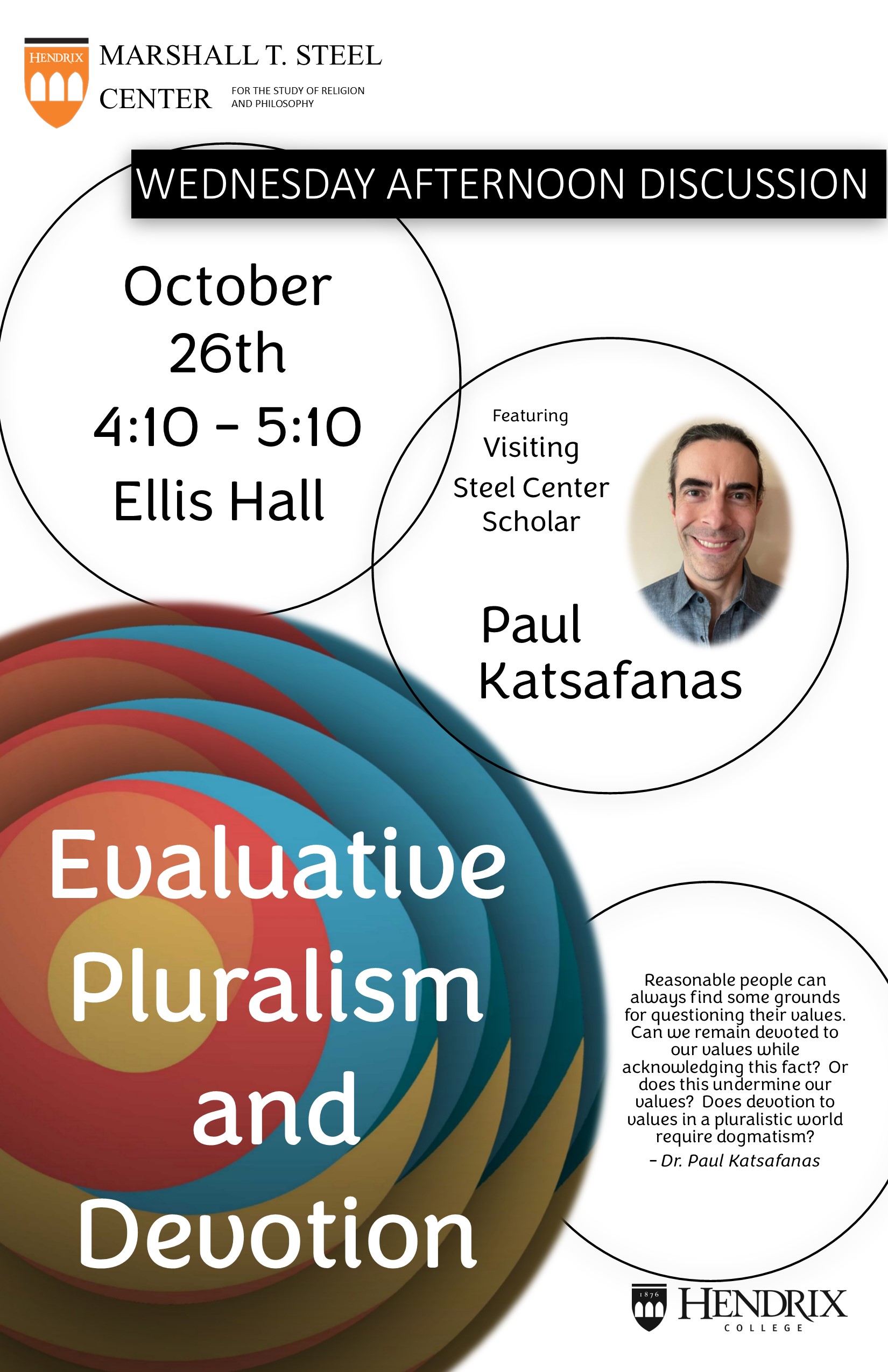
October 19th
"Taking Your Drugs Well": Healing, Faith, and Anti-Retroviral Adherence in a Nairobi Clinic, featuring Emmy Corey, Instructor of Religious Studies
Abstract
This discussion draws on ethnographic fieldwork in Nairobi, Kenya with adolescents and young adults living with HIV. After a few stories from this research, we’ll consider the ways that seemingly mundane activities like taking medication can take on theological texture. How does “taking your drugs well” become an existential, moral, and even spiritual practice?

October 5th
Jesus and the Canaanite Woman: Postcolonial and Feminist Insights, featuring Dr. Robert Williamson
Abstract
The story of Jesus and the Canaanite woman (Matthew 15:21-28) raises important questions about ethnicity, gender, and colonialism in the biblical text. We will engage in a close reading of the text together, seeking insights especially from feminist and postcolonial perspectives.
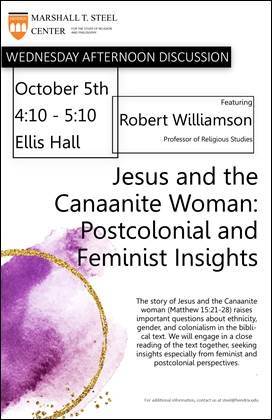
September 28th
Energy and Change: A Philosophy of Energy Transformation, featuring Dr. Clayton Crockett, Professor and Director of Religious Studies at University of Central Arkansas
Abstract
This presentation introduces a philosophy of energy based on dynamic transformation of material form across multiple levels of existence. Everything changes, even though energy is conserved, in physics, biology, ecology, and religion.
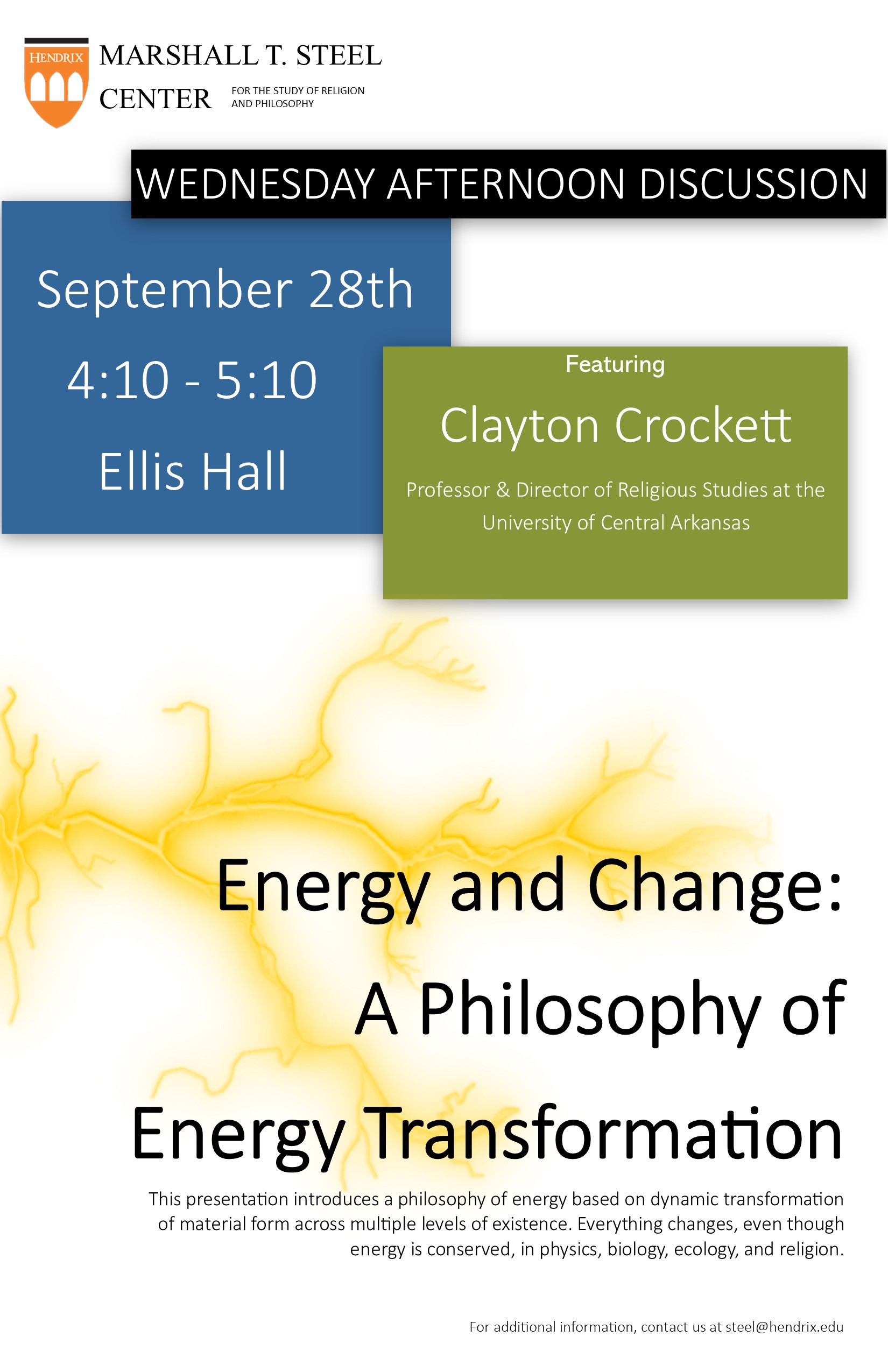
Friday, September 23rd
Expressing Nature’s Value
Abstract
Can we express the value of nature? Experiences of natural environments involve perceptions of the beauty of a flower, the sublimity of a tornado, the wonder of the starry sky. Some theorists have suggested that the value of nature outstrips artistic expression, that there’s always some color, some sound, some movement, or some power missing in attempts to represent nature. However, landscape artists have employed a variety of strategies for trying to capture the beauty, sublimity, and wonder of nature. Expressing Nature’s Value aims to highlight how there are diverse strategies in landscape painting that can be employed to highlight the value of nature. The Steel Center for the Study of Religion and Philosophy in Ellis Hall welcomes you to explore those strategies through the works of three artists from across the country that each create landscape works. Shannon Evans, Ginger Knowlton, and Cydney Williams each have two pieces in the Expressing Nature's Value exhibition. Expressing Nature’s Value will run for a year in Ellis Hall and the opening will be held from 4 pm to 5:30 pm on Friday, September 23rd in the Ellis Hall Living Room.
![]()
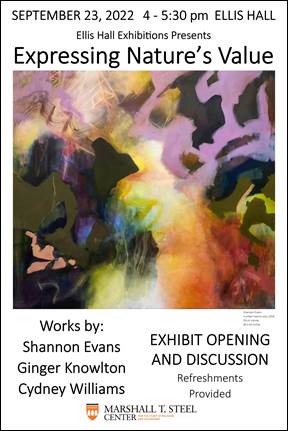
September 14th
Horrific Queers in Cinema, featuring Celeste Reeb, Assistant Professor of English, Film, & Media Studies at Hendrix College
Abstract
In James Whale’s 1935 film The Bride of Frankenstein, Dr. Pretorius exclaims “To a new world of Gods and Monsters” and brings to life the image of queerness as monstrous. In this talk, we will examine the ways the horror film genre uses anxiety regarding sexuality to create monsters. Horror depends on evoking fear and an ever-present threat is a character who threatens the stability of heterosexuality. While the image of queerness as monstrous is historically present so are queer horror audiences who find different meanings in the images. In this talk we will also consider how queer horror films opens a space for transgression and delights.


September 7th
Embrace Unrequited Love, featuring Alexandra Gustafson, University of Toronto Department of Philosophy
Abstract
If you have ever loved unrequitedly, then you know that it is a bitter experience indeed. In this talk, I'll argue that it can be made bitter-sweet if we simply embrace it. Why embrace unrequited love? For one very good reason: it is sublime.

Summer News!
Happy Summer students, faculty, and staff! It has been a successful year of events and programming largely thanks to your thoughtful participation. We appreciate every attendee, contributor, and the perspectives they add to our events. If you would like a piece of the Steel Center to take with you this summer, we are currently accepting students for a new reading group. The book is by David Livingstone Smith titled, Less than Human: Why we Demean, Enslave, and Exterminate Others. Less than Human is the first book of its kind to discuss and theorize why we sometimes think of others as subhuman. Using history, evolutionary psychology, biology, anthropology, and philosophy, David Livingstone Smith provides a coherent interdisciplinary account of what dehumanization is, how it's used, and how to deconstruct it. The Steel Center will have dinner and discussion in the fall to discuss students' thoughts on the book, so be sure to grab a copy during finals week for summer reading! Email steel@hendrix.edu for more details!
Spring 2021 Schedule
April 18th
The Phenomenology of Natural Engagement, featuring Anna Claire Lawrence, Hendrix '22 leading the discussion
Abstract
The field of nature aesthetics has seen a long debate on the topic of aesthetic appreciation and enjoyment with the landscape. The proper methods of appreciation, concerns of objectivity, and defining natural environment are all at the forefront of the discussion and ask us to consider our philosophical and aesthetic attitudes towards nature. With these considerations in mind, I created an Odyssey project that centers on the works of Arnold Berleant and phenomenological nature experiences. This Wednesday afternoon discussion will highlight these experiences and put them into conversation with the philosophies of Arnold Berleant and other aesthetic thinkers and invite participants to consider their own perspectives on how we should engage with the natural world.
.jpg)
April 13th
‘Like Loving a Lovely Sight’: Knowledge and Action in Chinese Philosophy, featuring Visiting Scholar, Dr. Bryan Van Norden, James Monroe Taylor Chair in Philosophy at Vassar College (USA), and Chair Professor in the School of Philosophy at Wuhan University (China)
Abstract
The Confucian classic the Great Learning states that one must hate evil “like hating a hateful odor” and love the good “like loving a lovely sight.” In this presentation, I unpack the cognitive content of these metaphors and explain what role they played in Chinese debates over the relationship between moral knowledge and moral action. In particular, I explain how the great Confucians Zhu Xi and Wang Yangming appealed to the same metaphors in their argument over whether weakness of will is possible.
Zoom option available, email steel@hendrix.edu.
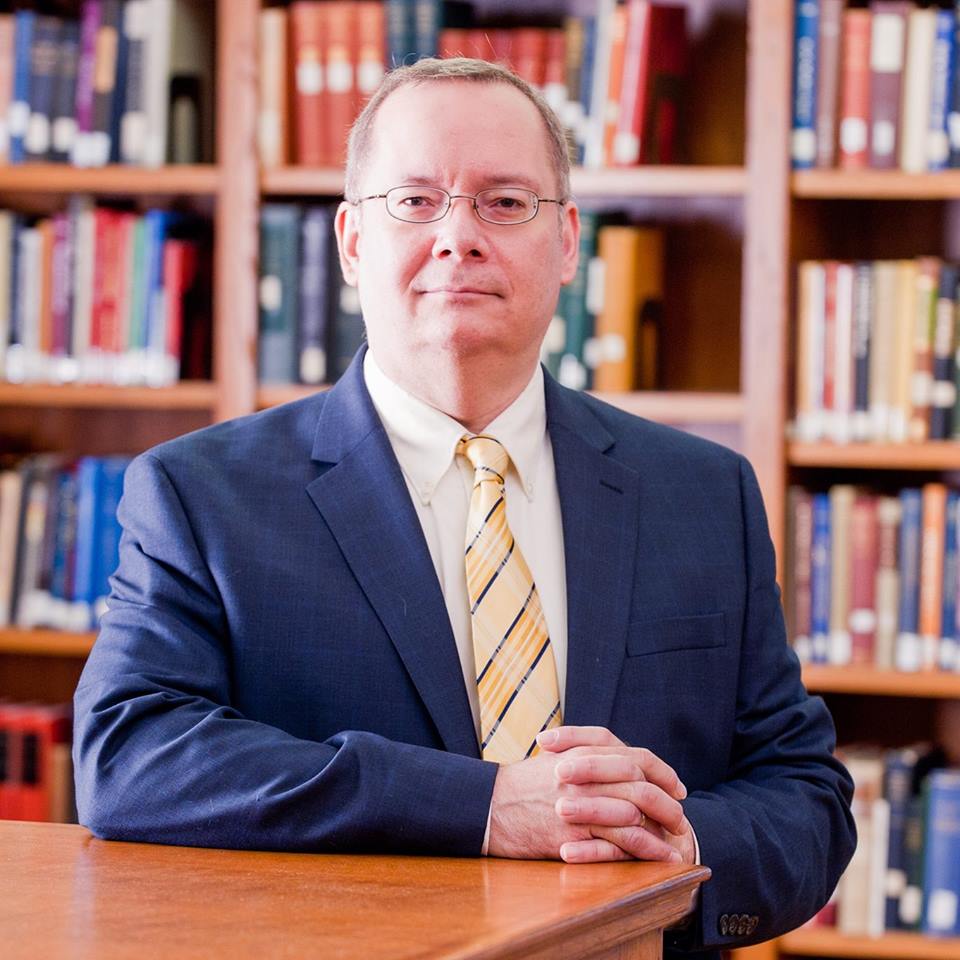
April 6th
What are you Afraid of? The Roles of Collective Fear and Personal Fear in Motivating Prosocial Behavior, featuring Carmen Merrick, Assistant Professor of Psychology
Abstract
Recent research suggests that COVID-19 fear predicts self-reported prosocial behaviors (Cole & Merrick, unpublished; Harper et al. 2020). This phenomenon has not been examined experimentally, nor has the impact of collective fear (fear extending beyond the self) been distinguished from personal fear (fear impacting only the self) on prosocial behavior. We conducted a study in which we compared the effect of COVID-19 fear (a collective fear) with personal fear on real prosocial behavior (charitable giving).
.jpg)
March 16th
The Centrum of Being and the Unground: Schelling and the System of Freedom, featuring Christopher Satoor, York University (PhD candidate)
Abstract
Friedrich Wilhelm Joseph Schelling’s (1775-1854) 1809 Freedom Essay was his last known publication at the young age of 34 years. The Freedom Essay has the reputation among scholars as being extremely cryptic and difficult. However, this text represents the beginning of Schelling’s mature philosophical project, and a systematic presentation of freedom and the revelation of God. Schelling’s aim in this short essay was to spiritualize Spinozism, remove the baggage of determinism, and reanimate the theory of pantheism, by returning life; and the living back to God and the cosmos. This was no easy task for Schelling, as it would send him face first into the metaphysics of evil and unraveling the foundations of the absolute. At the heart of the essay is its mystical and theosophical disclosure of Jacob Boehme (1575-1624) and Franz von Baader (1765-1841). Schelling appeals to Boehme’s unground as the bond of forces, or “the ground that comes before all ground.”(Schelling, SWI, VII, 406-408). Schelling also uses the Baaderian centrum that is developed deep in the well of being and is the heart of spirit. It is this center that ontologically individuates a subject. The center is formed and binds an agent by their ontological and primordial decision. The de-cision is always an act of pure will. The essay’s guiding thread through its deep philosophical investigations are to tease out the antagonisms of freedom by showing the deep bond between darkness and light, love and wrath, good and evil, individual and ego, center, and periphery; and the releasement of love. My presentation aims at disclosing the following themes by unpacking these difficult Schellingian concepts through his speculative metaphysics. The Freedom Essay’s greatest achievement is that it becomes the first philosophical system in German Idealism to ground freedom ontologically.
.jpg)
March 9th
Buddhism, Animals, and the Environment, featuring Jim Deitrick, Associate Professor (Department of Religion and Philosophy, UCA)
Abstract
In this talk, Dr. Deitrick discusses Buddhist attitudes toward animals and the environment, concentrating especially on animal consumption and its effects--on animals, on humans, and on the environment. Through this discussion, Dr. Deitrick will also introduce core Buddhist teachings and thus provide a basic introduction to Buddhist life and practice.
.jpg)
March 2nd
Leibniz and China: Metaphysics of Reason, Categories of the Ultimate, and Binary Arithmetic, featuring Dr. Nick Brasovan Associate Professor of Philosophy (UCA)
Abstract
Gottfried Wilhelm Leibniz is a monumental theologian, philosopher and mathematician. His intellectual endeavors were not only summative. They were creative and precipitous of great advances in theology, philosophy and science. Leibniz is cosmopolitan in the sense that he was on the cutting edge of the theologies, philosophies and sciences of his day. Speaking to Leibniz's creative advance of theology, philosophy and science and his wealth of informative resources, this presentation focuses in on his access to and interpretation of neo-Confucian philosophy, conveyed to him by correspondences with Jesuit missionaries in China. We will demonstrate that he had an astute understanding of the Chinese metaphysics of his time, but he ultimately projected concepts onto Chinese philosophy that were more reflective of his cultural biases than of the Chinese systems in their own rights. This will give us occasion to introduce key concepts and texts of neo-Confucian metaphysics. Finally, we will conclude with an argument that Leibniz's discovery of binary arithmetic is heavily indebted to his study of classical Chinese numerology and the Book of Changes.
.jpg)
February 21st
All Dressed Up in Fairy Lights: Queering Divinity in Doom Patrol, Featuring Michael Norton (Associate Prof.) & Jana McAuliffe (Assistant Prof.) of UA Little Rock
Abstract
Comic books (or more broadly: sequential art) have often served as a kind of imaginative laboratory for experimenting with the possibilities of human self-understanding. Likewise, superhero figures—with their extraordinary powers and lofty ideals—function as literary representations of gods, through which readers can explore the ins and outs of existing theological concepts. But comics can also be a means for artists and readers to question, problematize, and subvert traditional understandings of divinity. Some of the best examples of such an approach are found in Doom Patrol, a comic series (recently adapted into a TV show) with a long history of challenging cultural norms and embracing queerness. Utilizing resources from queer theory to examine the characters Larry Trainor and Danny the Street, we suggest that Doom Patrol productively queers the idea of divinity, blurring traditional boundaries between God and world, humanity and divinity, and male and female, and endorsing multiplicity, fluidity, and immanence.
.jpg)
February 16th
Heroic Contributions: Horrific Challenges- Psychological Science, Ethics, and Consequences, Featuring David Hawkins, Visiting Instructor of Psychology (Hendrix College)
Abstract
A celebration of select early black Psychologists’ contributions to the field, including research, key testimony in the Supreme Court case of Brown versus the Board of Education, and the early and pointed critique of racist assumptions in the conduct and interpretation of much psychological "science." Challenges continued as these assumptions (prejudices) continued and influenced other areas of medical “research” and clinical fields in ways that lead to unethical and/or prejudicial practices. The impact of these ethical lapses continues to negatively impact the health of black communities. Specific reforms and the self-correcting nature of science aids progress in ethical research practices. Also, reforms in related fields seek to write a different future that celebrates the heroic contributions of black scientists while acknowledging the continuing legacy of mistrust and its consequences, engendered by the unethical and/or prejudicial practices of persons in various scientific and medical fields.
.jpg)
February 9th
Rejecting Retributivism: Free Will, Punishment, and Criminal Justice
Featuring:
Gregg D. Caruso is Professor of Philosophy at SUNY Corning, Visiting Fellow at the New College of the Humanities (NCH London), and Honorary Professor of Philosophy at Macquarie University. He is also Co-Director of the Justice Without Retribution Network housed at the University of Aberdeen School of Law. His research focuses on free will, moral responsibility, punishment, philosophy of law, jurisprudence, social and political philosophy, moral philosophy, philosophy of mind, moral psychology, and neurolaw. His books include Rejecting Retributivism: Free Will, Punishment, and Criminal Justice (2021), Just Deserts: Debating Free Will (w/Daniel C. Dennett) (2021), Free Will and Consciousness: A Determinist Account of the Illusion of Free Will (2012), Exploring the Illusion of Free Will and Moral Responsibility (2013), Science and Religion: 5 Questions (2014), Neuroexistentialism: Meaning, Morals, and Purpose in the Age of Neuroscience (co-edited w/Owen Flanagan); and Free Will Skepticism in Law and Society (co-edited w/Elizabeth Shaw and Derk Pereboom).
Abstract
One of the most prominent justifications of legal punishment, historically and currently, is retributivism, according to which wrongdoers deserve the imposition of a penalty solely for the backward-looking reason that they have knowingly done wrong. While retributivism provides one of the main sources of justification for punishment within the criminal justice system, there are good philosophical and practical reasons for rejecting it. The dual aims of this talk will be to argue against retributivism and develop a viable alternative that is both ethically defensible and practical. After sketching six distinct reasons for rejecting retributivism, two of which have to do with the possibility that agents lack the kind of free will and moral responsibility needed to ground retributive punishment, Dr. Caruso will introduce his public health-quarantine model, a non-retributive alternative for addressing criminal behavior that draws on the public health framework and prioritizes prevention and social justice. He will argue that the public health-quarantine model is not only an ethically defensible and practically workable alternative to retributive punishment, it is more humane than retributivism and preferable to other non-retributive alternatives.
.jpg)
November 17th
Wednesday Afternoon Open Discussion: Existence, Knowledge, and Values
Abstract
Any topic in the academic study of philosophy and religion is open for discussion.
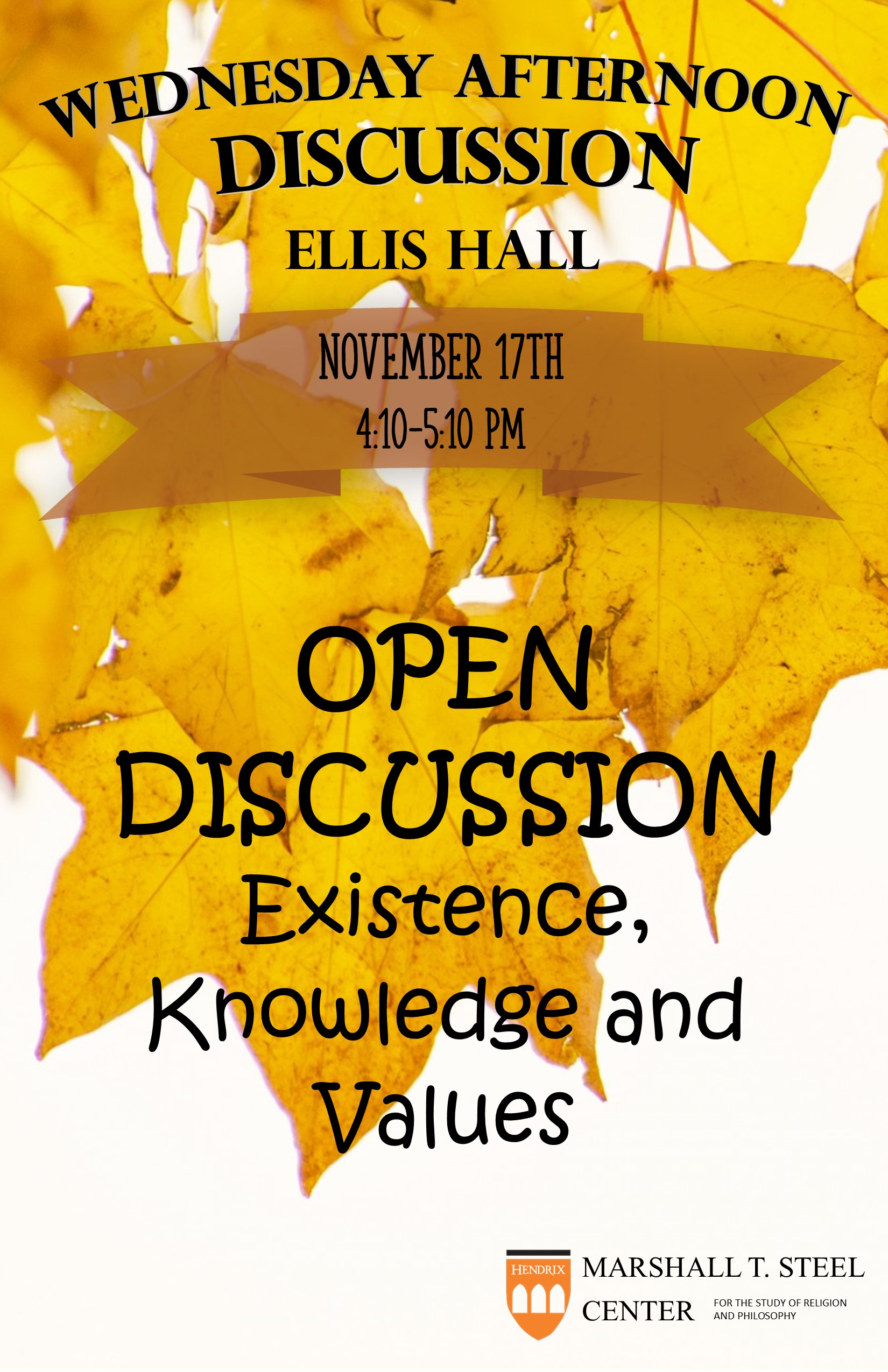
November 10th
On Liking Aesthetic Value Steel Center Wednesday Afternoon Discussion, Featuring Visiting Steel Center Scholar, Dr. Keren Gorodeisky, Author & Professor of Philosophy (Auburn University)
Abstract
We often describe our responses to films, novels, songs, landscapes, walks, meals and other aesthetically valuable objects and activities in terms of feeling: we “hate” or “love” them, “admire,” “enjoy” or “detest” them, or find that they “leave us cold.” Most often, we communicate our aesthetic responses in terms of our likes and dislikes. A long tradition has a succinct explanation of this way of speaking: aesthetic value is essentially connected to a distinctive kind of liking or pleasure. Is that true? Should we endorse a necessary connection between aesthetic value and liking or pleasure? This is The Affective Question, which frames this Virtue Conversation.
Zoom info available by emailing steel@hendrix.edu
Click the Steel Center Lectures and Special Events tab on the right of the page for additional events with Dr. Gorodeisky.
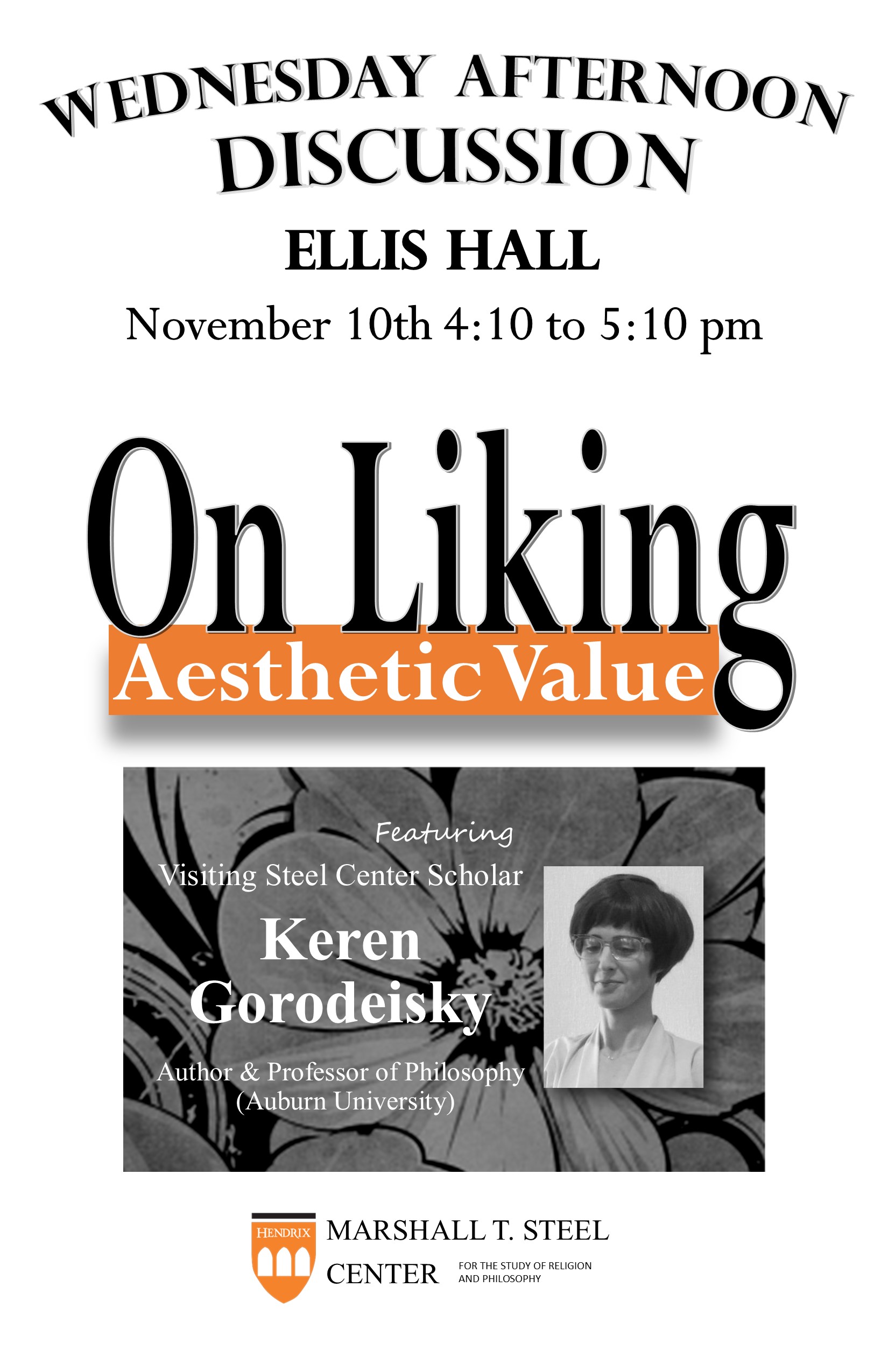
October 27th
A Social Theory of Humor, Featuring Elizabeth Cantalamessa, PhD Candidate, Philosophy (University of Miami), Instructor (Univ. Houston-Downtown & The Univ. of Wyoming)
Abstract
Humor is weird. It’s not clear what purpose it serves, or how it ever came about. Wittgenstein pointed out that laughter itself might look bizarre from an outside perspective - one person says some unusual words, and then another breaks out into a strange kind of bleating. Philosophers have offered accounts of humor aimed at explaining why we laugh, and how the practice emerged. In this talk, I’ll lay out the main theories philosophers have given, and argue that they fail to dispel the mysteries surrounding humor. Then I’ll suggest a new way of looking at the point of laughter - it allows us to acknowledge and reshape the norms we live by.
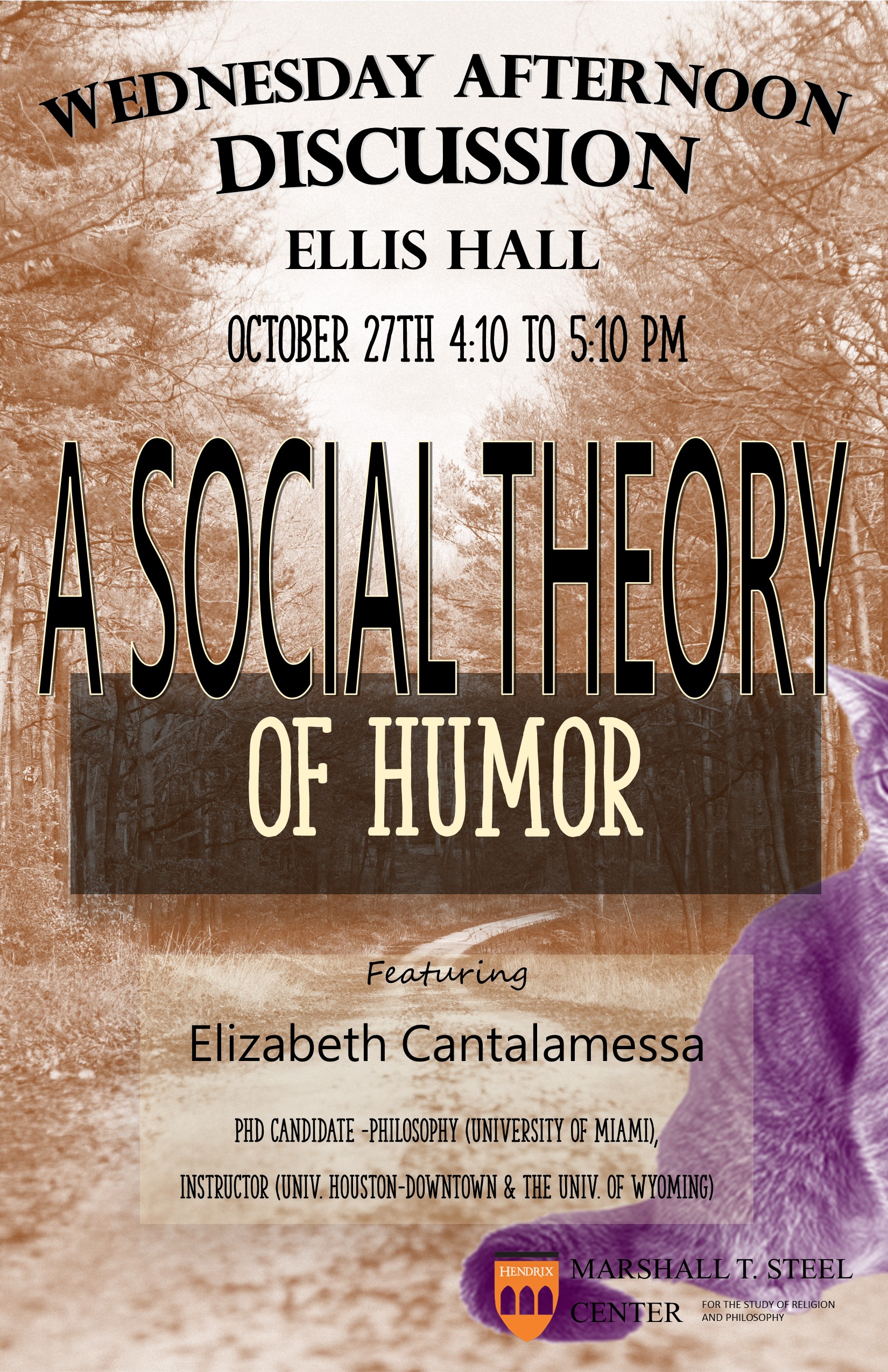
October 6th
America on Jericho Road: A Conversation about Neighbors and Compassion , featuring Phillip D. Fletcher, PhD – Exec. Dir. Of City of Hope Outreach (COHO)
Abstract
The tensions in America are great. Individuals and families from a variety of backgrounds are experiencing a personal internal conflict or interpersonal conflict. The context in which we live is fraught with difficulties. Compassion represents a very human and deep activity which places an individual in the storm of another individual's experience. We are traveling on a difficult road and we will be afforded the experience to demonstrate compassion to the other. Who is our neighbor today? How are we to respond? What will it cost us?

September 29th
Care Ethics in the Time of COVID: How AAPI Activists are Mobilizing Political Care , featuring Taine Duncan, Assoc. Prof of PHIL, UCA
Abstract
Care ethics has often been criticized for being essentialist, sanitized, or uncritical of the power relations which undergird the relations of interdependency that guide care ethical behavior. In the past year and a half, however, practitioners in nursing, mental health, political science, and education have begun critically engaging care ethics as the best ethical response to the pandemic. Because care ethics allows us to evaluate disparate impacts, showcases the responsibilities we have to one another, and emphasizes the impossibility of universal solutions, care ethics is a responsive ethical framework in a time of global health crisis. At the same time, members of Asian American and Asian American/Asian Pacific Islander communities have been deploying a form of activism which relies on care ethical principles of interdependence and mutual obligation --while challenging unequal power and privilege on display during racist violence sparked by politicization of COVID-19. How might we examine these two prongs of care ethics applications in the contemporary context? What might an intersectional understanding of care ethics provide to our practical capacity for social change and collective well-being? This presentation examines the intersection and argues that AAPI activism is an excellent model for intersectional, applied, and responsive care ethics.

September 22nd
Rethinking Standpoint Epistemology: From Epistemic Injustice to Situated Knowledge , featuring Sharon Mason, Assist. Prof. Of PHIL, UCA
Abstract
Standpoint theory describes how social location influences the generation of knowledge. I develop an account of standpoint theory that avoids some well-known objections and clarifies its relation to recent work on epistemic injustice.

FRIDAY, September 17th
Nature in Abstraction (discussion & exhibit opening): featuring Dr. Melissa Gill (Hendrix College), Dr. Dustyn Bork (Lyon College) & Dr. Jessica Mongeon (Arkansas Tech University)
Nature in Abstraction includes 6 works from artists Jessica Mongeon, Melissa Gill, and Dustyn Bork. Each piece engages with the theme of abstraction from nature in different ways. Please join us at 4:10 pm for panel discussion and gallery walkthrough at 5:10.
.jpg)
September 8th
Country Music and the Aesthetics of Simplicity , featuring John Dyck, Teaching Fellow in Aesthetics & PHIL (Auburn)
Abstract
In this paper, I consider the aesthetic value of country music. I argue that the value of country music, like the value of other genres, lies in its simplicity: country songs are often good precisely because they are simple, unsophisticated, and unsubtle. I explain what this means, and I explore what this implies for aesthetic value in general. In emphasizing the aesthetic values of subtlety and sophistication, philosophers have forgotten about the value of simplicity.

September 1st
Religious Inclusivity in Higher Education and the Hermeneutic Priority of Questions in Religions , featuring Nathan “Eric” Dickman, Assist. Prof of PHIL Univ. Of the Ozarks
Abstract
How can religiously affiliated institutions that promote liberal arts maintain commitment both to religious inclusivity and their affiliation? What principles of accreditation should be used by agencies—such as the Southern Association of Colleges and Schools Commission on Colleges—in assessing religiously affiliated institutions? Many religiously affiliated institutions claim to value liberal arts learning and critical inquiry, to prepare students for a diverse world. Yet affiliation often brings with it pervasive structures of religious privilege that inhibit questioning and critical thinking, especially with regard to religious diversity. My proposal is that this is due, in large part, to suppressing questions prevalent in religions themselves (as I develop in my forthcoming book). I argue that questioning has priority in interpretation of religious texts, despite the propensity of religious leaders claiming to have all the answers. I will look at a few case studies in Jewish, (Zen) Buddhist, and Christian contexts to illustrate roles of questions both in the discourse of gods and buddhas themselves and in the process of interpretation of texts. By isolating and emphasizing the priority of questioning, we can identify one way in which religious affiliation can be compatible with liberal arts learning, and I use this to suggest two principles of inclusivity to use for assessing and accrediting religiously affiliated colleges and universities.
Links to forthcoming book (and article on higher ed):
https://www.bloomsbury.com/us/philosophical-hermeneutics-and-the-priority-of-questions-in-religions-9781350202146
https://rowman.com/ISBN/9781793638267 (chapter 10)
![Text
Description automatically generated]()
.jpg)
Spring 2021 Schedule
Wednesday, April 28th, 2021
"Aesthetic Sustainability and Intergenerational Environmental Aesthetics"
Natural environments are undergoing rapid change globally. Anthropogenic change becomes experienced for example in the form of changes in landscapes and weather conditions. In environmental aesthetics, this change has been examined through recognizing a break in how we experience or assess environments and what we know of them and the reasons behind the change. Anthropogenic environmental change is thus approached through changes in the perceivable, aesthetic qualities of environments. However, also more nuanced understanding of the process of the change in values themselves is needed. This talk will present the concept of aesthetic sustainability and discuss how it is linked to the idea of intergenerational aesthetics. In philosophy, intergenerational thinking in general emphasizes taking into consideration the perspective of the future generations. Besides future human generations, decisions made today affect also the multitude of non-human species. As examples of friction between changing aesthetic values and the features of familiar environments, this talk will present some different types of traditional landscapes, that are undergoing significant change in how they are valued. This will illustrate the idea that some values sustain while others change from one generation to another.
.jpg)
Wednesday, April 21st, 2021
"Secular Adaptations of Buddhist Meditation Practices: Mindfulness, Emotional Balance and Compassion"
In recent years there has been an increasing interest in meditation. In response to this, numerous secular meditation programs have been developed that draw their inspiration from traditional Buddhist meditation practices. In this presentation, Dr. Gitchel will give a basic overview of this trend and will highlight three areas that have been targeted in secular meditation programs: Mindfulness, Emotional Balance and Compassion Cultivation. An overview of these topics will be presented, including brief descriptions on how they are defined and cultivated and how they relate back to traditional Buddhist concepts. Three short experiential exercises will be imbedded in this presentation, and there will be an opportunity for questions.
.png)
Wednesday, April 7th, 2021
“Creativity in Creation”
“In this paper, I highlight several ways in which the world-actualization model of creation (WAM) is in tension with divine creativity. First, I introduce three types of creative thought processes described by Margaret Boden and argue the God of WAM fails to exhibit any of them. Next I explore ways to ease the tension between divine creativity and the world-actualization model. I then consider potential transformations of WAM that might be friendlier to divine creativity, but conclude that it is difficult to maintain divine creativity in conjunction with WAM. Finally, I offer three desiderata to keep in mind in the search for a creative model of creation.” – Dr. Meghan Page

Wednesday, March 31st, 2021
“Games and Gamification”
If we understand why games are great, we’ll understand why gamification is terrible. Games give us the pleasures of value clarity, by giving us a temporary world where our purposes are clear, and our abilities fit our goals. Gamification promises us that pleasure in the real world – by changing and simplifying the goals of our real-life activities.
.jpg)
Previously This Year
Steel Center Visiting Scholar Dr. Reggie Williams to Speak at Two Online Events, March 17 and 18
Hendrix College welcomes expert on Dietrich Bonhoeffer
CONWAY, Ark. (March 9, 2021) — The Marshall T. Steel Center for the Study of Religion and Philosophy at Hendrix College welcomes Reggie Williams, Ph.D., associate professor of Christian ethics at McCormick Theological Seminary, as its Steel Center Visiting Scholar for 2021. His visit will occur remotely due to COVID-19 restrictions; nevertheless, he will speak at two Hendrix-based events, both of which are free and open to the public:
· Wednesday Afternoon Discussion/Virtuous Conversations Series, 4:10 to 5:10 p.m. CDT: “Learning to Be Troubled: Dietrich Bonhoeffer’s Experience in Harlem”
· Steel Center Lecture on Thursday, March 18, 2021, 7:15 to 8:15 p.m. CDT: “What Killed Dietrich Bonhoeffer?”
Dr. Williams’ book Bonhoeffer’s Black Jesus: Harlem Renaissance Theology and an Ethic of Resistance (Baylor University Press, 2014) was selected as a Choice Outstanding Title in 2015 in the field of religion. The book analyzes German pastor and theologian Dietrich Bonhoeffer’s exposure to Harlem Renaissance intellectuals, and worship at Harlem’s Abyssinian Baptist Church, during his year of post-doctoral study at Union Seminary in New York, 1930-31. Williams will focus on this particular time in Bonhoeffer’s life, and how it influenced his resistance of the Nazi regime, for the content of the Wednesday Afternoon Discussion.
In addition to Bonhoeffer, Williams’ research interests include Christological ethics, theological anthropology, Christian social ethics, the Harlem Renaissance, race, politics and black church life. His current book project includes a religious critique of whiteness in the Harlem Renaissance. In addition, he is working on a book analyzing the reception of Bonhoeffer by liberation activists in apartheid South Africa.
Williams received his Ph.D. in Christian ethics at Fuller Theological Seminary in 2011. He earned a master’s degree in theology from Fuller in 2006 and a bachelor’s degree in religious studies from Westmont College in 1995. He is a member of the board of directors for the Society for Christian
Ethics, as well as the International Dietrich Bonhoeffer Society. He is also a member of the American Academy of Religion and Society for the Study of Black Religion.
While both events are free, pre-registration is required for access to the Zoom platform. Email steel@hendrix.edu by noon on the day of the event to make a reservation and receive event access.

Dietrich Bonhoeffer was the kind of German the Nazis considered ideal. Yet, he was also among the earliest German voices of opposition. Nazis became genocidal. How did Bonhoeffer see the evil, so early? He learned to be troubled by white supremacy, in New York,1930-31.
Wednesday, March 10th, 2021
Hegel’s Concept of Life
In the Western philosophical tradition, there are few who rival Hegel’s status as an arch-rationalist, for whom reason rules the world. Although this reputation is not entirely unfounded, I contend that many have overlooked the basis of Hegel’s rationalism, namely, an organic conception of life. For Hegel, the activity of reason grows out of the activity of life, and there are even certain general features of living activity that have bearing on how we think about logic. Understanding the essential connection between life and reason offers a powerful way to rethink the significance of philosophical rationalism, and moreover, provides new insight into Hegel’s relationship to his contemporaries as well as his ongoing philosophical legacy. – Dr. Karen Ng
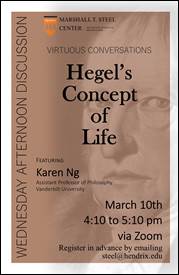
Wednesday, March 3rd, 2021
The Shape of Agency
The Shape of Agency develops, over the course of the book, views on control, non-deviant causation, intentional action, skill, and knowledgeable action. The result is, I hope, a satisfying picture of the shape of agency. In this talk I will offer a brief sketch of that picture, by introducing some of the main themes of the book and how they fit together.

Wednesday, February 24th, 2021
Religious Politics

Wednesday, February 10th, 2021
Video Games, Violence, and the Ethics of Fantasy: Killing Time
Many video games allow players to commit numerous violent and immoral acts, like sexual assault, theft, and murder. This begs the question, should players worry about the morality of their virtual actions? A common argument that gamers often use is that games offer merely the virtual representation of violence. It cannot be morally wrong to perform such acts because no one is actually harmed by committing a virtual act in a game. While this is an intuitive defense, it does not resolve the issue. Some representations in games are genuinely disturbing and invite moral revulsion. Video Games, Violence, and the Ethics of Fantasy approaches these issues by examining recent debates in philosophical aesthetics over the ethical criticism of works of art. Ultimately, video games are works of fiction that enable players to entertain a fantasy and a full understanding of the ethical criticism of video games must focus attention on why individual players are motivated to entertain immoral and violent fantasies. Indeed, video games raise a general and important philosophical question: is it ever morally wrong to enjoy fantasizing about immoral things?

Wednesday, November 18th, 2020
Steel Center Scholars Discuss Dehumanization
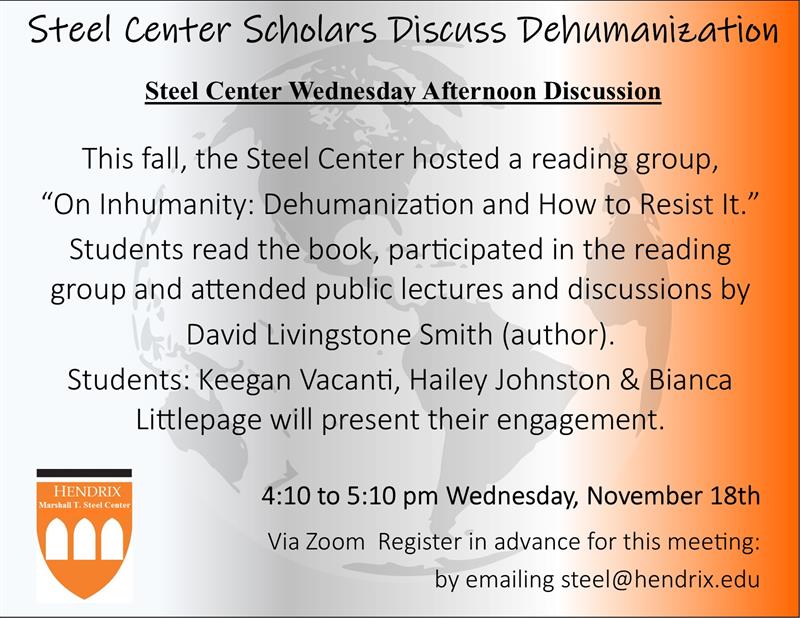
Wednesday, November 4th, 2020
“Winner-Take-All Democracy: The 2020 Election and Beyond”
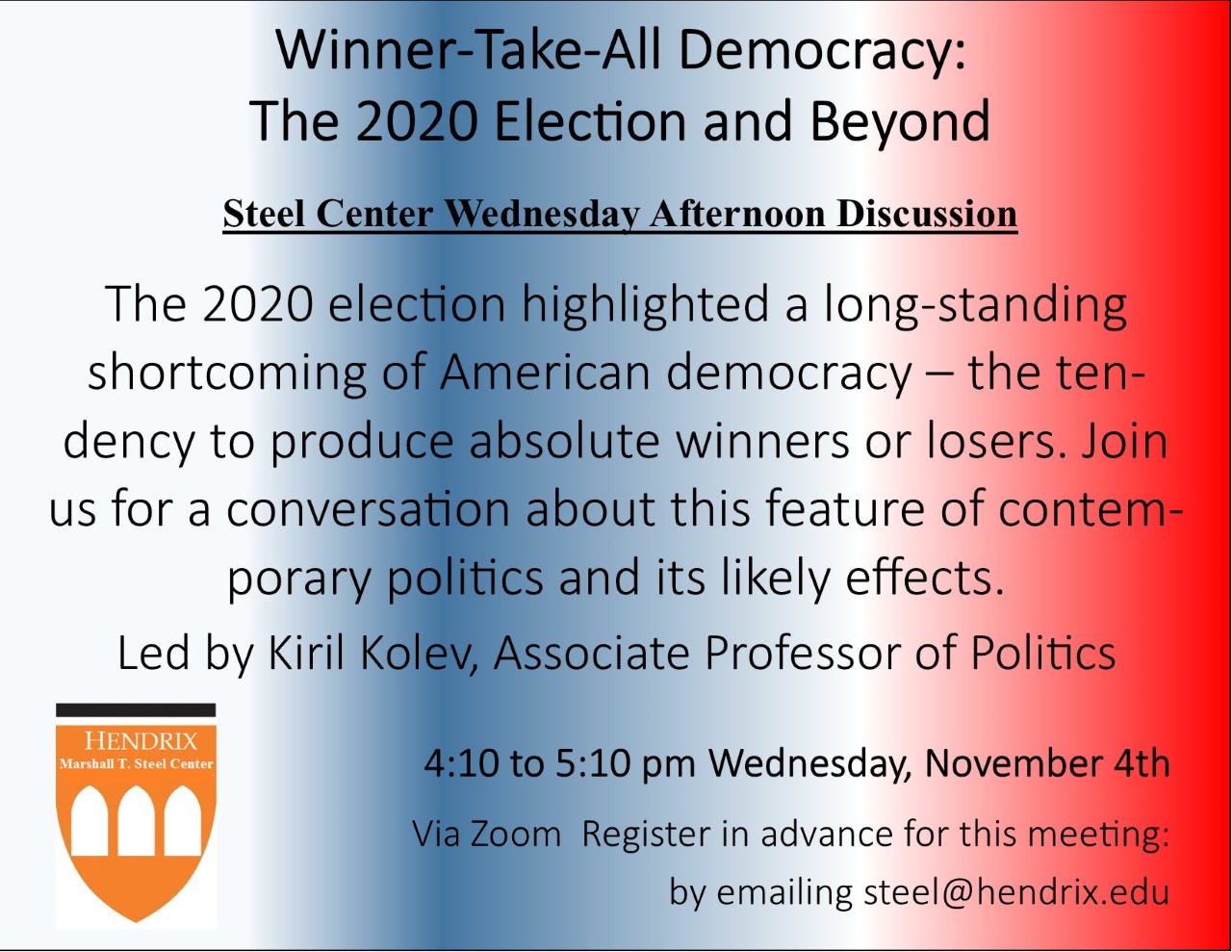
![]()
![]()
Wednesday, October 21st, 2020
What, if anything, is race?
Beliefs about race seep into almost every corner of our lives. But despite its pervasiveness and its implications for human lives, few of us ever pause to consider what, exactly, race is supposed to be. What are we talking about when we talk about race? In this conversation, I’m going to tease out the core elements of the ordinary conception of race. It’s the view of race that most of us just slip into when going about the everyday business of life. It’s a conception that we take so thoroughly for granted that don’t even question it. But to understand dehumanization we’ve got to open that Pandora’s box, because beliefs and about race lie at the heart of the dehumanizing process.

David Livingstone Smith is Professor of Philosophy at the University of New England in Biddeford, Maine. He has written or edited nine books, including Less Than Human: Why We Demean, Enslave and Exterminate Others (St. Martin's Press, 2011), which won the 2012 Anisfield-Wolf award for nonfiction and his latest book, On Inhumanity: Dehumanization and How to Resist It. His work has been translated into seven languages. David is an interdisciplinary scholar, whose publications are cited not only by other philosophers, but also by historians, legal scholars, psychologists, and anthropologists. He has been featured in several prime-time television documentaries, is often interviewed and cited in the national and international media, and was a guest at the 2012 G20 economic summit, where he spoke about dehumanization and mass violence.

Wednesday, October 7th, 2020
The Intersection of Race and Nature

Wednesday, September 30th, 2020
On the Ramayana: Unpacking the Most Influential Narrative Epic in Human History

Wednesday, September 23rd, 2020
J. G. Fichte and the Politics of Recognition
.jpg)
Wednesday, September 16th, 2020
Reflections on Change
.jpg)
Wednesday, September 11th, 2020
CYBORGS!
.jpg)
Wednesday, September 4th, 2020
Polarization in American Christianity
![]()
.jpg)
2019-2020 Schedule
Wednesday, April 1st, 2020
America on the Jericho Road: A Conversation about Neighbors and Compassion
The tensions in America are great. Individuals and families from a variety of backgrounds are experiencing a personal internal conflict or interpersonal conflict. The context in which we live is fraught with difficulties. Compassion represents a very human and deep activity which places an individual in the storm of another individual's experience. We are traveling on a difficult road and we will be afforded the experience to demonstrate compassion to the other. Who is our neighbor today? How are we to respond? What will it cost us?
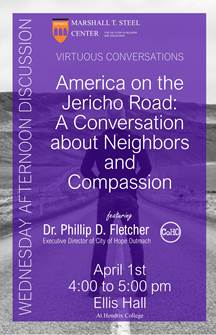
Wednesday, March 11th, 2020
The Case for Beauty: Theological Aesthetics for an Ecological Age
In Christian theology, natural beauty has occupied many roles, from comforting pilgrims on their earthly journey to offering a bridge to the divine. Come explore what role beauty might have today in a world of climate change and anxiety.
.jpg)
Wednesday, March 4th, 2020
Gratitude and the Good Life: Insights from Epicureanism
How can cultivating an attitude of gratitude about your life and the goods it contains help you to have a happier, more pleasurable life? The ancient Greek philosophy of Epicureanism suggests that regularly practicing gratitude has many benefits: It provides resources to cope more easily with setbacks and hardship; it encourages you to maintain a sense of perspective about your desires; and it helps you to come to terms with your inevitable death. More than that, it may make you a better friend and a more generous person in general. In this talk, I explore the roles for gratitude in Epicurean philosophy and how we might apply those lessons to our lives today.
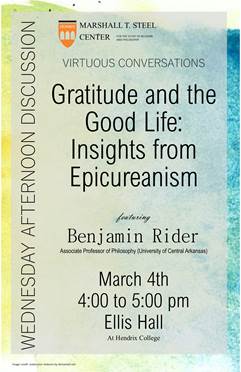
Wednesday, February 26th, 2020
What Do I Love When I Love the Earth? Religion and Emotion in the Anthropocene
As climate change forces us to reevaluate humanity’s place on the earth, we ought also to reimagine the religious and affective ways we relate to nature. How might our hopes and fears about the future of the planet change how we understand religion?
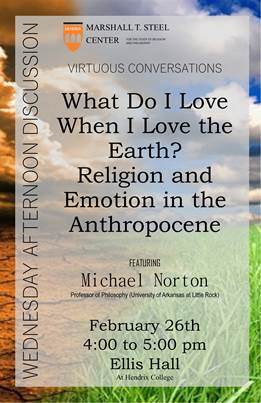
Wednesday, February 19th, 2020
Standing Up and Social Shaming in a Free Society
Today’s social media gives us great power to stand up publicly for our own values, a prized good in a free society. What happens, however, when it becomes popular to stand up for one’s position by publicly shaming others for theirs? Is this a good or bad thing for advancing free speech and should we care?
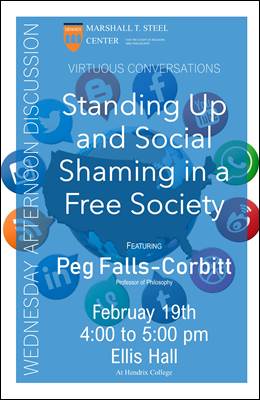
Wednesday, February 12th, 2020
Ecological Virtue and Vice in Chinese Buddhism
Ecological self-understanding is veridical recognition of human beings as embodied agents in the world, situated within interdependent relations between self and environment. I propose that ecological self-understanding is an epistemic virtue that can be identified in multiple wisdom traditions across cultures, including those found in Buddhism and its now global diaspora around the world. Here I will investigate to what extent this virtue is identifiable in East Asian Buddhism, with emphasis on forms of Buddhism in China. On the confirming side of this investigation, I will discuss how Buddhism's relational ontology and notion of dependent origination align with ecological self-understanding, and more specifically how Chan Buddhist understanding of karma in terms of transformative intentional agency is especially well-suited to the cultivation of ecological self-understanding. However, there are also relevant concerns that can challenge whether Buddhism in East Asia fully exhibits this virtue. For example, there are animal release practices (known as 'fangsheng' in China) that are performed with the intention of cultivating positive karma but which actually harm the environment, and the pursuit of transcendent salvation in some forms of Pure Land Buddhism stands in stark contrast with the embodied relationality that is central to an ecological understanding of one's presence in the world. With these considerations in mind, I conclude that East Asian Buddhism exhibits a spectrum of virtue and vice in relation to ecological self-understanding.
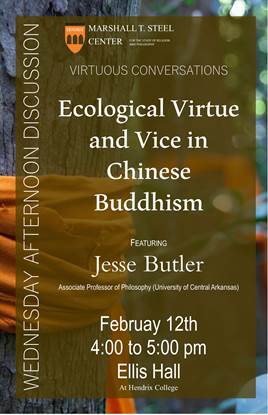
Wednesday, February 4th, 2020
Envisioning a Tibetan Luminary: Reflections on Fieldwork, Translation, and Interpretation of a (Possibly) Buddhist Biography
In this talk, Dr. Gorvine will share reflections upon his new book, Envisioning a Tibetan Luminary: The Life of a Modern Bönpo Saint, and discuss how the project reflected several different dimensions of experience and research in religious studies.

Wednesday, January 29th, 2020
Interfaith Community in America: Muslim and Christian Journeys
A Muslim and Christian discuss the dynamics of Interfaith community in America, as illustrated by the interfaith work of the Madina Mosque in Little Rock, AR.
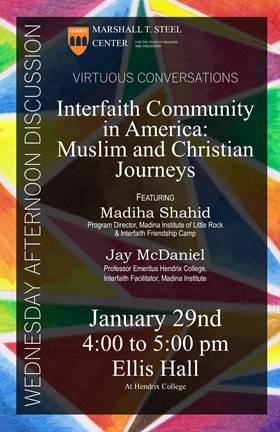
Wednesday, December 4th, 2019
Our Vision For Hendrix: The Liberal Arts for the 21st Century
Join us as Dr. Todd Tinsley, Dr. Jennifer Penner and Dr. Toni Jaudon discuss Hendrix College's future and where the Liberal Arts will go for the 21st century.
Led and facilitated by Dr. James Dow.
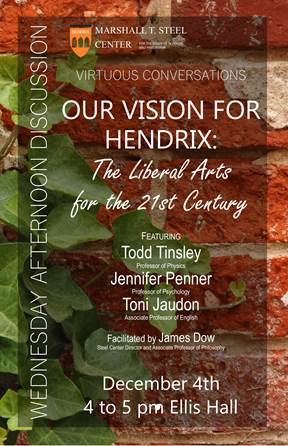
Wednesday, November 20th, 2019
Clean Air & Energy: A Turning Point
Our state and nation’s energy production is changing rapidly. Sierra Club Director, Glen Hooks gives an overview of how and why these changes are happening and discusses what it means for our future as we embrace solar and wind energy. His thesis: these changes are important and valuable enough that they will transcend partisan politics and radically transform our nation.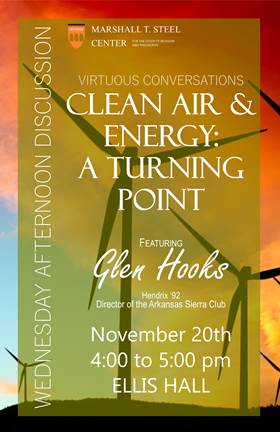
Wednesday, November 13th, 2019
Transformation Through Narratives: A Self-Retrospective Discipline
There is power in personal narratives. Narratives are essential to how we understand ourselves, make sense of the world, and give meaning to our lives. It ultimately leads to life transformation. Each person has many stories to share; stories we tell ourselves and others about our identity, our past experiences, and our anticipation for what the future will be. The speaker will share his own spiritual journey and challenge everyone to utilize their narratives to transform lives.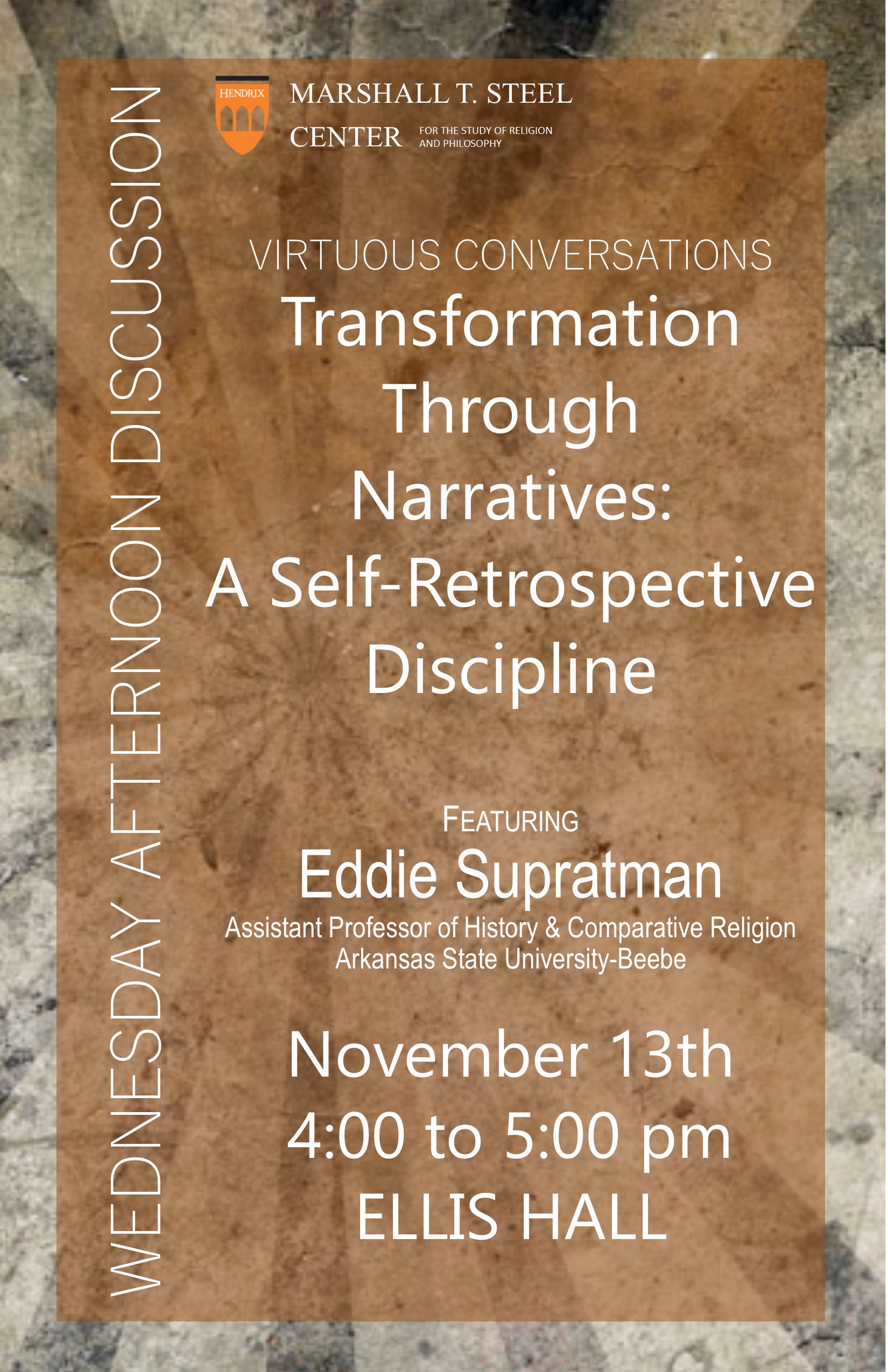
Wednesday, November 6th, 2019
The Virtues of Aesthetic Conversation
This is a conversation about conversation. Our discussions about aesthetic matters are complex, and we often end up in disagreements–about which tv shows are good and why, which bands are best, how to decorate the apartment, what food to serve and how to cook it, and so on. What are the virtues of aesthetic conversation? What are we aiming at when we have such discussions?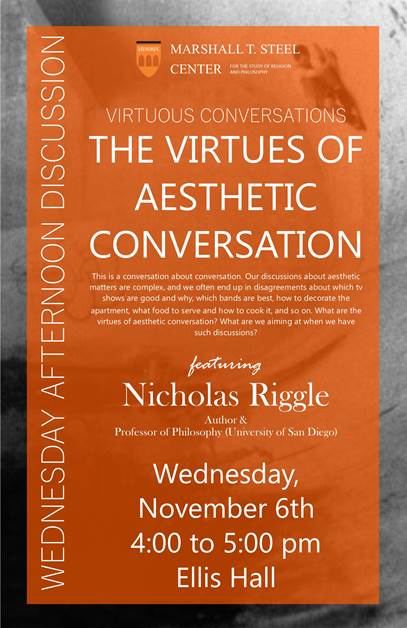
Wednesday, October 30th, 2019
Theorizing #MeToo: On The Political Importance of Being-With
MeToo represents an important political development. Yet the connection between MeToo and feminist theory remains ambiguous. This moment presents an opportunity to craft a democratic theory that values the role of the Other as constitutive of Being.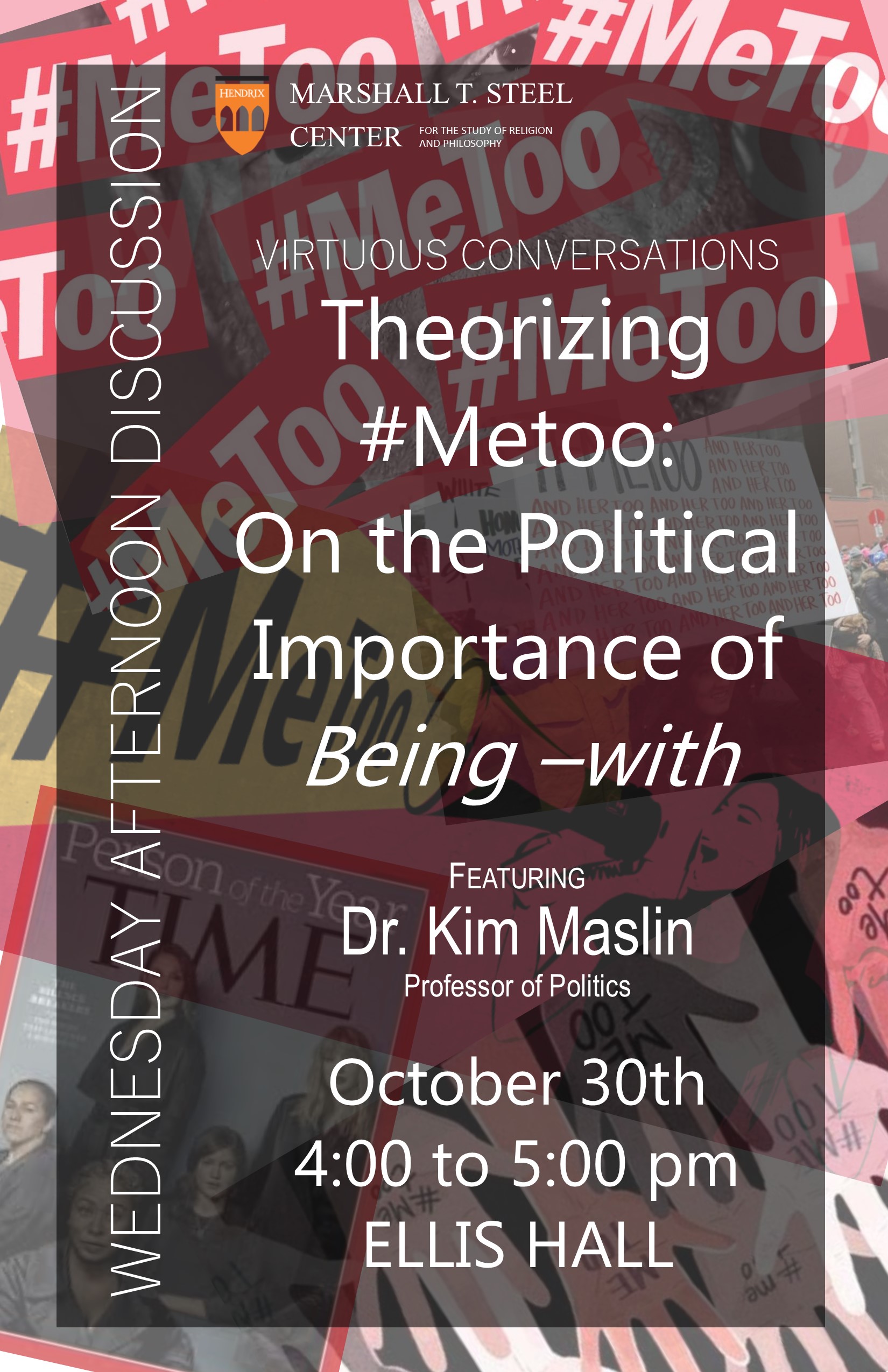
Wednesday, October 23th, 2019
Four Worlds as One: An Andean Reading ofNeoplatonic Metaphysics
The indigenous peoples of the Andes mountains in South America have a way of life that involves a reciprocal relationship between all existent things. The living and the dead depend on ritual practices providing nourishment, conversation, and creativity in order to sustain each other. These rituals are practiced as part of a metaphysical view comprised of four separate worlds (pachas). The four worlds are linked together as one single phenomenon. Neoplatonism also contains a similar view that all reality is linked together. In procession and reversion all reality comes forth from the One and ultimately returns to it. However, in this unfolding we do not have temporally subsequent events, as if the effect first proceeds from its cause and then becomes what it is by reverting. Procession and reversion are both effects of the cause—the One—and as such are not occurring in temporal succession. Now Andean thought does not contain a metaphysical understanding of these pachas coming forth—by emanation—from a first principle. However, the linkage between all things can be read similarly in Neoplatonism. That is, by reading procession and reversion through the lens of Andean metaphysics I show how all things are linked, thus giving credence to the role of rituals in each differing metaphysical scheme. Moreover, by coming forth from the One all things contain relevance and importance in dependence on each other. By entering into the practices of procession and reversion one fulfills the goal of Neoplatonism—returning to the One.
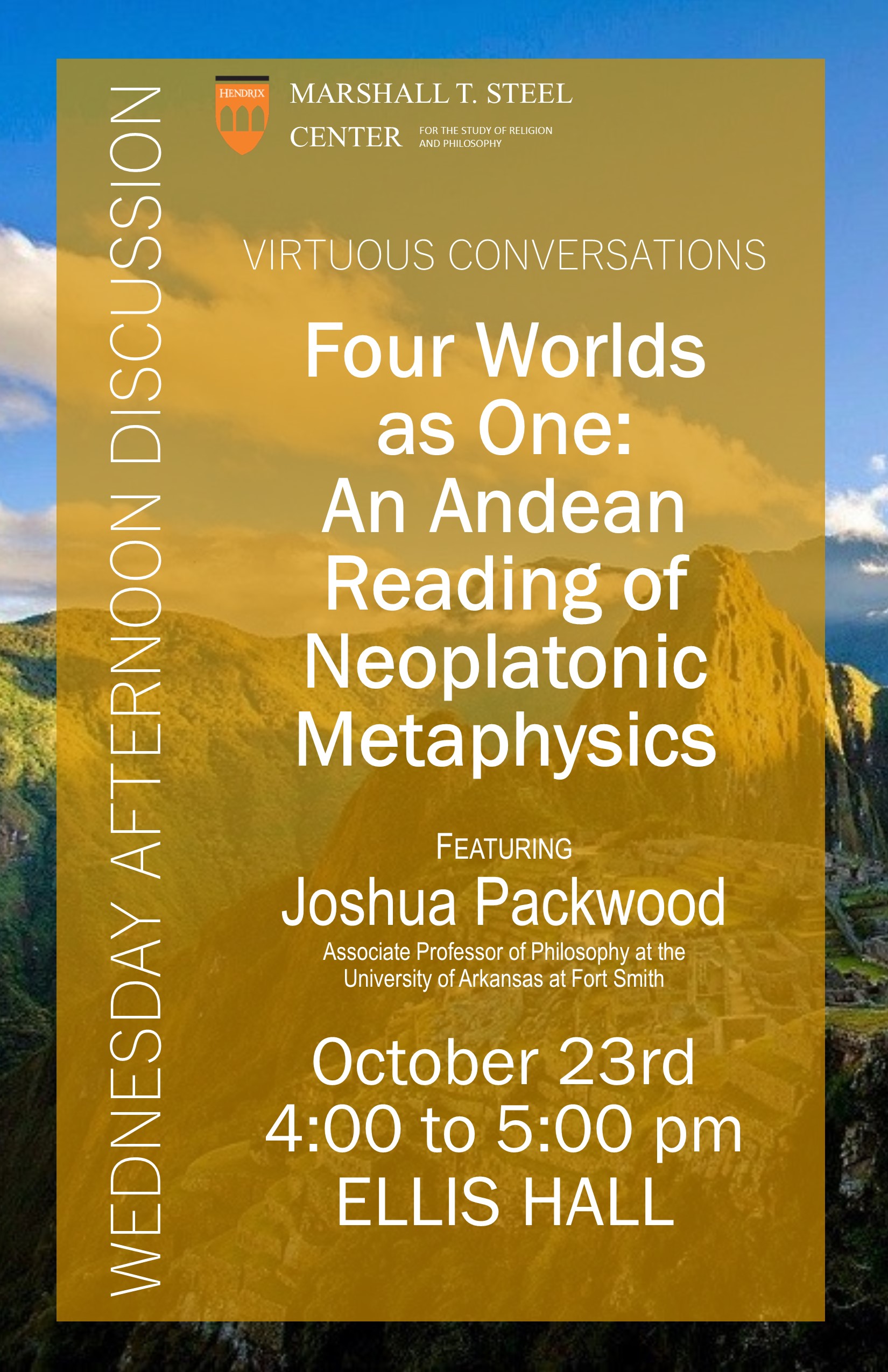
Wednesday, October 9th, 2019
THE DEATH PENALTY: Is Retributive Justice Just?
Whatever the success or failure of the death penalty in deterring the most heinous crimes, many people still feel that there is a deep, significant truth to the principle “a life for a life” and that honoring this truth is the only way to bring justice to the victims of murder and their families. Others argue that killing killers is just exchanging one murder for another murder, multiplying the injustices done. Who is right and why?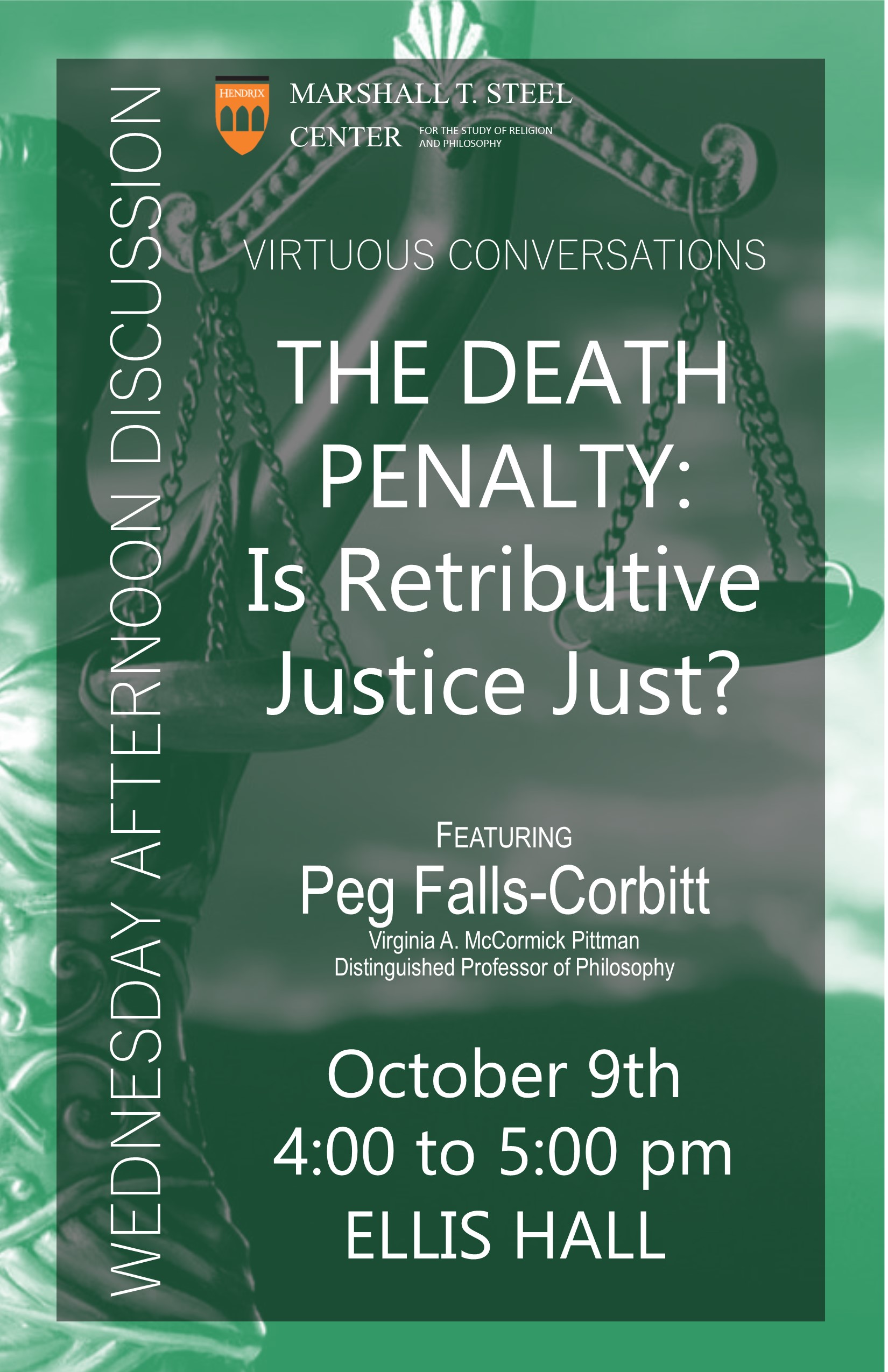
Wednesday, October 2nd, 2019
Discourse of Opening-Up and Reform: An Ontology of Special Economic Zones in Modern China
This presentation provides an analysis of several threshold documents that initiate the political-economic discourse of "Opening-up and Reform" in contemporary China. Brasovan uses Michel Foucault's philosophy of discourse as a method for analyzing and disclosing the philosophical underpinnings of contemporary Chinese economy with a particular focus on the creation of the "Special Economic Zone" of Shenzhen. 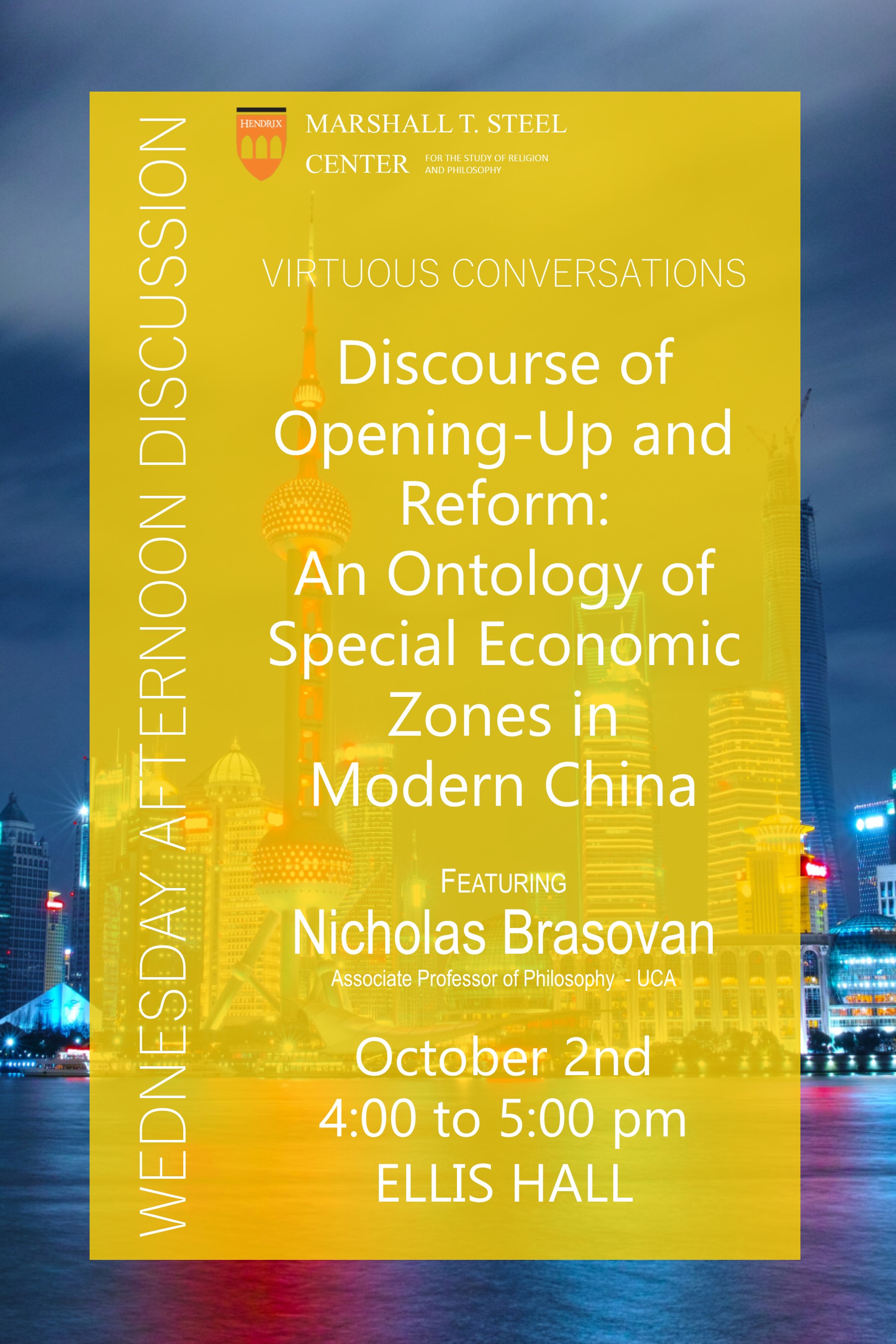
Wednesday, September 18th, 2019
Getting Some Perspective on Perspectives
Perspectives talk is ubiquitous in philosophy. The notion of a perspective is employed in discussions of phenomena as varied as self-consciousness, higher-order knowledge, agency, practical rationality, and epistemic rationality. Usages such as the “first person perspective,” “the perspective of the agent,” and “an epistemic perspective” are familiar enough that it is easy to forget that these locutions employ the concept of perspective as a metaphor. I argue that the use of the perspective metaphor has non-trivial implications for how these phenomena are conceptualized. I begin with a brief discussion of what metaphors are and how they work, focusing on ontological metaphors. I then argue that there are two concepts of a perspective that serve as distinct source domains for perspective metaphors: an indexical objective (IO) perspective, and a holistic interpretative (HI) perspective. These source domains form the basis for quite different ways of conceptualizing phenomena in the target domain. In the final section, I apply this analysis to a particular context where perspective metaphors are frequently employed: that of the first person perspective. Each of these source domains suggests different problems and possibilities in thinking about the first person perspective.
Led by Sharon Mason 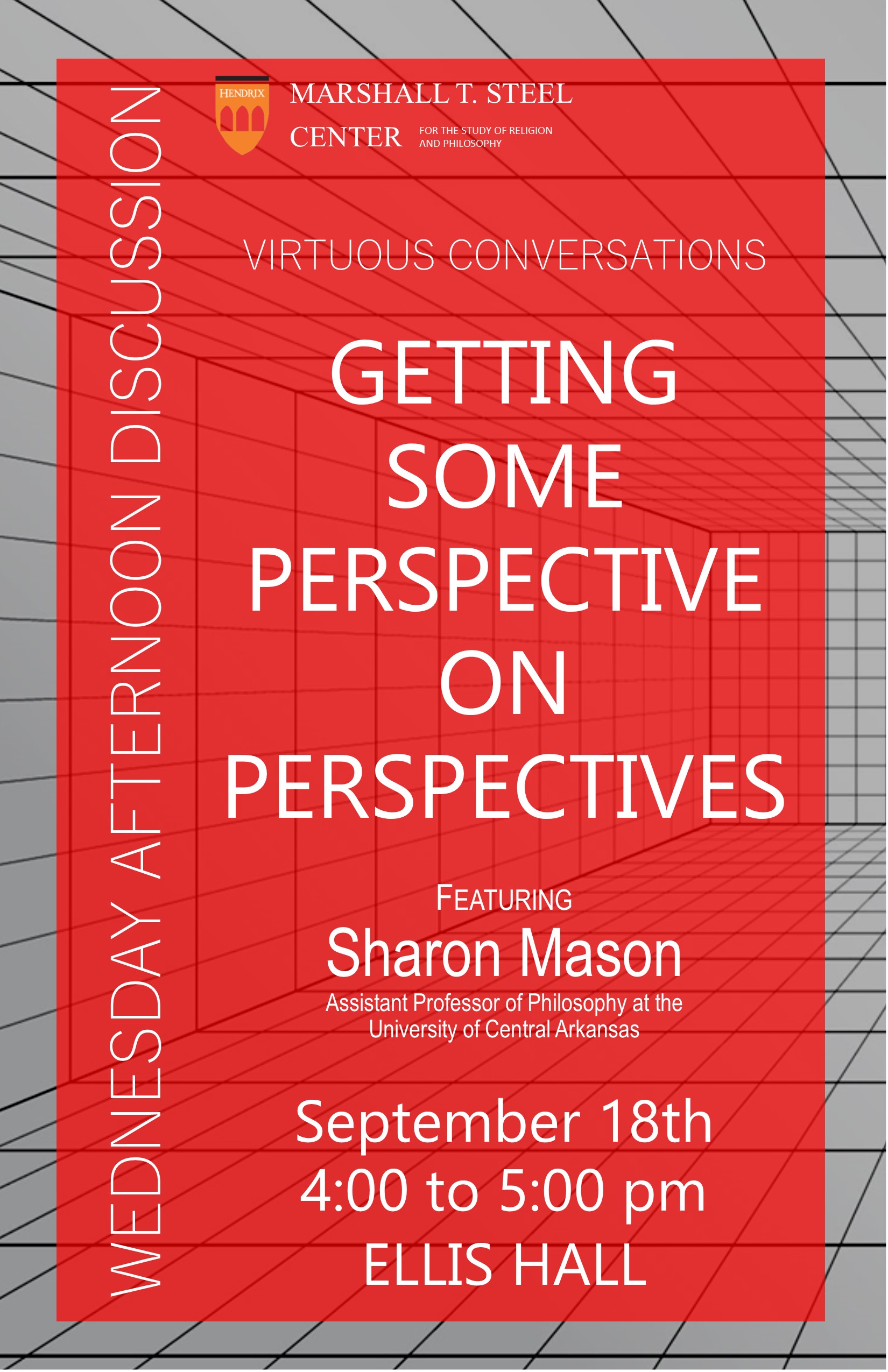
Friday, September 27th, 2019
The Best Hendrix Major For Getting A Job
Should you major in business, Spanish, or biochemistry? Want to be employed after graduation? Find out which Hendrix majors provide the best routes to good jobs. 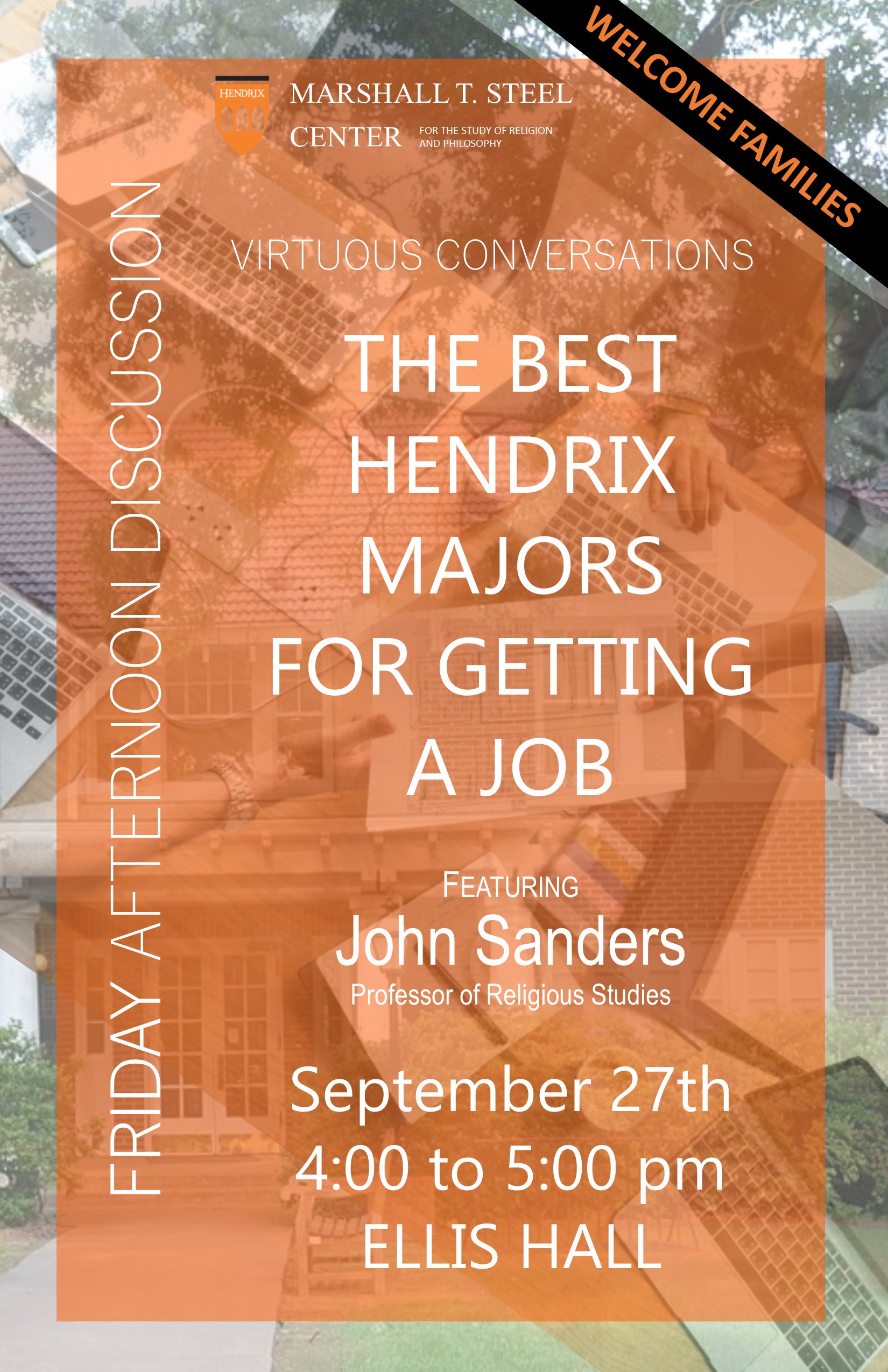
Wednesday, September 11th, 2019
Camus, Existentialism, and The Absurd
Albert Camus agrees with Jean-Paul Sartre that we are “condemned to be free,” but departs from Sartre as he posits this our freedom as opportunity. While we might struggle despairingly in an absurd world endeavoring to create meaning, we can also struggle joyfully, for as Camus says, “the struggle itself toward the heights is enough to fill a [man’s’ heart.” This talk will address the notion of taking up our tasks—in a world that is, according to Camus, absurd—with joy. 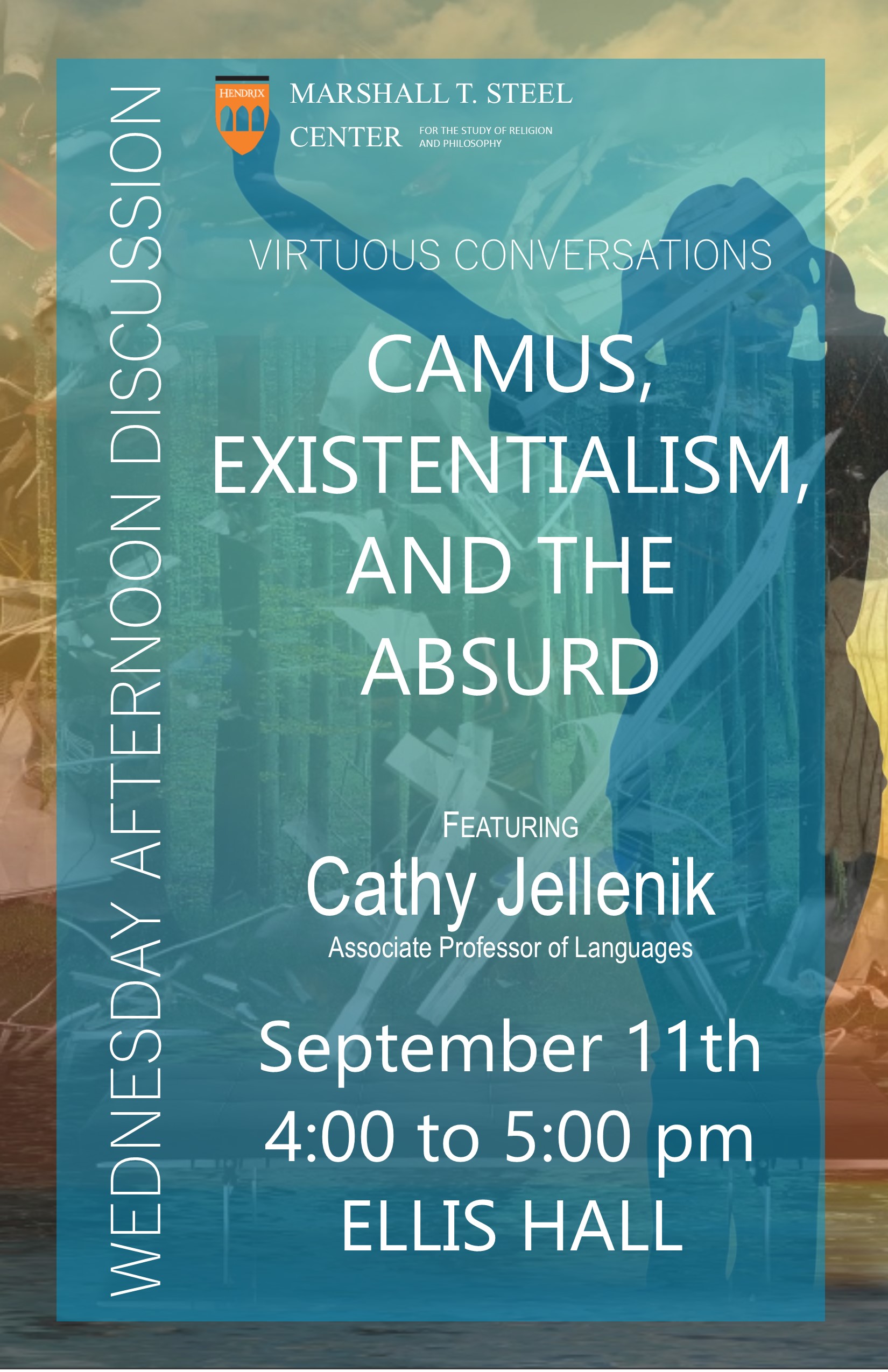
Wednesday, September 1st, 2019
Are The Liberal Arts The Liberating Arts?
Dr. Dow, Associate Professor of Philosophy, will lead a discussion on the question: Are the Liberal Arts the Liberating Arts? And discuss this recommended reading Peter Stuber's "Becoming Free". Refreshments provided and all are welcome.
led by Dr. James Dow
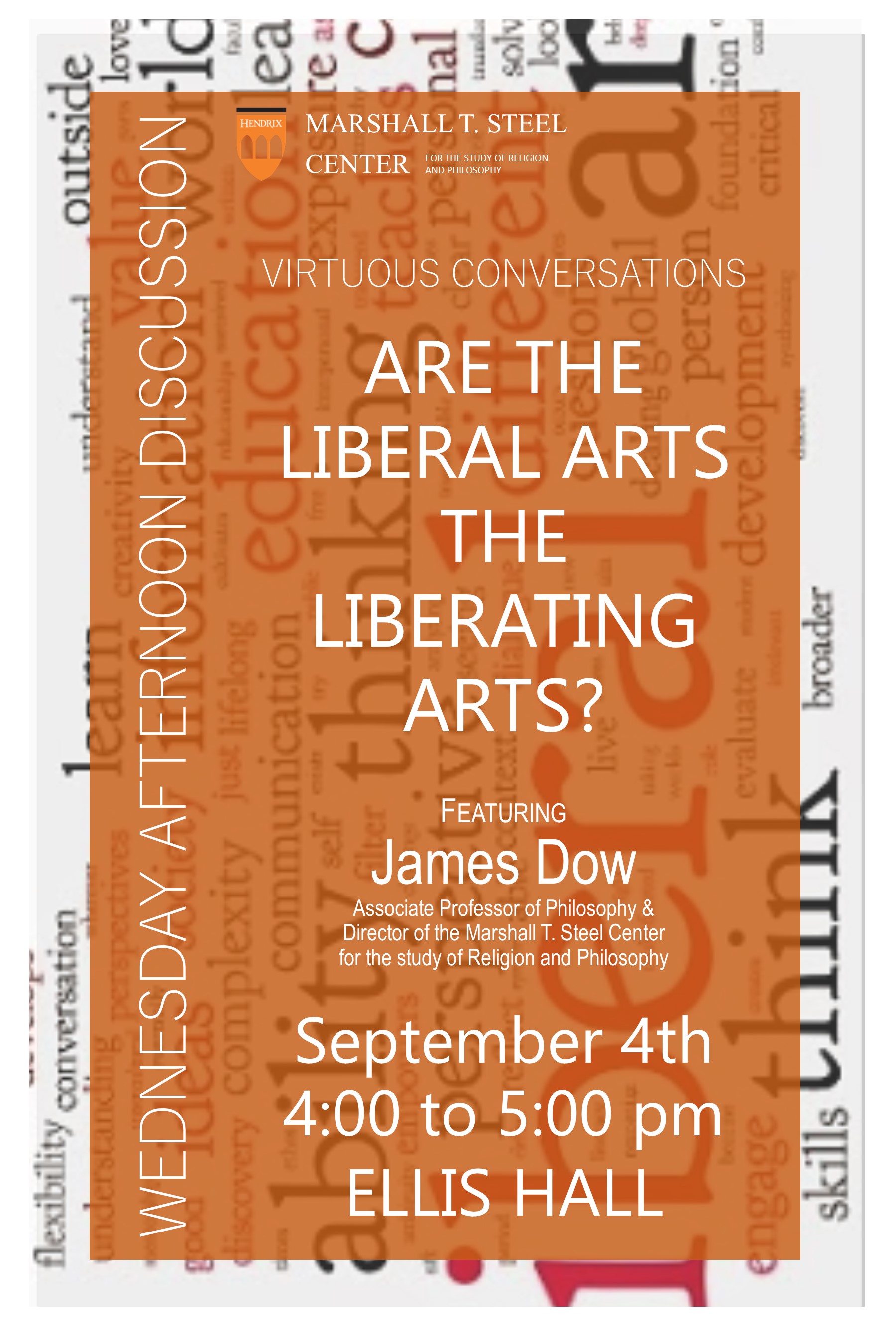
Wednesday, April 24th, 2019
The Body of Empathy: Can Art Cultivate Empathy?
“Hendrix College cultivates empathy” is the first clause of our statement of purpose. The Ellis art exhibit The Body of Empathy, curated by Dr. Dow and Dr. Lopas, asked the question of whether engaging with art can enable us to cultivate empathy. Dr. Dow will lead a discussion about the aesthetics of portrait paintings, discuss the artworks in the exhibition, and will argue that empathizing with personas and scenes in portrait paintings cultivates empathy in ways that differ from interacting with people and nature.
Led by Dr. James Dow
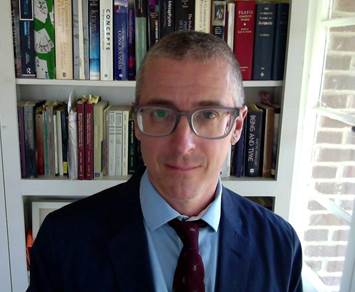
Wednesday, April 17th, 2019
Debates About Pornography
What are the different objections to pornography? What things can be said in favor of it? One question we’ll want to keep in mind as we discuss pros and cons is whether we can speak of “pornography” in general, or we need to be more specific about the particular kind of pornography in question.
Led by Dr. Anne Eaton from the University of Illinois

Friday, April 12th, 2019
On the Sense in Which Islam Requires More Enlightenment
"As several writers have observed, what contemporary Islam lacks is not so much reformation but enlightenment. Some authors have argued that this advice, however well intentioned, bespeaks of Western arrogance. They point out that Islam has a long and venerable history of religious and legal scholarship. While it is undeniably true that the Muslim world has a long-standing internal practice of scholarly criticism and interpretation, I will argue that there is nevertheless at least one regard in which Islamic scholarship has failed to sufficiently exploit the contemporary possibilities for critical self-understanding. One of the most important of these modern techniques is “scientific” historiography, particularly as described by R.G. Collingwood in his philosophy of history. In the Muslim world, scientific historiography has yet to be fully and systematically applied to thought about human affairs, including religion, law, and politics. In my talk I will endeavor to show how Islamic scholarship involving the hadith (i.e, the body of tradition about the words and deeds of the Prophet and his companions) could benefit from fully adopting the scientific approach to history. I will provide a detailed illustration of this approach by analyzing the Chappaquiddick incident of 1969, the infamous single-vehicle accident involving U.S. Senator Ted Kennedy, which resulted in the death of his passenger, Mary Jo Kopechne, and forever scuttled his chances of becoming President."
- Dr. Jeff Mitchell
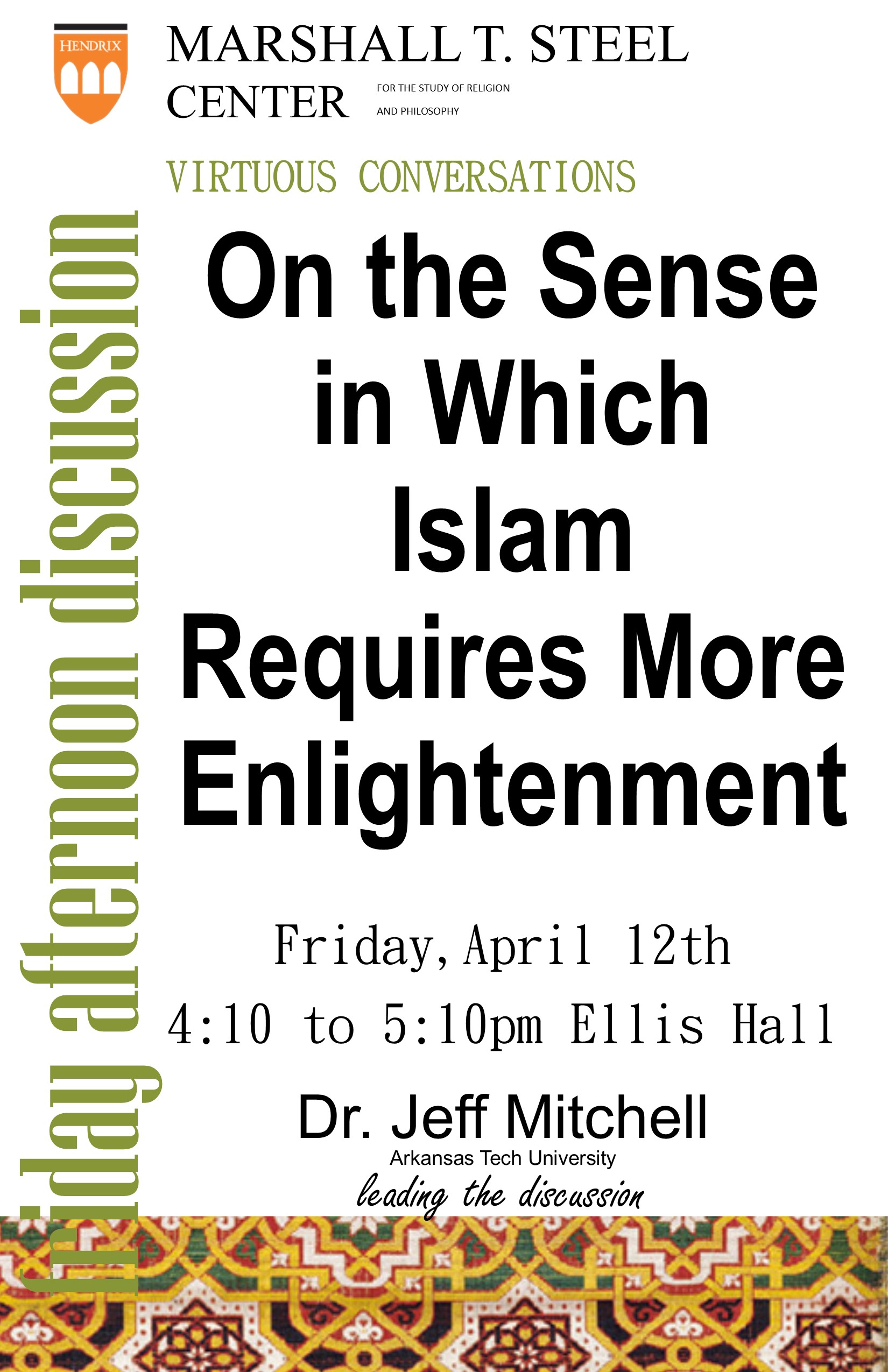
Friday, April 5th, 2019
The Study of Religion: My Fifty Year Journey
Join us as Dr. Harris takes a trip down memory lane revisiting who and what shaped her career, time at Hendrix and her faith. Dr. Harris is retiring at the end of May and we would like to join her in celebrating her career. Alumni are welcome.
Dr. Jane Harris, Professor of Religious Studies leading the discussion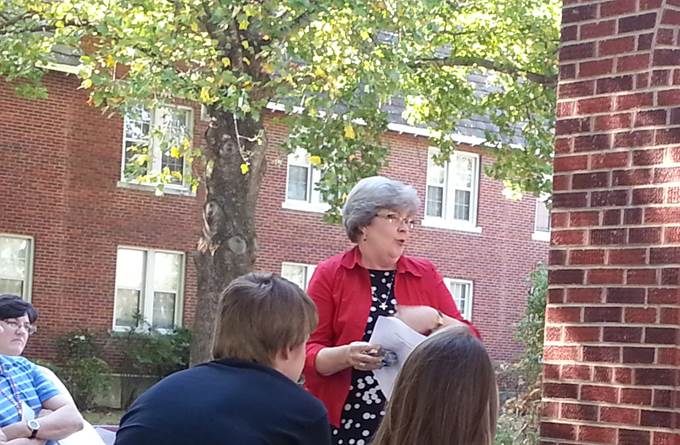
Friday, March 29th, 2019
Strangers and the Land: A Problem of Place and Identity
Drawing from the Torah and Wendell Berry’s agrarianism, this discussion focuses on an apparent tension between two moral priorities: the land ethic and the stranger ethic. Does care for the land run into conflict with welcoming the stranger?
Led by Dr. Dave Daily from the University of the Ozarks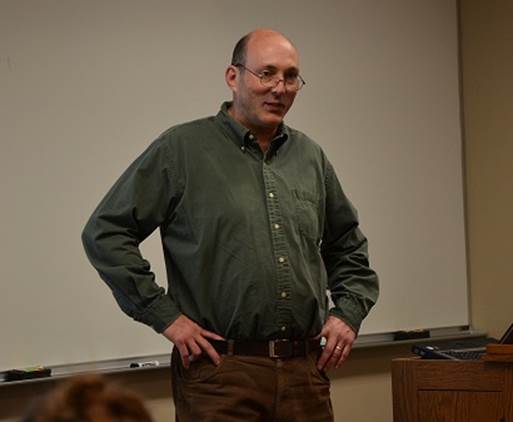
Friday, March 8th, 2019
Race and Bio-cultural Social Groupings
How should we understand, and refer to, reproducing human socio-cultural groupings, historically (in terms of evolution) and contemporarily, if not as “races”?
Led by Dr. Lucius Outlaw, Professor of Philosophy at the University of Vanderbilt. Dr. Outlaw specializes in Racial-Matter in Socio-Political life, Africana Philosophy, and Social and Political Philosophy.
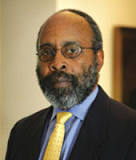
Friday, March 1st, 2019
Buying and Selling Your Body: Medicine and Culture in the 21st Century
A discussion of some issues in medical ethics that raise questions about what it mana to "have" a body. Is your body yours? Should it be? Let's talk about it.
Led by Dr. Campolo, Professor of Philosophy at Hendrix College
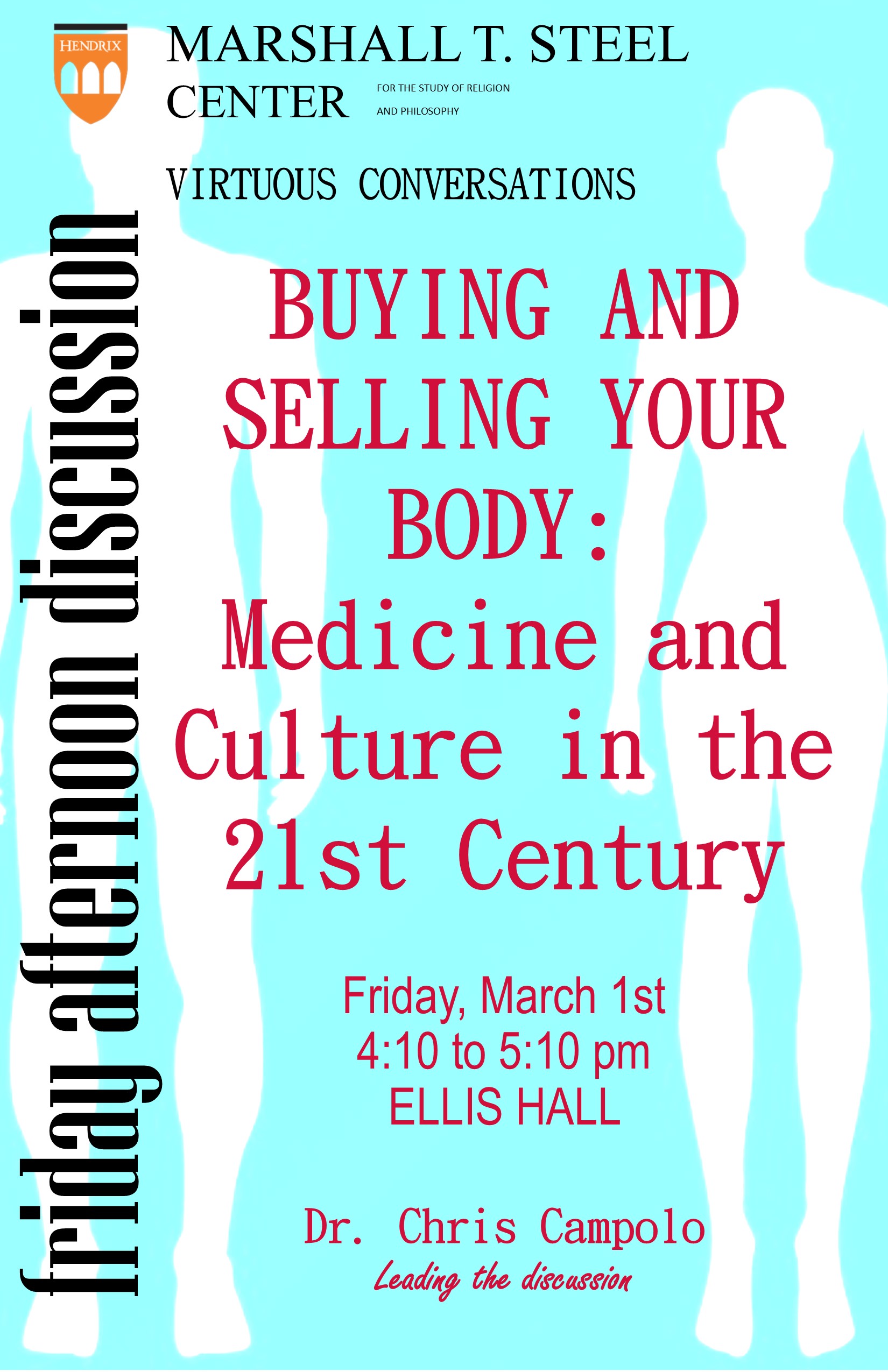
Friday, February 22nd, 2019
Philosophizing Like A Girl: Or Why Philosophy Needs Intersectional Gender Theory More Than Ever
In 1980, Iris Marion Young published the groundbreaking essay “Throwing Like A Girl” to provide a phenomenology of gendered embodiment and to explain the negative ramifications of sexist gender conformity. In this talk, Duncan will explain how forty years on, the lessons of gender bias, sexist institutions, and restrictive norms of embodiment matter for a responsive critical philosophy in the 21stCentury.
Dr. Taine Duncan of the University of Central Arkansas – leading the discussion
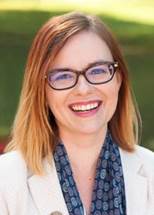
Friday, February 15th, 2019
“On the Border: Integrating Faith, Service, and Call”
Over winter break, Caitlin Camper explored how her faith and her call to service intersect through the framework of immigration. She traveled to Tucson, Arizona, to learn about the daily work done by The Florence Immigration and Refugee Rights Project, a non-profit organization that provides free legal and social service to detained men, women, and children who are under threat of deportation. Outside of working with FIRRP, Camper also visited Eloy Detention Center, witnessed Operational Streamline, and worked with other faith-based organizations that advocate for the rights of immigrants.
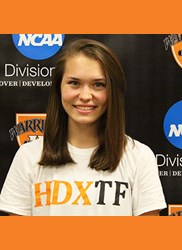
Friday, February 8th, 2019
A Second Shot at the Ouachita Trail
During the 2018-2019 winter break, seniors Grant Gartner and Luke Lefler reattempted backpacking the Ouachita National Recreational Trail after failing two years prior in an unsuccessful through-hike. As a Special Projects Odyssey credit, Gartner and Lefler successfully hiked through the one hundred and thirty miles of the Ouachita National Recreational Trail left unfinished from their first hike, completing the trip in 9 days. For the hike, Gartner and Lefler used the works Deep Survival: Who Lives, Who Dies, and Why by Laurence Gonzalez, Trying edited by Joshua Shepherd, and Achievement written by Gwen Bradford in application to trials experienced during the hike and in reflection with past failures and successes through hiking the Ouachita Trail. The project culminated in a greater understanding of effort and achievement and a successful completion of the Ouachita Trail.
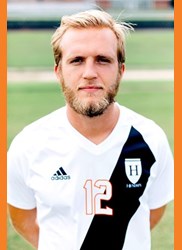

Friday, February 1st, 2019
Political Theology and White Christian Nationalism
“Political theology treats the way religion and politics cannot be separated in our modern world. This talk discusses the formation of white Christian nationalism in the US.” – Dr. Clayton Crockett
Featuring Dr. Clayton Crockett, Professor and Director of Religious Studies at the University of Central Arkansas
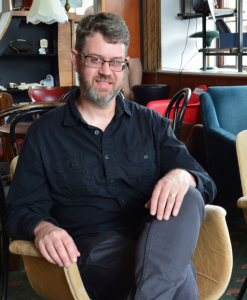
Friday, January 25th, 2019
Why Legal Argumentation Is Not a Good Model for Philosophical Argumentation
Philosophy and jurisprudence are often considered to be of a piece with each other, but there are, I contend, several important dis-analogies between philosophical and legal discourse, such that the ‘jurisprudence’ approach is detrimental to philosophical progress.

Friday, November 30th, 2018
The Becoming of Hendrix: Hopes for the Future
This discussion features five Hendrix Professors that are retiring this year – Jay McDaniel, Jane Harris, Stella Capek, Danny Grace and Joyce Hardin. Join us for an opportunity to listen to their experiences at Hendrix College and their desires for the college’s future. Everyone is welcome and we encourage you to join us for this fun occasion.
Friday, November 9th, 2018
Art as Educator: Why and How
It is often thought that art, and other aesthetic phenomena, can teach us about the world and ourselves, and that artistic and aesthetic activity can help us to learn truths and acquire and develop such knowledge (often in ways that suggest that we could not have accomplished these things via other means). But just how does this happen, exactly, and why? What are some of our reasons for engaging art and other aesthetic phenomena for this sort of purpose? In what ways can art, and other aesthetic phenomena, be morally and epistemically good, and in what ways can they be bad—and how can these different types of value interact (if they can)? Finally, how do different philosophical traditions—such as South or East Asian or European-influenced—address these kinds of questions? This interactive discussion will address these, and other related topics, all depending on audience interest.
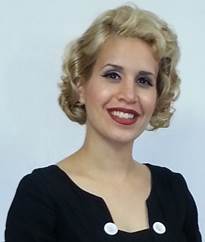
Friday, November 1st, 2018
The Forgotten Books of the Bible
While the biblical books of Song of Songs, Ruth, Lamentations, Ecclesiastes, and Esther serve as festival scrolls in the Jewish tradition, the Christian church has all but forgotten about them. In his book The Forgotten Books of the Bible: Recovering the Five Scrolls for Today, Robert Williamson insists that these books have urgent significance for contemporary life. In this talk, he will present some of the ideas in his book, covering topics ranging from human sexuality to immigration reform to resistance against ethnic nationalism.
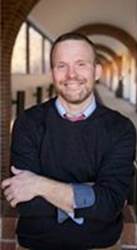
Friday, October 26th, 2018
Ecoglogical Self-Understanding: A Cross-Cultural Epistemic Virtue
Dr. Jesse Butler
Cross-cultural analyses often emphasize differences between worldviews. While there are significant differences across the diverse ways that humanity has understood itself, however, the tendency to emphasize differences can obscure important and revealing commonalities between worldviews as well. The goal of this talk is to identify one such commonality among indigenous worldviews and their capacity to address our collective ecological well-being together on planet Earth. Specifically, I will argue that contemporary philosophers Viola Cordova and Tu Weiming exhibit ecological self-understanding as an epistemic virtue in their conceptions of human existence. Ecological self-understanding (ESU) is veridical acknowledgement of human beings as embodied agents in the world, fundamentally situated within interdependent relations between self and environment. As contemporary exemplars of Native American and Confucian philosophy, respectively, Cordova and Tu illustrate how both worldviews exhibit ESU and thereby serve as models toward the cultivation of ecological well-being through their understanding of the human condition.

Friday, October 19th, 2018
How Should Moral Disagreement Inform Health Care Policy?
Dr. Michael Brodrick
“My argument has four parts. First, there is such a thing as - what I call- moral disagreement or moral diversity; second, Western intellectuals have long believed that rational deliberation can eventually eliminate moral disagreement and discover the one true morality that applies to all humans; third, this cherished belief of Western intellectuals is false; fourth, this has important implications for the ethics of health care policy. In particular, health care policy should rely as much as possible on rules that treat different people the same and avoid rules that treat different people differently. In other words, health care policy should be constrained by the Rule of Law and should, whenever possible, avoid legislation and regulation. This amounts to a moral argument for significant reform of the current health care policy landscape in the United States.” – Dr. Michael Brodrick
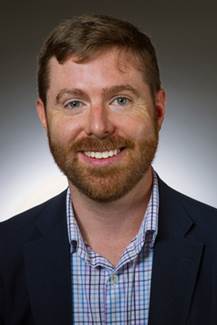
Friday, October 5th, 2018
In the Midst of the City: The Gospel and God’s Policies
Faith communities are often politically involved, but what shape should such involvement take? The Very Rev. Barkley Thompson's new book God in the Midst of the City: The Gospel and God's Politics argues that the Gospel is never partisan, and that Christian people must immerse themselves in the Gospel as a prelude to determining their social and political commitments. Thompson, who serves as dean of historic Christ Church Cathedral in Houston, will read from his new book and answer questions from attendees. Longtime NPR host Diane Rehm says of Thompson’s book, “…Those who read this book will feel [Thompson’s] extraordinary ability to help us interpret both the divisions and connections we experience as we move through this complex religious, secular and political world.”

Friday, September 28th, 2018
Human(un)kind and the Rape of the World
This paper sketches the history of unethical behavior of Homo sapiens to other forms of life on planet Earth. I ask, and sketch responses to, the question: How and why is it that we, the so-called “ethical animal,” have been the worst of all animals in relation to other life-forms on our planet? In response to the answers to this question, I claim that we know, and have known for a very long time, what it means to be morally good. But in light of the natural bases of our behavior, I wonder if it will ever be possible for us, as a species, to become so. Led by Dr. Charles W. Harvey, University of Central Arkansas.
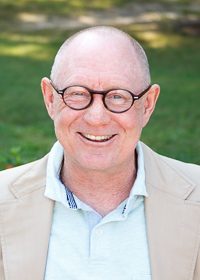
Friday, September 21st, 2018
Religion in a Warmer World: Cosmotheism and the Anthropocene
The term "Anthropocene" is much discussed lately as a way of thinking about large-scale shifts in earth systems—including but not limited to global warming—caused by human activity operating at the level of a geophysical force. Though not without confusion and controversy, the term is gaining currency as it emphasizes the increasing untenability of distinctions between the human and the natural. If such distinctions are untenable, what consequences are there for our understanding of religion? This talk will offer an approach to religion in the context of the Anthropocene, first by critically examining the heritage of monotheistic thought with regard to the relation between humans and the nonhuman world, and then by suggesting an immanent and materialist understanding of both divinity and religious practice. Led by Dr. Michael Norton, University of Arkansas at Little Rock.

Friday, September 14th, 2018
Antonio Damasio and the Implications of Neuroscience for Developing a Philosophy of Life Today
Antonio Damasio explains recent discoveries in Neuroscience, especially the integration of mind and brain. Dr. Beck explains Damasio’s view of the goal of life as “homeostasis,” or human flourishing. She then explains Aristotle’s notion of eudaimonia and the way Greek culture cultivated it. Led by Dr. Martha Beck of Lyon College.
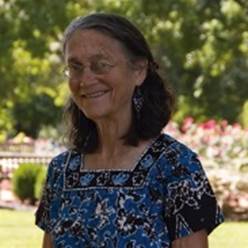
Friday, September 7th, 2018
Nosewise Dogs and Perceptual ‘Smell-how’ in Human-Canine Dyads
It is no secret that dogs have a much richer olfactory picture of the world than humans, but little is known about the mechanisms subtending this skill. There is also not much by way of philosophical discussions of olfaction generally, whether in humans or in other species. In this paper, I show why this lacuna is an unexplored treasure trove for philosophy of cognitive science, particularly when it comes to debates concerning mental and perceptual content. I argue that current enactivist conceptions of cognition – those that are radically anti-representational in nature – are the best fit for explaining how dogs ‘see’ the world through their noses. This perceptual capacity is a sort of know-how whereby dogs are not representing the world internally, but instead, when they interact with the environment, they are constituting information-for action. Smells, in other words, are natural signs for how best to engage with the world. While humans have largely ignored olfactory input as a source of ‘smell-how,’ they are not entirely ‘smell-deaf’, and the enactivist account of cognition is further strengthened by examining how smelling, like other skills, can be improved with practice. Even more compelling is when humans and dogs are paired together for smelling-specific tasks, such as bomb or human remains detection. In the final parts of this paper, I examine how these human-canine dyads suggest ways in which interspecific relationships can afford even more perceptual know-how for each member of the dyad, all without appealing to an overtly representational or cognitivist framework. - Dr. Michele Merritt, of Arkansas State University. Dr. Merritt will be leading the discussion.
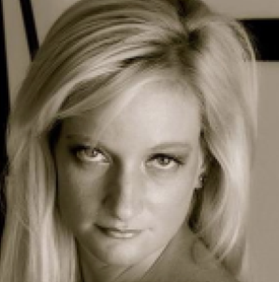
Friday, August 31st, 2018
Virtuous Conversations
What makes a good conversation possible? What are some virtues of good conversations? Open-mindedness? Empathy? Charity? What are some vices? Closed-mindedness? Lack of listening? We will discuss the values that structure virtuous conversations. Led by Dr. James Dow
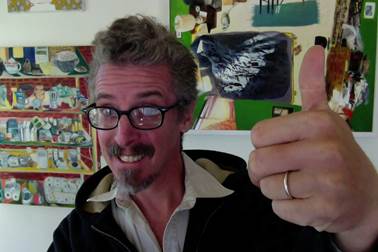
Friday, April 20th, 2018
The Steel Center & the Raney Building: How They Shaped My Life
Help kick off Alumni Weekend & join Hendrix Alumni – Amanda Baugh ’04, Emily Austin ’00 and Dr. Jay McDaniel for a heart-felt and rousing discussion.
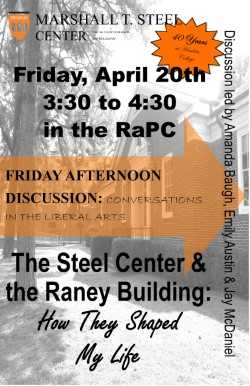
Friday, April 13th, 2018
The Balancing Act of High Volume Hydraulic Fracturing's Benefits & Detriments in Arkansas
Join two Hendrix students, Krishna Patel, and Maggie Young in a discussion of the current scientific research and ethics surrounding the positives and negatives of the HVHF energy industry. All are welcome.
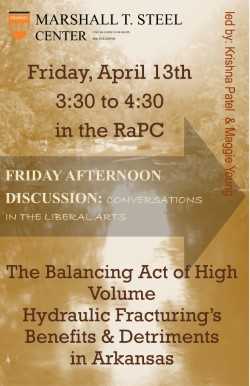
Friday, April 6th, 2018
Interfaith Explorations: Texts on Encountering God
A student led discussion, facilitated by Dr. Jay McDaniel. Everyone is welcome to participate as we explore various texts. No expertise required, just a willingness to read, respond and discuss.
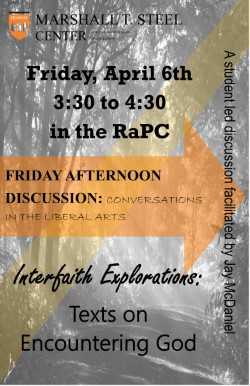
Friday, March 30th, 2018
Religion, Gender & Sexuality: A Conversation
Engage in a conversation regarding religion, gender and sexuality. Led and facilitated by Dr. Harris. This is Dr. Harris first Friday Afternoon Discussion of the semester. Join us for a refreshing discussion!
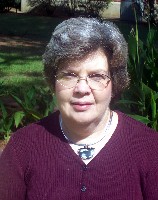
Friday, March 9th, 2018
Interfaith Explorations: Texts on Abraham's Journey
Abraham’s Journey is a key idea in Islam, Judaism, and Christianity. Join us for an interfaith scripture expiration, led by Rachel Shepherd, Brittany Chue, Mac Nadurak, and Dr. Jane Harris, in which participants freely respond to texts on the Journey from these traditions, with agreements and disagreements – plus confusions – heartily encouraged.
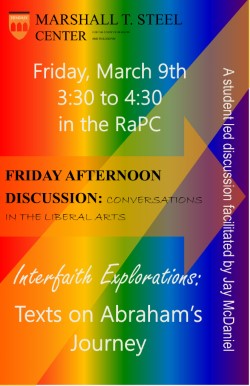
Friday, March 2nd, 2018
Japanese Tea Ceremony & Zen Meditation
Friday 3:30-4:30 in the RaPC. Relax from stress with a Japanese Tea Ceremony capped with a brief introduction to Zen Buddhist Meditation. Aya Murata, Japan Outreach Initiative Coordinator, will lead the activities with Dr. Jay McDaniel facilitating.
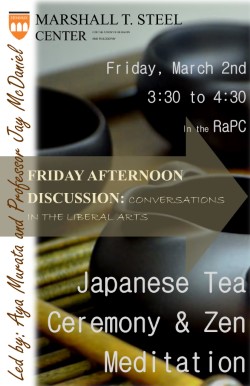
Friday, February 23rd, 2018
Featuring: Dr. Miraslov Volf of Yale Divinity School
Miroslav Volf is the Henry B. Wright Professor of Theology at Yale Divinity School and the Founder and Director of the Yale Center for Faith and Culture. He was educated in his native Croatia, the United States, and Germany, earning doctoral and post-doctoral degrees (with highest honors) from the University of Tübingen, Germany. He has written or edited more than 20 books and over 90 scholarly articles. His most significant books include Exclusion and Embrace (1996), winner of the Grawemeyer Award in Religion, and one of Christianity Today’s 100 most important religious books of the 20th century; After Our Likeness (1998), in which he explores the Trinitarian nature of ecclesial community; Allah: A Christian Response (2011), on whether Muslims and Christians have a common God; and A Public Faith: How Followers of Christ Should Serve the Common Good (2011). His most recent books are Flourishing: Why We Need Religion in a Globalized World and Public Faith in Action: How to Think Carefully, Engage Wisely, and Vote with Integrity (co-authored with Ryan McAnnally-Linz).
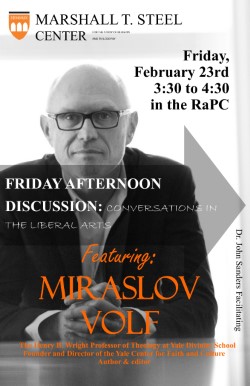
Friday, February 16th, 2018
Hermeneutic Conversations Across Divides
Following Gadamer's philosophical hermeneutics, what constitutes the situation of a conversation with someone who may hold very different views? To what extent can the other be understood? What are the various possible outcomes of such conversation? Join us as Dr. Lawrence Schmidt leads the discussion.
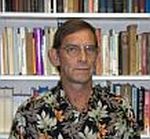
Friday, February 9th, 2018
The Role of Buddhism in My Art
Join us as Professor Melissa Gill presents her artistic research in printmaking and discusses how her Buddhist practice and the act of ritual informs her choice of image and her working process.
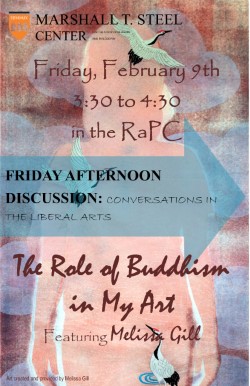
Friday, February 2nd, 2018
Interfaith Explorations: Texts on Hospitality to the Stranger
People from different faiths and no faith read texts from the Qur'an, Torah, and New Testament. No expertise required, just a willingness to read and respond and discuss. Come and enjoy the conversation that is student led and facilitated by Dr. Jay McDaniel.
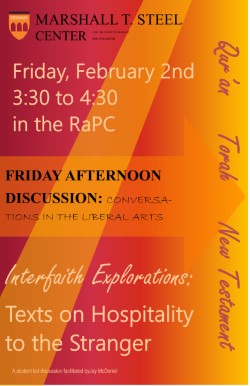
Friday, December 1st, 2017
Reading Like Your Life Depends On It
On the day after the 2016 election, Dr. Marjorie Swann joined Literacy Action of Central Arkansas as a volunteer tutor. Since then, she has worked with adults in Conway who seek to improve their ability to read, write, and speak English. In the process, Dr. Swann has found her world-view challenged along with her teaching skills. Dr.Swann's account of her experience as a literacy tutor should provide a starting point for a wide-ranging discussion about education, community, service, and inclusiveness.
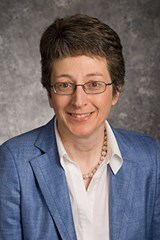
Friday, November 10th, 2017
“Joy”: An Exploration of Happiness at Hendrix College and Beyond
Leading the discussion: Tristan Norman ’20 and Jacie Andrew ‘20. ‘Joy’ is a documentary committed to exploring joy and happiness in a multi-disciplinary dialogue. Based on our TEC – Art & Spirit curriculum, we seek to understand the importance of stories, spirituality and narratives in living a life of depth.
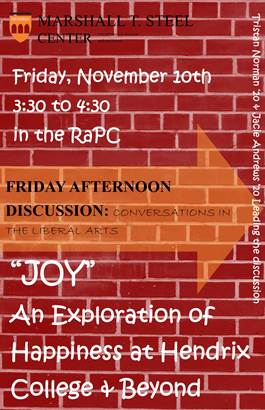
Friday, November 3rd, 2017
Multi-Cultural Musicking
Come enjoy Hendrix students singing East Asian Pop Songs in Chinese, Korean and Japanese. It’s engaged citizenship as participatory music-making. You can sing along too. Sponsored by: Krebs-McDaniel TEC Class, Steel Center, Greater Arkansas Interfaith Network, Asian Studies.
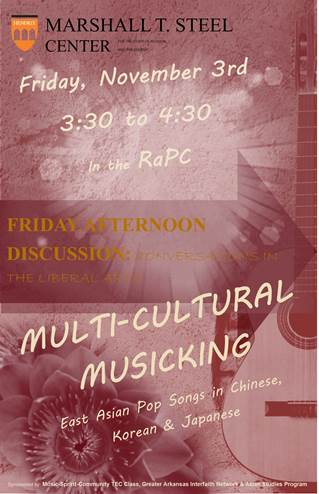
Friday, October 27th, 2017
Muslims in America: Their Civil Rights and Local Contexts
A discussion on the rights and contexts of Muslims in America with Veronica Laizure, Hendrix Graduate and Civil Rights Director for the Council on American-Islamic Relation (CAIR), Oklahoma Chapter.

Friday, October 6th, 2017
My Life in Popular Music: The Spiritual Side
Ann Powers, music critic for NPR and author of A History of Popular Music in America, will lead a discussion of the spiritual side of popular music. Her book, Good Booty: Love and Sex, Black & White, Body and Soul in American Music will be available for purchase and a book signing will follow the discussion. Families are welcome!
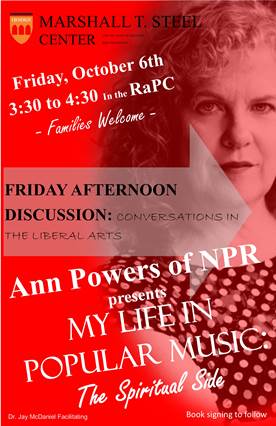
Friday,September 29th, 2017
A Better Discourse (Epistemological Improvements in Politics & Beyond)
What does it mean to argue “in good – faith”? How should we understand people we disagree with politically? Having a better political discourse requires better understanding the arguments made and using our understanding to make better arguments. Discussion will be led by Ryan McGregor ‘18.

Friday, September 22nd, 2017
The Beloved Community: A Dialogue on Just Peace Making and Becoming Change
A dialogue on Just peace making, non-violent activism, and the qualities of a change agent. These dialogues offer a mulita-dimensional perspective on what it means to be peaceful and what we can do to be agents of change in our communities. This discussion is in conjunction with Arkansas Peace Week and the Hendrix Peace Vigil and Dedication. Discussion and activities led by Tristan Norman ’20, Facilitated by Dr. Jay McDaniel and Dr. Deborah Skok.
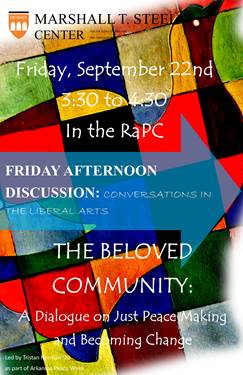
Wednesday, September 20th, 2017
No Crystal Stair: Becoming a Black Woman Biblical Scholar
Guest speaker – Dr. Nyasha Junior, author and Biblical Scholar Dr. Junior will discuss her intellectual journey and the challenges along the way. Open to the public. Tea and coffee will be provided.
.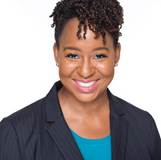
Friday,September 15th, 2017
Japanese Tea Ceremony & Zen Meditation
Relax from stress with a Japanese Tea Ceremony capped with a brief introduction to Zen Buddhist Meditation. Aya Murata, Japan Outreach Initiative Coordinator, will lead the activities with Dr. Jay McDaniel facilitating.
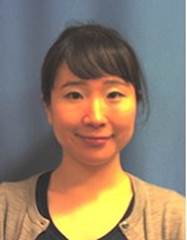
Friday, September 8th, 2017
Spain at War: History & the Arts
The Spanish Civil War (1936-1939) is one of the most significant world events of the twentieth century, even in the United States. Studying it and the art that came of it also becomes a means to reflect on engaged citizenship. “Spain at War: History & the Arts” aims to familiarize students with the war and to foster such reflections. We can discuss the resonance this event has even now a-days, as well as the artistic production that was generated during and after the war in the form of posters, paintings, music, literature, etc. Professor Gabby Vidal-Torreira & Professor Alex Vernon leading the discussion.
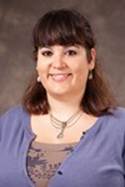
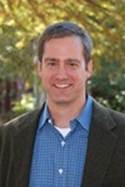
Friday, September 1st, 2017
Disaster Relief & How Our Society Responds
We will engage in a community conversation about the way our society responds when faced with a disaster and disaster relief efforts. This discussion will be informal and a bit outside the norm from our typical discussion format as we intend to all participate, even if that means just listening, without the regular presentation of a formal topic. J.J. Whitney, Chaplain, and Jim Wiltgen, Dean of Students, will facilitate the conversation. Everyone is welcome! Snacks and drinks will be provided.
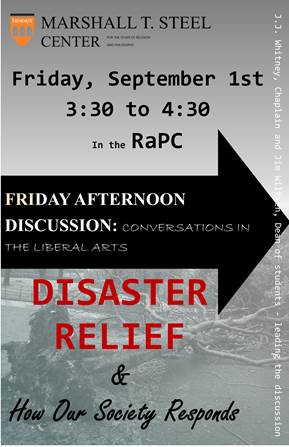
April 21, 2017 My Life at Hendrix College Led by Dr. Alice Hines When we think of renaissance women, we think of Dr. Alice Hines. Come hear her share aspects of her life and vision, learning with her and from her. She is known in and beyond Hendrix College as a devoted teacher of literature and writing, who has enriched many, many lives; an unflinching servant of the common good, inspired by Martin Luther King Jr.’s idea of beloved (inclusive) community; a tireless advocate of the role of the Humanities in public and private life; a loyal citizen of Menifee,Arkansas, and its locale in Faulkner County, Arkansas; and a woman of strong and sincere faith,inspired by the power of the One in whose presence she lives and moves and has her being, to whom she is accountable, and by whom she is loved. This faith expresses itself in public service: the very kind of engaged citizenship Hendrix College so honors. Dr. Hines has served as president of the board of directors of the Arkansas Humanities Council, secretary of the Menifee Planning Commission and as a member of the board of directors of the Women's Shelter of Central Arkansas,of the Arkansas Judicial Discipline and Disability Commission, of the board of the Conway Housing Authority Family Self-Sufficiency Program, of the governing board of the Conway County Hospital,and the board of the Faulkner County Day School. Yes, she is a renaissance woman.
April 14, 2017 Dionysian Sensations: Tragic Art in Nietzsche and Francis Bacon What was the impetus for the flourish of creativity that the
Greek people experienced in the Attic Period? This talk discusses the
aesthetic powers that the philosopher, Frederick Nietzsche, discovered in his book The
Book of Tragedy and locates its repetition in the figurative art of Francis
Bacon.
March 31, 2017 Southern Living: In the Life of a Jewish Student Led by the Hillel Group Growing up Jewish in the Bible Belt is a unique experience. Hendrix Hillel will discuss their own personal experiences and how they continue to find their faith in a predominately Christian culture
March 10, 2017
Meditation in S.Korea Led by Pearl Jangiiruat & Lena Pham
Explore aspects of Buddhism, meditation, and Korean culture with Pearl Jangjiravat ’17 and Lena Pham ’18 as they talk about their recent Odyssey project in South Korea. They traveled to four cities, and experienced two different forms of meditation and temple lifestyles. Join them for a presentation and discussion about their experience. Afterwards they will lead a short meditation session based on the techniques they learned.
March 3, 2017
Moral Politics Led by John Sanders
Brief description (to be used in creating posters, other announcements and the submission to Hendrix Today): Some analysts scratch their heads when they see people voting against their economic interests. What is often ignored is that such people vote for their moral interests. This presentation examines how our political language resonates with particular moral visions. For instance, thinking of health care as a commodity entails a very different value than thinking of it as a freedom.

February 24, 2017
Women in Islam Led by Sophia Said
Women play a prominent role in the ongoing history of Islam, sometimes unnoticed and sometimes stereotyped. At times in this history they have been victimized and at times valorized, sometimes at the same time. Today the situation is changing as Muslim women claim their agency, interpreting Islam itself in ways that are both traditional and prophetic, all the while drawing upon the depths of Islamic spirituality. Sophia Said, a multi-faith leader in Little Rock with degrees in economics and social policy, and with a deep interest in Islamic spirituality as a recourse for Muslims and the world, will speak to these issues. An informal and open discussion will follow Mrs. Said’s presentation and light snacks will be served.
February 3, 2017
Museums as Social Justice Led by Olivia Ensley
How do museums approach, understand, and communicate history and culture? How does the architecture and layout of D.C. communicate a national narrative? What do we include in this "national narrative" and why did it take 100 years to create the National Museum of African American History and Culture? Come listen to Olivia Ensley '17 talk about her experience visiting the museum, the symbolism embedded in the museum, and how she relates it to a broader narrative of social justice.
January 27, 2017
K-Pop: The Good... The Bad... And the Debatable Led by Tarek Esaw and Lexus Taylor
We will be delving into the global music phenomenon that is Korean Pop music. From the history to the controversy, we invite you to join us as we discuss these and its overall impact on its fans and the world.

December 2, 2016
How is Environmental Disobedience Morally Justified? Led by Dr. James M. Dow
On the Standing Rock Sioux reservation in North Dakota, water protectors have engaged in environmental disobedient actions to attempt to stop the Dakota Access oil pipeline from crossing beneath the Missouri river. How are such actions morally justified? The moral justifications of such actions could be in terms of the consequences, could be in terms of the intentions, or could be in terms of virtues. However, cultivating empathy for the point of view of the person thinking through the ends of environmental justice— concern for the air, the water, the land, etc.— is often difficult. Dr. James M. Dow, Assistant Professor of Philosophy and the Philosophy Department Seniors will discuss the environmental ethical arguments justifying environmental disobedience.
November 11, 2016
Shaping the Group Mind Led by Dr. Deborah Tollefsen, Ph.D., Professor of Philosophy, University of Memphis and facilitated by Dr. James M. Dow.
In the social sciences and in everyday speech we often talk about groups as if they were agents, thinking and acting as a singular being. We say, for example, that "Google intends to develop an automated car," that "the US government believes that Syria has used chemical weapons on its own people," or that "the NRA wants to protect the rights of gun owners." We also often ascribe legal and moral responsibility to groups. What are we to make of this practice? Are groups literally intentional agents capable of acting in the world and being held responsible for those actions? In this talk I argue that our practice of treating groups as agents is simply an extension of our practice of treating individual human beings as agents. just as folk psychology allows us to shape human minds and makes them more predictable, so too, our practice of attributing beliefs, intentions, and responsibility to groups helps to shape groups and makes group action more predictable. – Dr. Deborah Tollefsen
November 4, 2016
The Definite, Non-negotiable, Best Ten Albums of All Time Led by Dr. Ablondi
I will talk about 10 rock albums that come as close to perfect as I think possible. In the discussion that follows, I hope those in attendance will point out my glaring omissions, but also that we can talk about the aesthetic criteria for judging the greatness of a recording, as opposed to it being a personal favorite. – Dr. Fred Ablondi. It promises to be a fun hour of musical debate.
http://www.jesusjazzbuddhism.org/the-top-ten-rock-albums-of-all-time-a-definitive-list.html
October 28, 2016
"How I've Been Thinking About the Election" Led by Jane Harris and Kim Maslin
What’s happening this election season? How important is religion? How important is politics? How, if at all, can they be separated? How we answer these questions will be influenced by the academic disciplines we bring to the discussion. Jane Harris (Religious Studies) and Kim Maslin (Politics) will help guide us in our thinking by sharing their own perspectives on “what’s happening.”
October 27, 2016
Convo with P-Safe Led by Direcotr LeBlanc and Facilitated by Miranda Donakey ‘18
Take this opportunity to get to know the new director of Public Safety, Mike LeBlanc! Director LeBlanc has a passion for the community and safety of Hendrix College and wants to share that passion during an informal, interdisciplinary discussion! It’s a good time to hear what goes on behind the scenes when it comes to keeping our campus safe and enjoy an open discussion.
October 21, 2016
Let's Compare Origin Stories Led by Dr. Robert Williamson
While it is common to talk about “the biblical creation story,” in fact there are multiple creation stories in the Bible. This talk will compare three of them (Genesis 1, Genesis 2, and Psalm 104), discussing what each may contribute to our understanding of the nature of humankind and our place in the world.
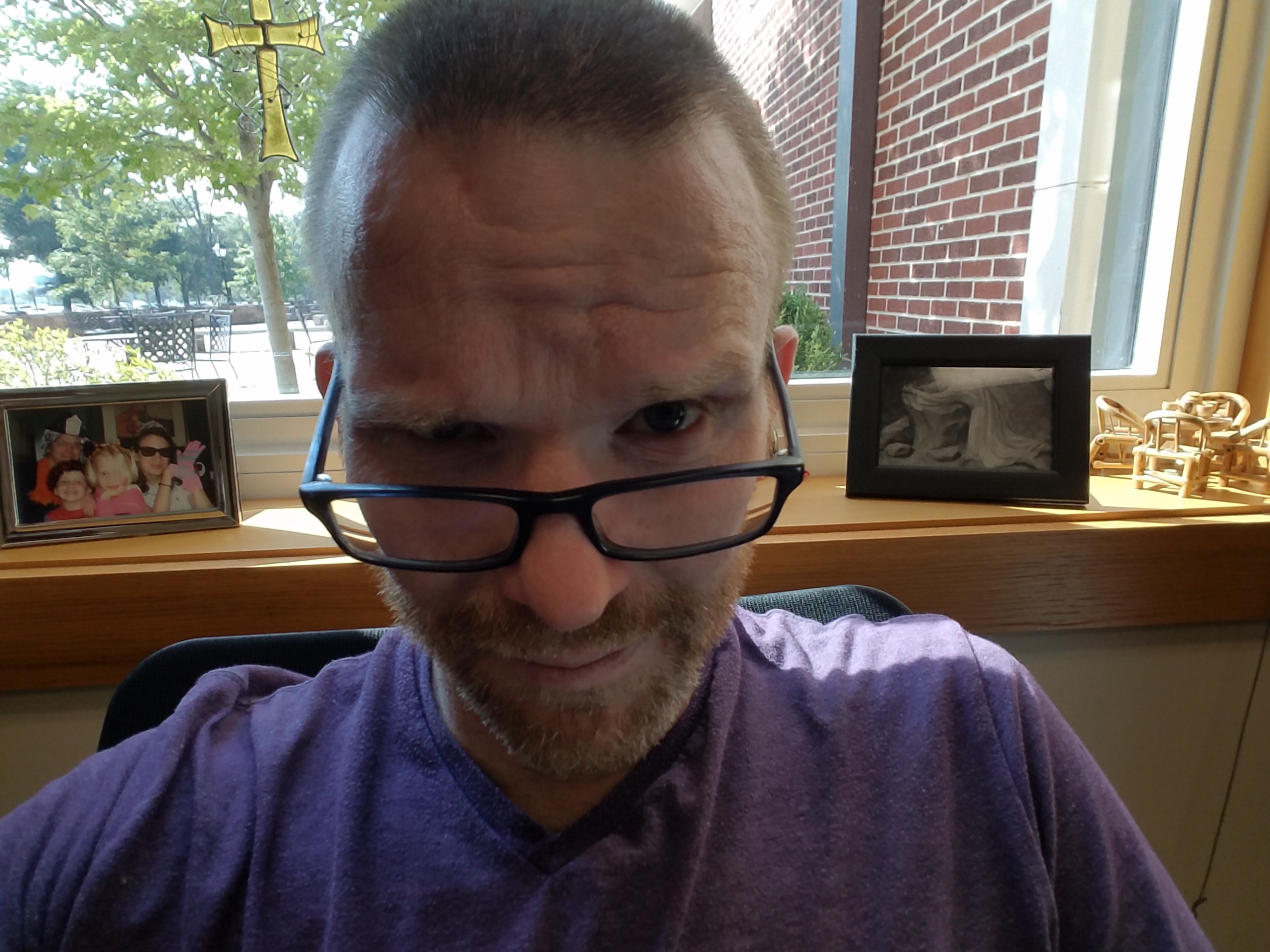
September 30, 2016
Theology in the Flesh Led by John Sanders
John Sanders’ Theology in the Flesh (August 2016, Fortress Press) breaks new ground for a contemporary generation. It shows how concepts important in Christian theology – God, truth, sin, salvation, and community, for example – do not drop from heaven but instead emerge from our bodily interactions with the world, as rendered into metaphors which guide thought, feeling, and action. Our minds are “embodied,” John explains, drawing insights from neurobiology, cognitive psychology, and cognitive linguistics. For those affixed to overly literal approaches to life, the book comes as a challenge; for those seeking a more flexible humble approach to Christian life, open to diversity and dialogue, the book comes as breath of very fresh air. Please join us for a reception in appreciation of John’s book and his work in the world.
.jpg)
September 23, 2016
The Hermeneutics of a Scientific Fact Led by Dr. Lawrence Schmidt
How objective are scientific facts? There seems to be a good amount of interpretation and coming to agreement (i.e. hermeneutic aspects) involved in establishing scientific facts. How does this impact scientific knowledge?

September 16, 2016
Civil Engagement in Communities of Discord: Obama’s Vision Led by Dr. Falls Corbitt
In his 2016 State of the Union Address, President Obama sets forth a vision of how we should engage one another across political, ideological, and social divides.
After showing a short clip from that speech, Dr. Falls-Corbitt will lead a discussion examining the model for civil but passionate civic engagement with which Obama challenges us.
September 9, 2016
Welcome! (to RaPC – Religion and Philosophy Commons)
Meet the Religion and Philosophy Commons (RaPC). It’s a home away from home where conversations erupt at the drop of a liberal arts idea, students study, imaginations are stirred, and the coffee is always free. We’re having an Introduction to the new location on September 9, featuring live music (by international students), a brief discussion of this year’s theme for Friday Afternoon Discussions – “Conversations in the Liberal Arts: Dialogue Across Differences” and food…don’t forget the food. Everyone is welcome! Come enjoy from 3:30 to 4:30. It’s a fandango!
April 22, 2016
(Religious?) Themes in the Poetry of Franz Wright Led by Dr. Fred Ablondi
Following a brief biography of the poet Franz Wright, the rest of the hour will be dedicated to a discussion of possible interpretations that those in attendance have of several of his poems (to be provided—no advance familiarity required!) from his Pulitzer-Prize winning collection Walking to Martha’s Vineyard. In particular, we will talk about the degree to which the poems we consider could be read as religious or spiritual in nature.
April 8, 2016
Moral accounting in Matthew: How metaphor guides reasoning in religion Led by guest speaker Dr. Eve Sweetser Professor of Linguistics University of California – Berkeley; Hosted by Dr. John Sanders
One way that many languages think of morality is in terms of accounting… If you do something good for me then I owe you in return. The Gospel of Matthew makes extensive use of this metaphor yet contains some intriguing twists on it that are counter cultural.
April 1, 2016
Empathy and Morality Presented by Dr. James Dow and the Teaching Empathy Group
Is empathy sufficient for morality? Think of empathy as feeling emotions that someone else feels, taking another person’s point of view, and yet maintaining a differentiation between another person and oneself. While empathy might seem to be enough to have compassion towards others, having empathy doesn’t seem to be enough for moral motivation. An empathetic torturer might have empathy and nevertheless use it to increase the pain and suffering of another person. Is empathy necessary for morality? We make moral judgments about things that do not seem to have emotions, for instance natural environments, nations, and our future selves. And we rely on other moral sentiments, for instance, anger, disgust, shame, and which are not based on empathy to make moral judgments. While psychopaths’ lack of empathy seems to account for a lack of moral development, they also seem to lack the moral sentiments generally. While some argue that there is strong positive correlation between empathy and pro-social motivations, either empathy is defined as empathic concern and so the finding is trivial or if it is defined as feeling anothers’ feelings, then the correlation is not as robust. So, should moral systems that promote empathy be encouraged? If empathy on occasion leads to preferential treatment, is prone to in-group biases, can be easily manipulated, and is highly selective, then maybe we should regard the cultivating of empathy with caution.
March 11, 2016
For Freedom and for Dignity - Women Biblical Interpreters Presented by Carol Newsom, Hosted by Dr. Robert Williamson
Few people today know the names of Isotta Nogarola, Moderata Fonte, Archangela Tarabotti, and Amelia Lanyer, but in the 15th and 16th centuries they were among the first women to write books in defense of the equal dignity of women and to argue for their freedom to determine their own lives. Given the importance of the Bible in European culture, they often made their arguments through fascinating reinterpretations of the figures of Eve and Adam. Rediscovering their lives and their ways of interpreting the biblical narratives opens up a forgotten chapter both in biblical interpretation and in the history of women's struggles for freedom and respect. - Dr. Carol Newsom of Emory
March 4, 2016
A Modern Pilgrimage on Meditative Practices: A Reflection on our Odyssey Trip to the United Kingdom & Taizé, France Presented by Melissa Rooney and Liz Forester
During the summer of 2015, Melissa and Liz traveled to Lindisfarne, United Kingdom and Taize, France to explore different Christian meditative practices associated with the Celtic tradition and Taize community. We participated in weeklong retreats at both places, meeting and learning from people from all over the world.
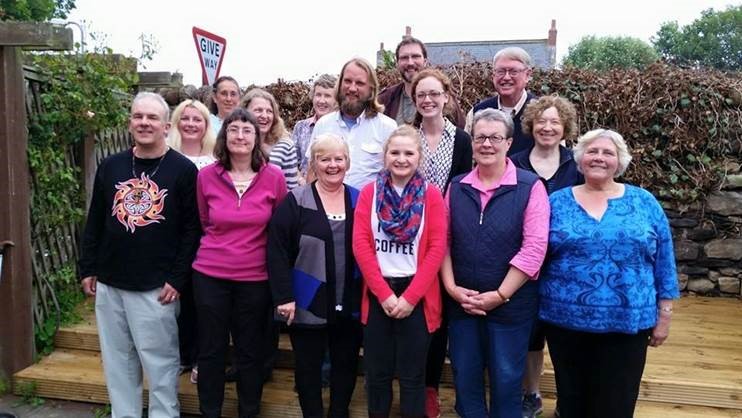
February 26, 2016
Why We Need Monsters Presented by Dr. Bill Tsutsui
“If there is one thing that Godzilla teaches us…it is how much we all need monsters. We need them for the joy of being frightened, for that thrilling rush of adrenaline that only a creature can bring…… Monsters in other words let us truly live and let us understand what it is to be human. We should not become too cynical, too wise, too mature, too sophisticated for monsters. They are companions we all can use in navigating the complexities and uncertainties of life and a world in constant flux.” Dr. Bill Tsutsui
February 19, 2016
Lamentations & Black Lives Matter Presented by Dr. Robert Williamson
In Ferguson, Baltimore, and elsewhere, Black Lives Matter protestors met with criticism for expressing anger over the devaluation of Black life in America. In particular, some Christians appealed to the biblical principles of love and forgiveness in order to silence the anger of the protestors. This talk will explore the book of Lamentations as an alternative biblical model for communities facing violence and dehumanization—one which centers anger and protest as a faithful and necessary response.
February 12, 2016
Music as Resistance; Facilitated by Dr. Jay McDaniel and Led by Tonya Hale – LGBTQ Indie and Ty Glanville – Hip Hop
Ethnomusicologists understand some forms of popular music as forms of resistance to conventional norms and repressive conditions. With help from Ty Glanville, Tonya Hale, and James Dow we will be reflecting on ways in which hip-hop, punk, and indie oriented LGBTQ musics do this with regard to race, class, and gender. Come join the discussion and share your impressions. Open to all.
February 5, 2016
Moving Toward Effective Allyship in Social Justice Work Presented by Dr. Leslie Zorwick
Many communities want to become more open and inclusive, while privileged individuals sometimes struggle with the roles they can and should play in the work of inclusion. So, what does it mean to be an ally? How can we become better listeners to perspectives other than our own? And, what role should we all play in addressing intolerance?
January 29, 2016
What is Ecotheology? Presented by Dr. Jay McDaniel
How can religious people serve the common good of the world? How can they help build communities that are creative, compassionate, ecologically wise, and spiritually satisfying, with no one left behind? How can their spirituality nourished, not simply by great ideas enunciated in books, but by the palpable presence of rocks and trees, hills and rivers, animals and stars? These are the concerns of eco-theologians around the world of different religious persuasions: Christian, Jewish, Muslim, and Buddhist. This Friday Afternoon Discussion provides an opportunity to learn about eco-theology and discuss it among peers.
December 4, 2015
Contextual Bible Study...Little Rock Presented by Dr. Robert Williamson and Contextual Bible Study Student Group
This summer, a group of students travelled to South Africa to learn about contextual Bible study: a Bible-reading methodology that facilitates discussion and ownership of the texts. The students then took this method of study to Mercy Church, a church for those experiencing homelessness in Little Rock. Join them Friday as they reflect on their time at Mercy Church and the influence contextual Bible study has had on community consciousness.
November 13, 2015
Interfaith Dialogue and Fostering of Religious Community at Hendrix Presented by Latanya Lane, Hosted by Desh Depak and J.J. Whitney
LaTanya Lane is a graduate of Chicago Theological Seminary, she works as the Mission Delivery Associate for IFYC - Interfaith Youth Core. Ms. Lane has years of community organizing experience on Chicago’s South Side, supporting communities from different religious and non-religious backgrounds as they came together to improve their neighborhoods. She uses her experience as a community organizer, along with her involvement with non-profits, in her work at IFYC. Ms. Lane builds collaborative relationships between IFYC campus partners and engages these partners in meaningful conversations about the ways they are working to make interfaith cooperation a social norm on their campuses. During the discussion LaTanya Lane will talk about fostering climate religious acceptance and expression of religious identity.
November 6, 2015
The Galactic Citizen Presented by Dr. Lars Seme and Dr. Gabby Vidal-Torreira
Using science fiction novels, short stories and television episodes to explore issues affecting humanity - and even what it means to be human. How does the advancement of technology affect who we are? How can we determine what is and is not plausible scientific advancement? How does a writer whose characters are pointed-eared aliens use space battles and lasers to tell a story about racism? What literary and cinematographic techniques do authors use to write Sci-Fi? Join us Friday with Professor Lars Seme and Professor Gabby Vidal-Torreira who teach this Engaged Citizen course.
October 30, 2015
A God Beyond Being? Presented by Dr. John Sanders and Dr. Fred Ablondi
If God is the greatest possible thing, does it mean that God is greater than, or beyond, Being? If so, is there anything we can say about God? If not, does that mean Being is superior to God? If God is not beyond Being does this imply that God is limited (like creatures)? Drs. Sanders and Ablondi will discuss why some philosophers and theologians have placed God ‘beyond being,’ as well as some of the objections to making this move.
October 23, 2015
Community and Anarchy: A Discussion on Utopia Presented by Laela Zaidi and David Tate
A discussion of our visit to Twin Oaks, an intentional egalitarian community in rural Virginia. -Egalitarian communities are planned residential cooperatives that embrace radical feminism,common ownership of property, and environmental stewardship. Join Laela Zaidi and David Tate for a discussion over their summer living as members of Twin Oaks community in Louisa, Virginia. Laela and David will briefly share some information about the ways in which members of Twin Oaks approach gender, government, education, cultural identity and sustainability, but most of the hour will be devoted to Q+A. Come with questions!
October 9, 2015
Religion, Nation, & Violence - Asia; Presented by Dr. Bill Gorvine and Dr. Michael Sprunger
Suicidal monks? Christian assassins? Patriots? Traitors? Using examples from recent Tibetan and Korean history, this course examines the relationship between identity (how we identify ourselves and are identified by others) and various forms of political and social action. It encourages students to consider what it means to be part of religious, national, ethnic, and other types of communities, how such communities form and change over time, and what actions are appropriate and justifiable in their names.
October 2, 2015
Is Faith an Intellectual Virtue? Presented by Dr. James Dow
Is the holding of beliefs based on religious faith consistent with being an intellectually virtuous thinker? Does being an intellectually virtuous thinker require aiming at justified true beliefs grounded in public evidence? Is faith based on private evidence or public evidence? Suppose intellectual virtue is a personal-level excellence of intellect. Is believing on faith a reliable belief-forming route, for instance like logical deduction, perception, or the scientific method? Is believing on faith responsible believing, namely is it conscientious believing or careful believing? If faith is a practical commitment that is independent of belief or evidence, then is it unrelated to the cultivation of intellectual virtues? Is there a distinction between intellectual virtue and practical virtue such that one may hope or act on a hope based on faith?
September 25, 2015
Art & Spirit Presented by Dr. Jay McDaniel and Dr. Danny Grace
“How might listening to jazz help a person’s soul grow bigger and enrich her capacities to heal a broken world? Ask the participants in Art and Spirit, an Engaged Citizen course. The class focuses on how the creative and performing arts can enhance a person’s capacities for open-mindedness and open-heartedness, thereby becoming a fatter soul; and motivate him or her to build communities that are socially just and ecologically sustainable, with no one left behind. Come to the Friday Afternoon Discussion, meet the two people who teach the course, Danny Grace and Jay McDaniel. Listen to a little John Coltrane and take “the spirituality quiz.” Don’t worry; you’ll do fine.” - Dr. Jay McDaniel
September 18, 2015
Collective Self-Awareness: Can we be aware of us? Presented by Dr. James Dow
Dr. James Dow has just returned from the Collective Self Awareness conference in Vienna, Austria. He will pose the question: Is there such a thing as collective self-awareness? The discussion will include questions from the conference, as well. Such as - Do insights and theories about 1st person singular self-awareness straightforwardly translate to the 1st person plural, or does the 1st person plural need to be treated in an essentially different way? Are there 1st person plural non-conceptual, pre-reflective forms of self-awareness as has been suggested for the singular case? Do we need different accounts of self-awareness for different groups, or can a uniform account be given? What is the nature of the collective selves that we are aware of?
September 4, 2015
Contextual Bible Study: South Africa...the Beginning Presented by Dr. Robert Williamson and Contextual Bible Study Student Group